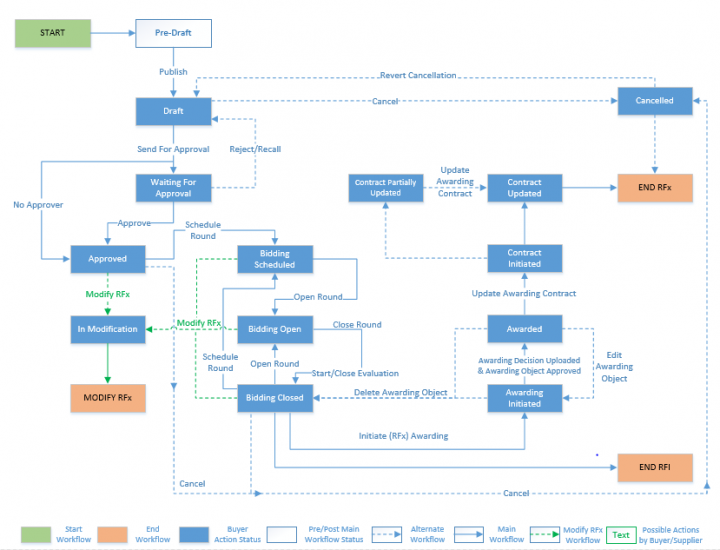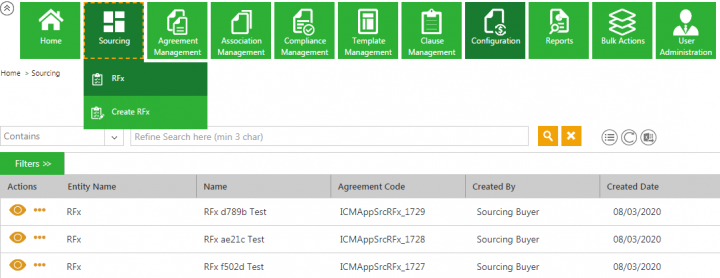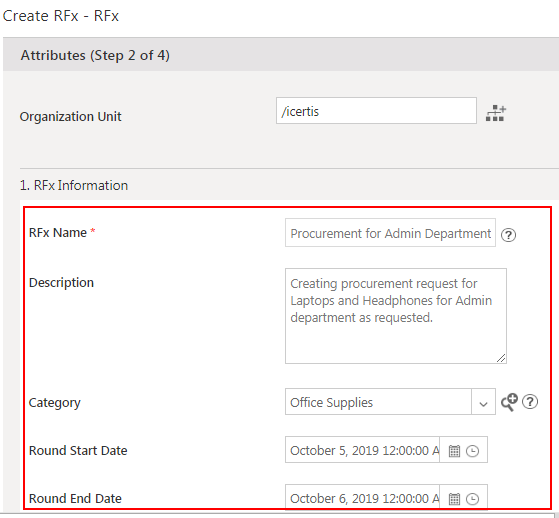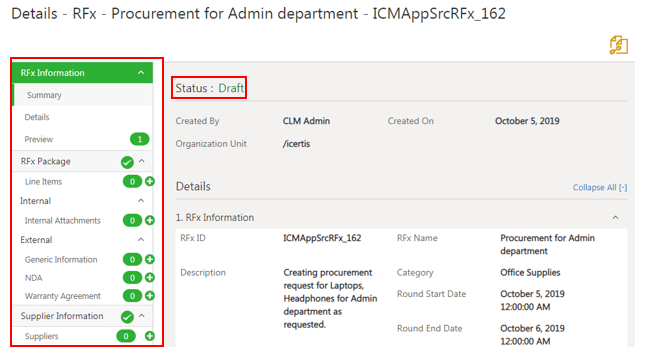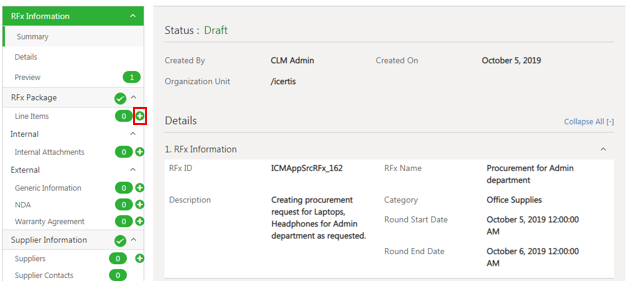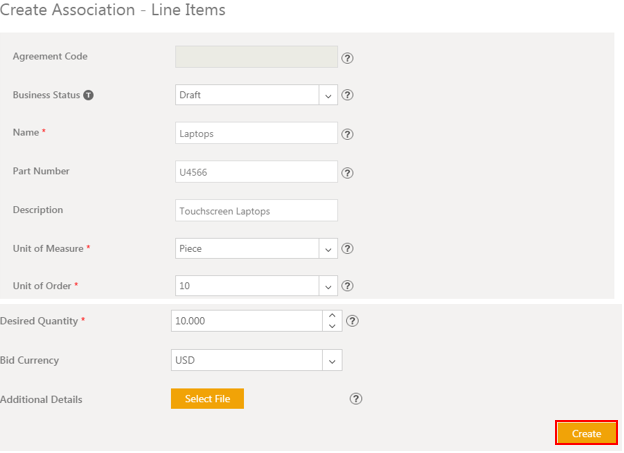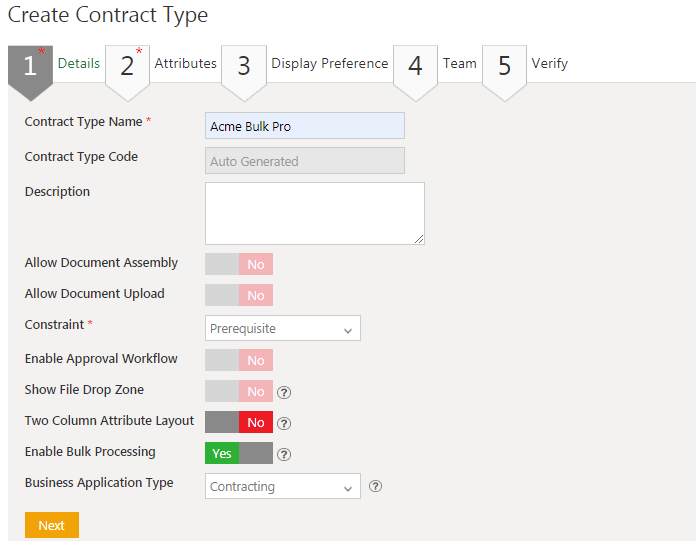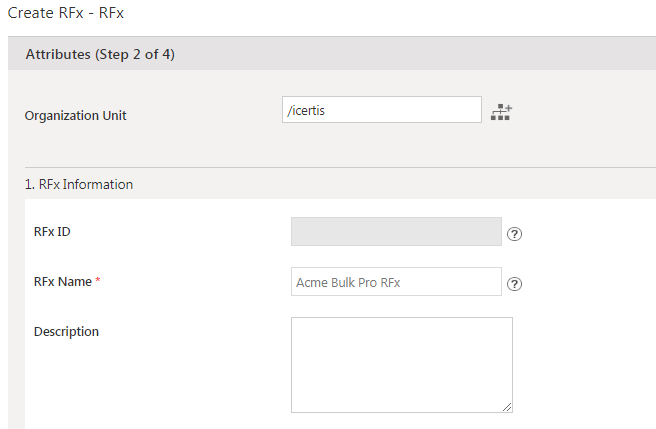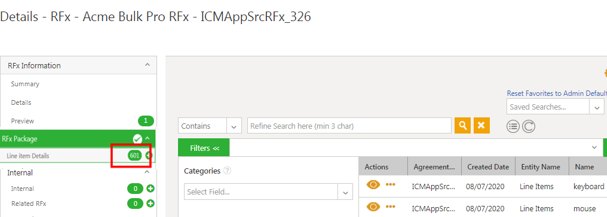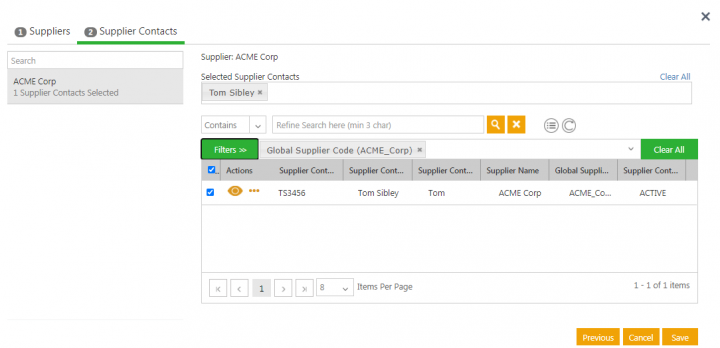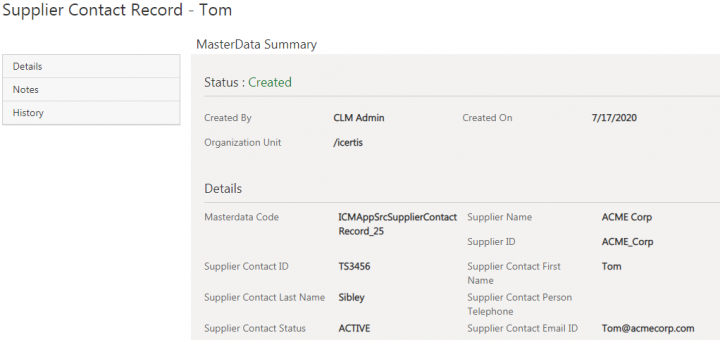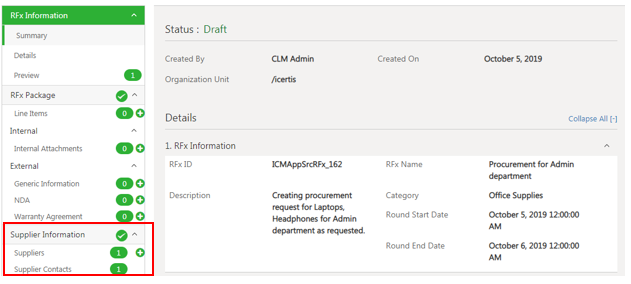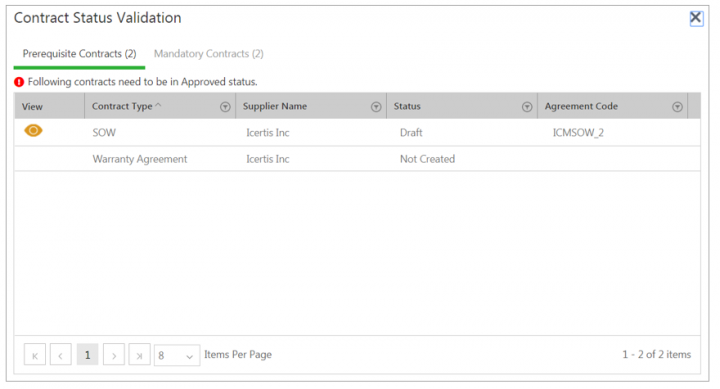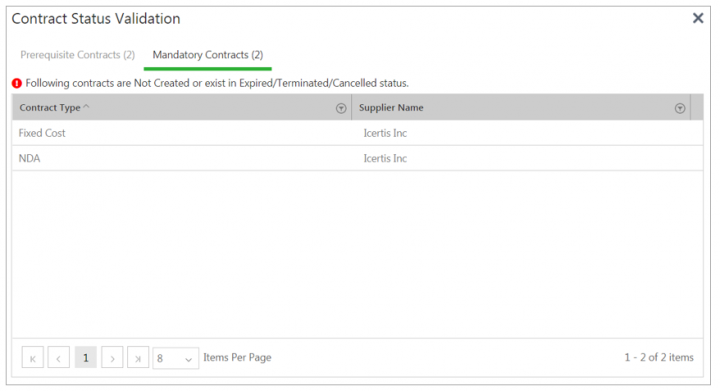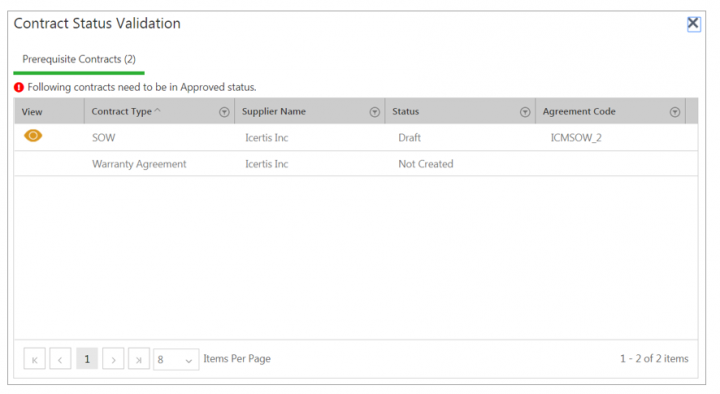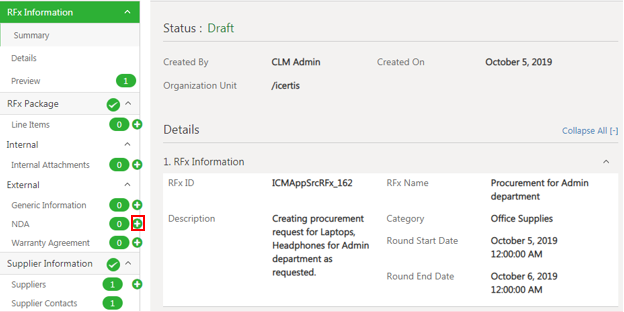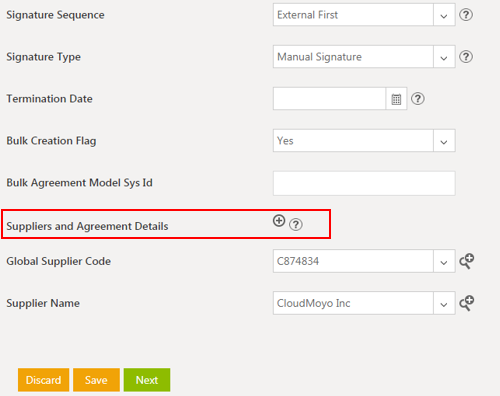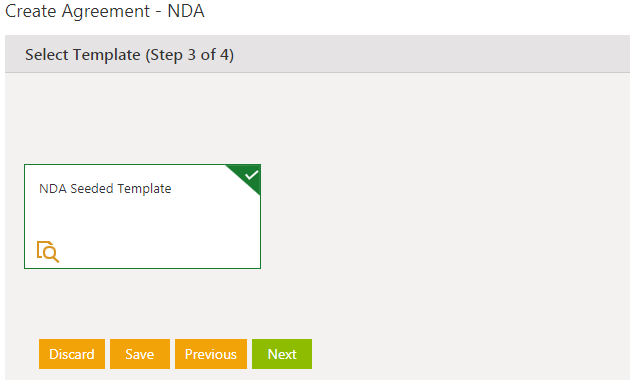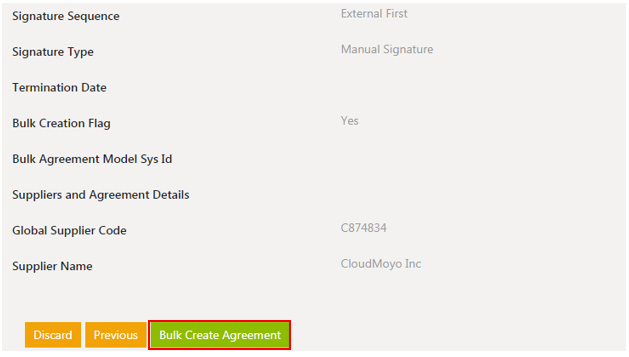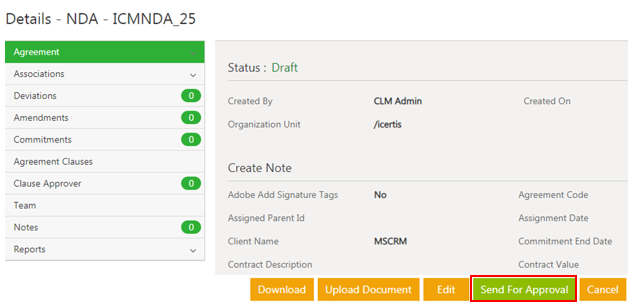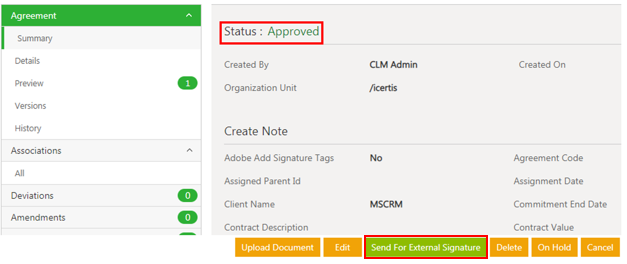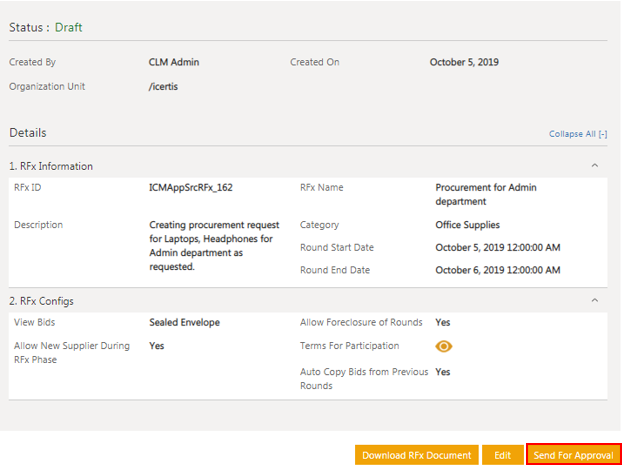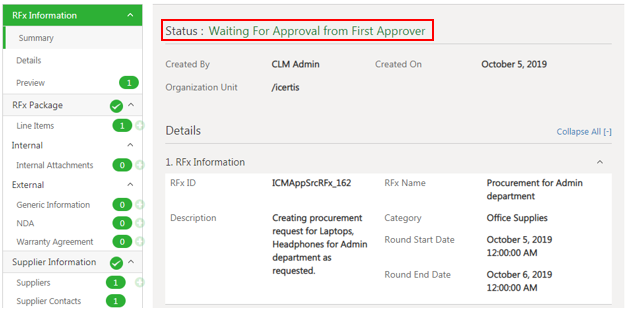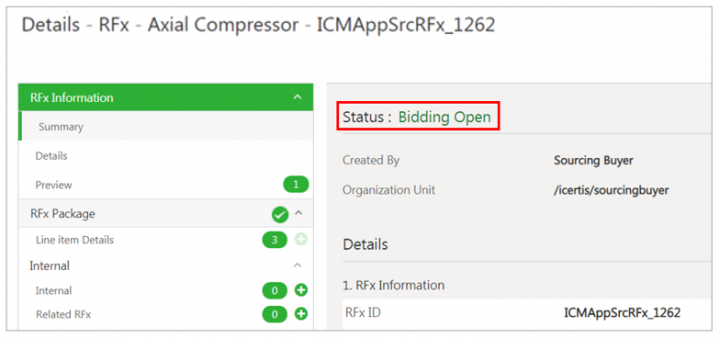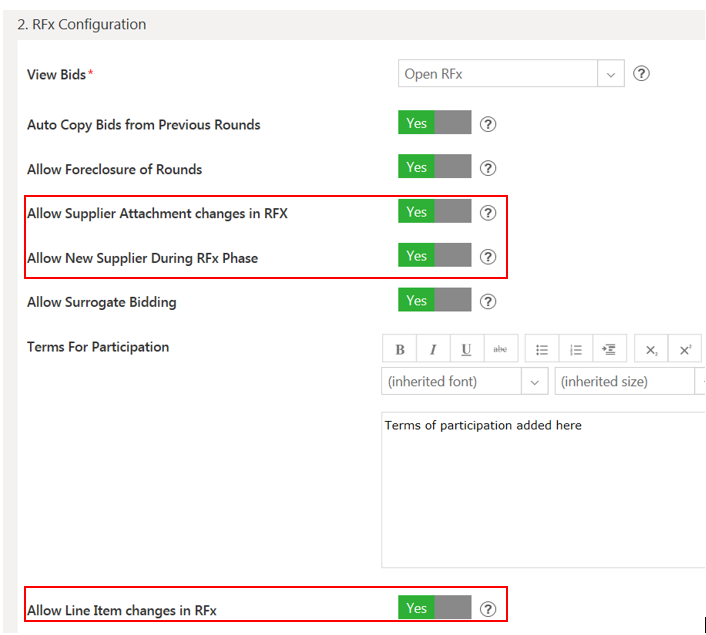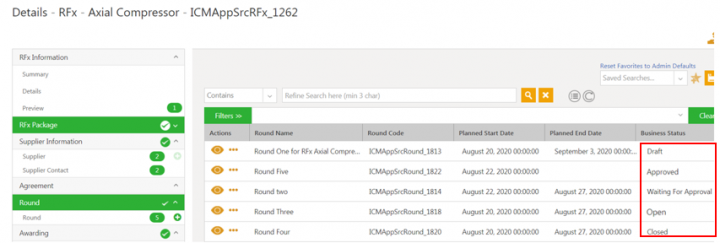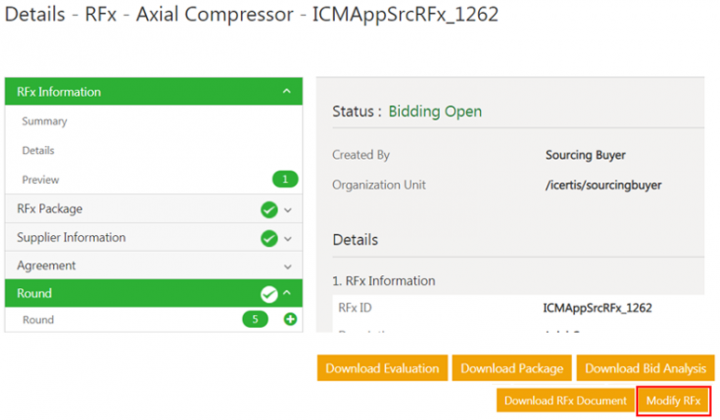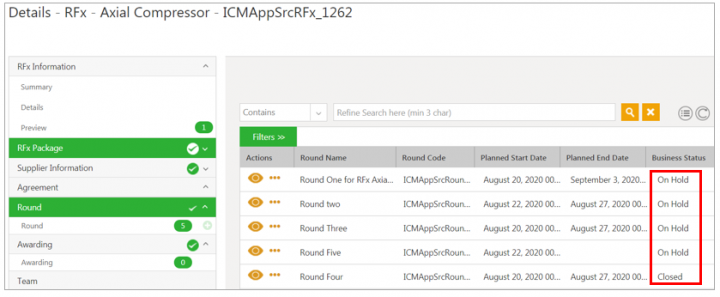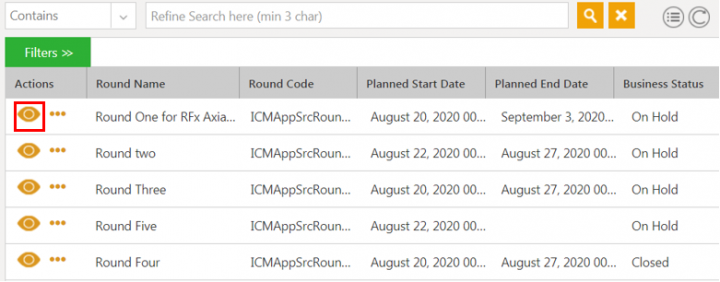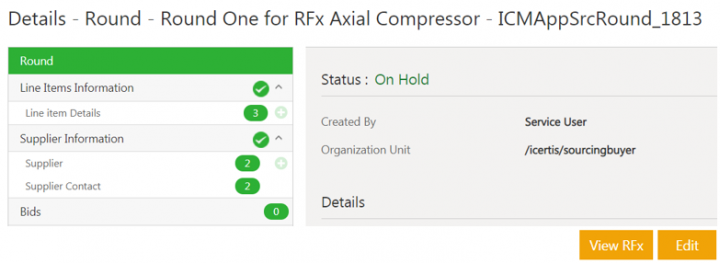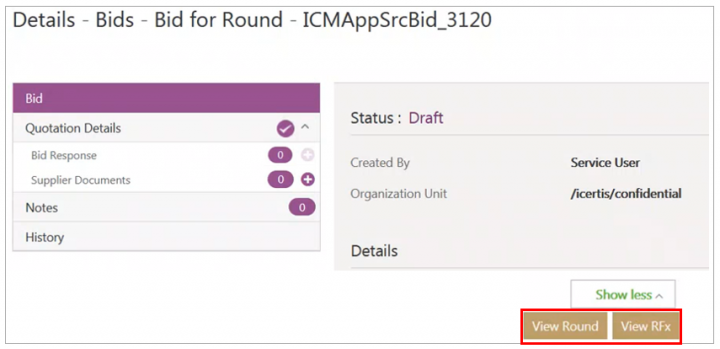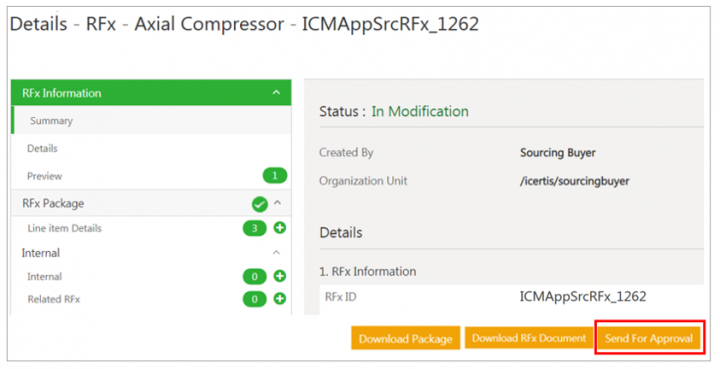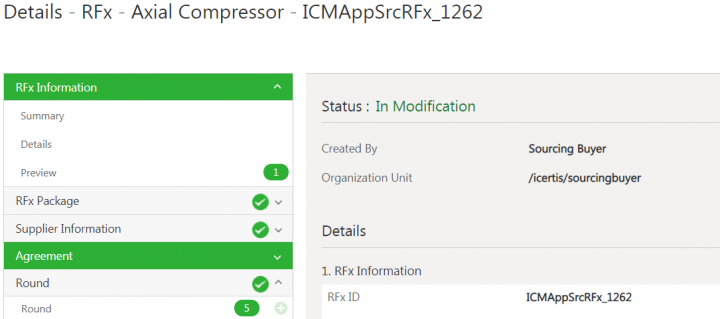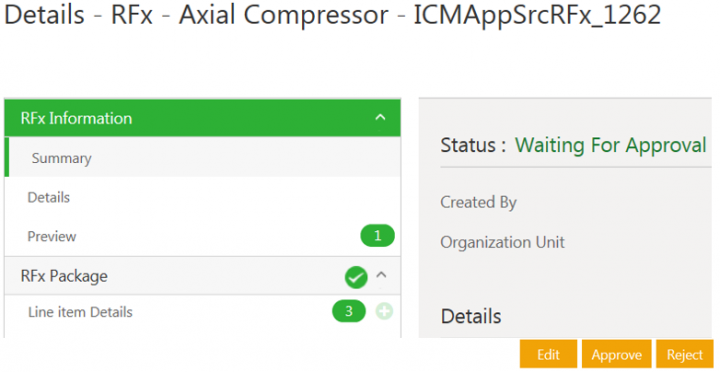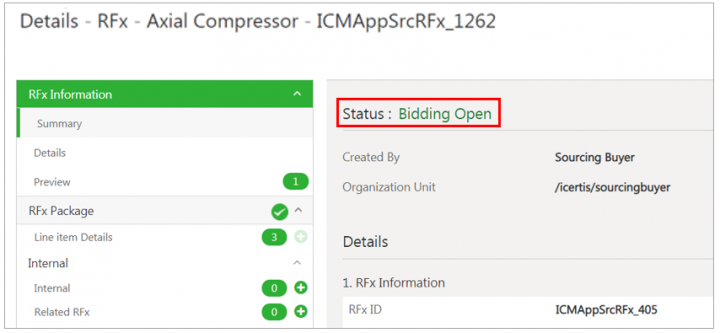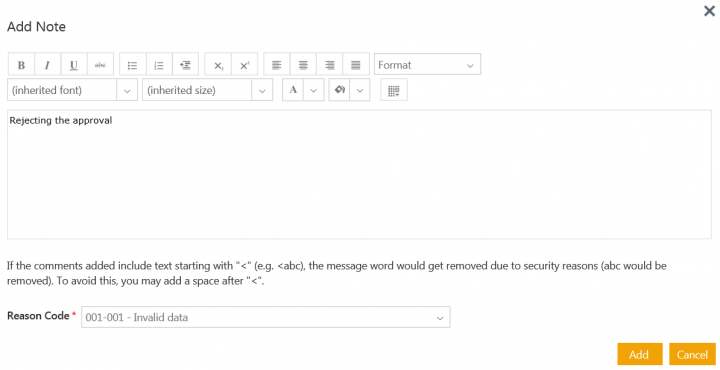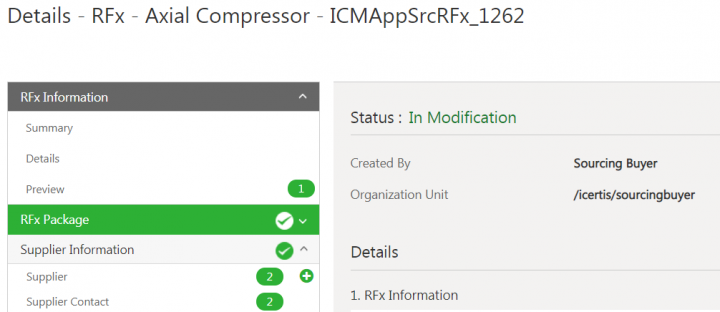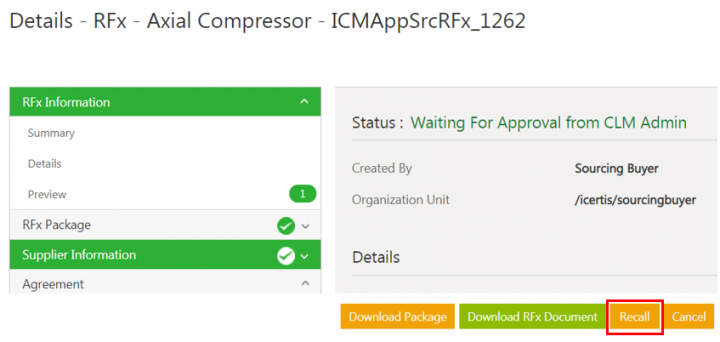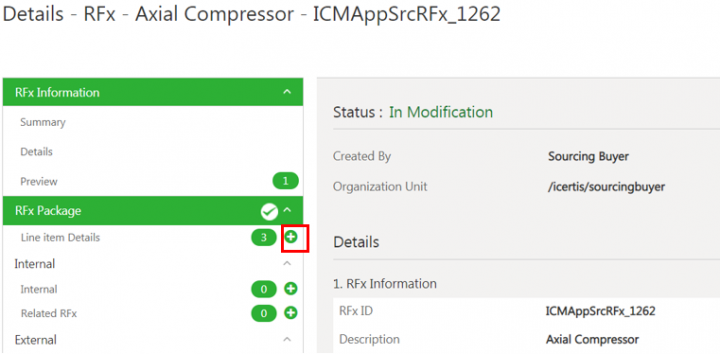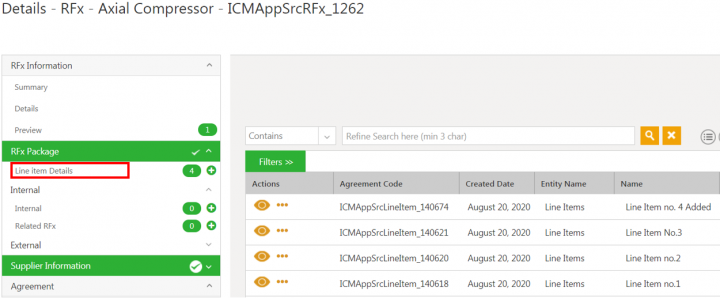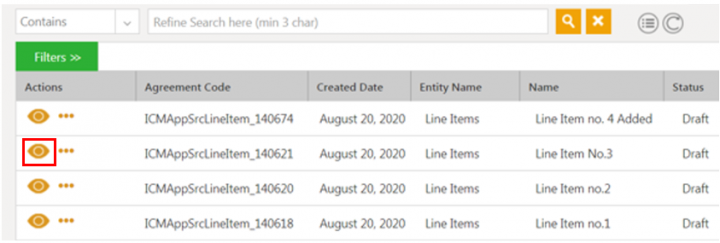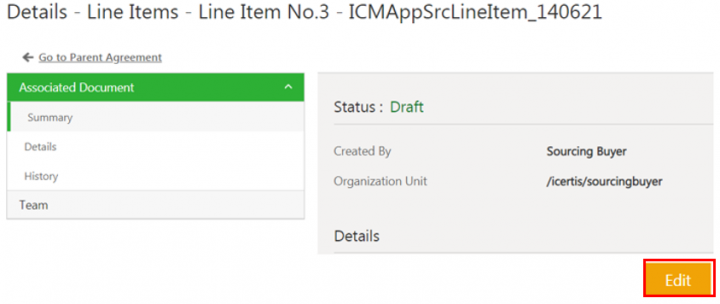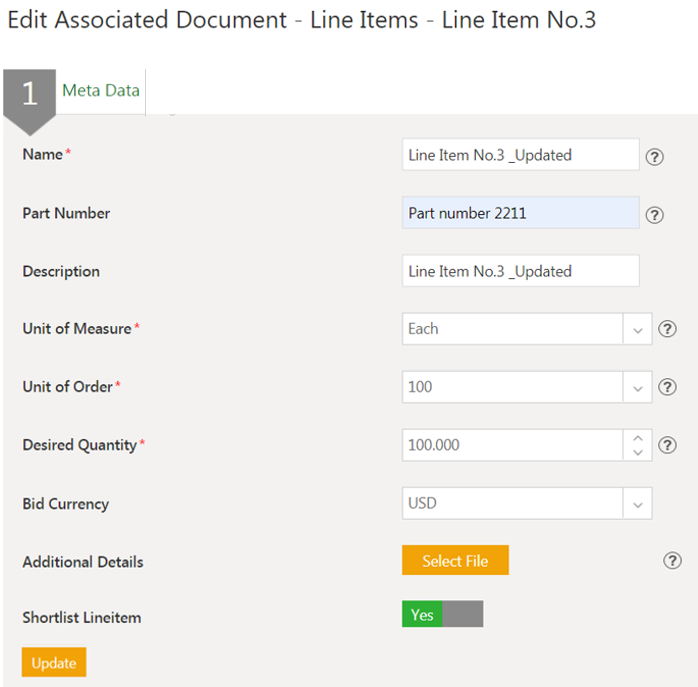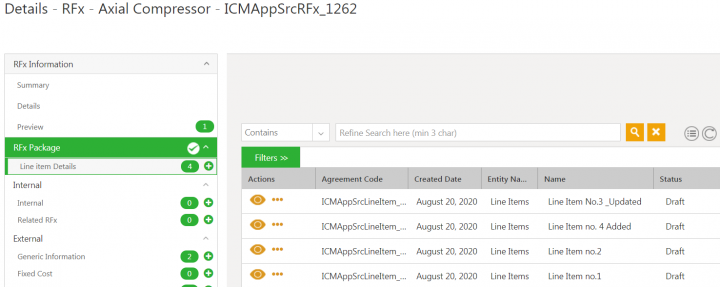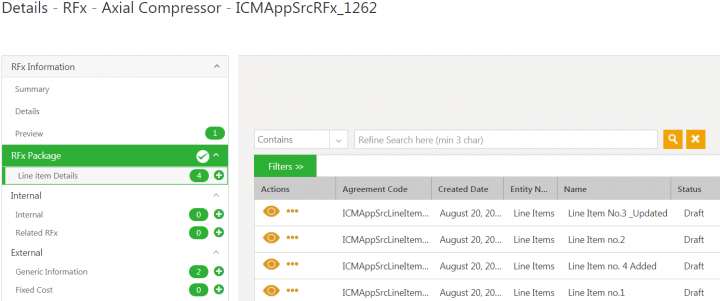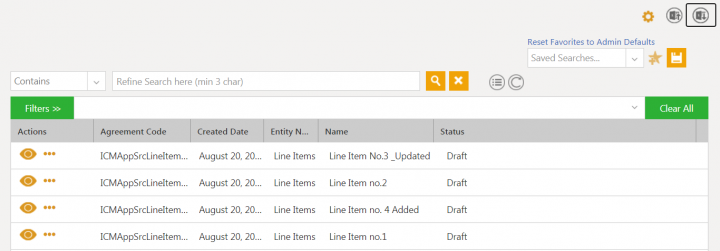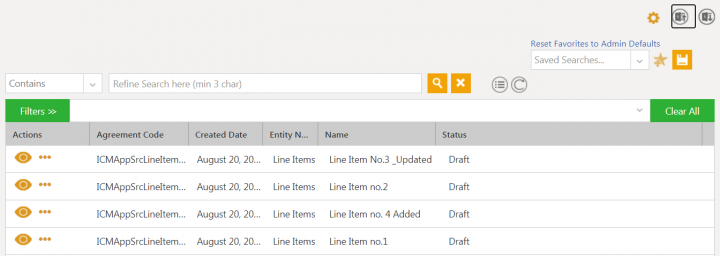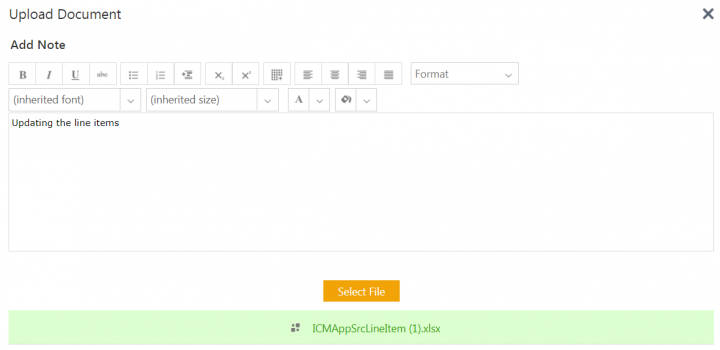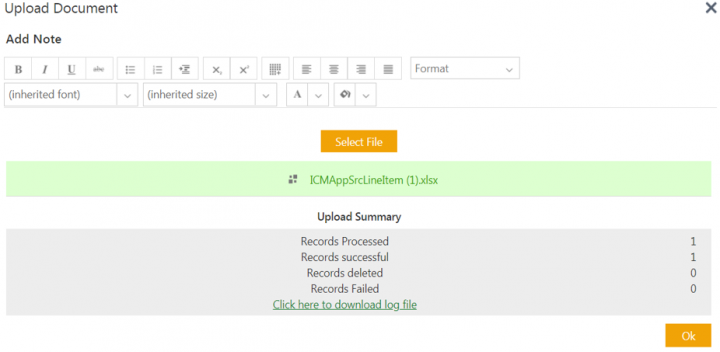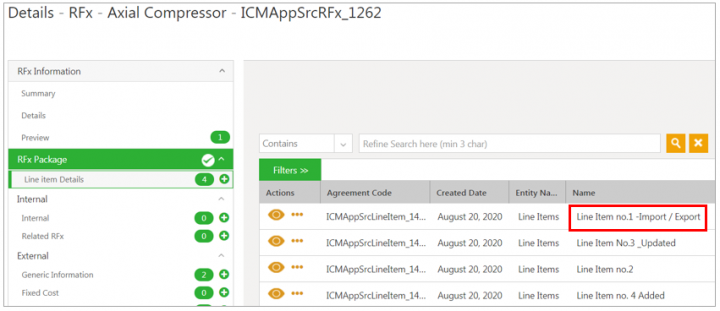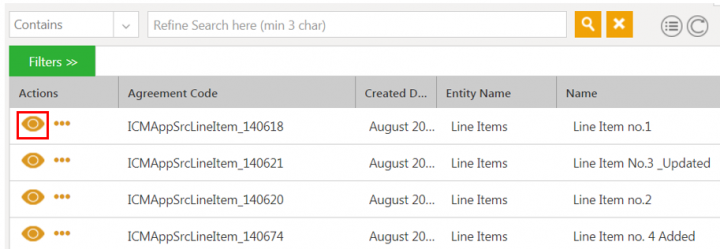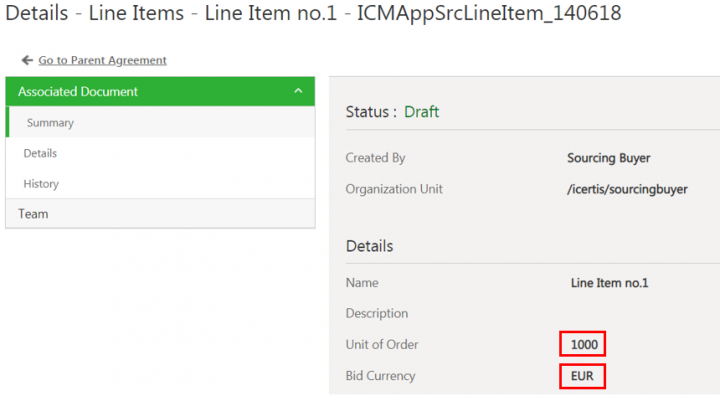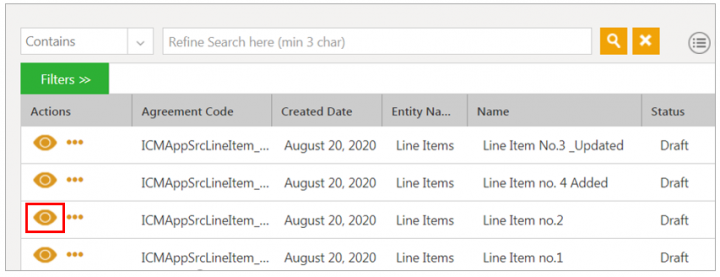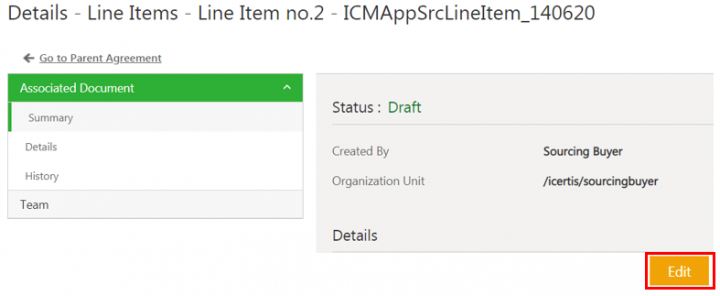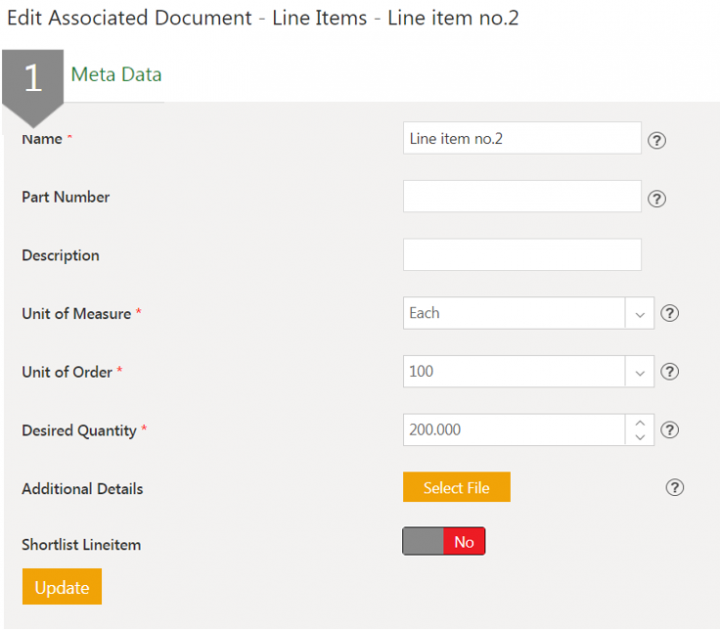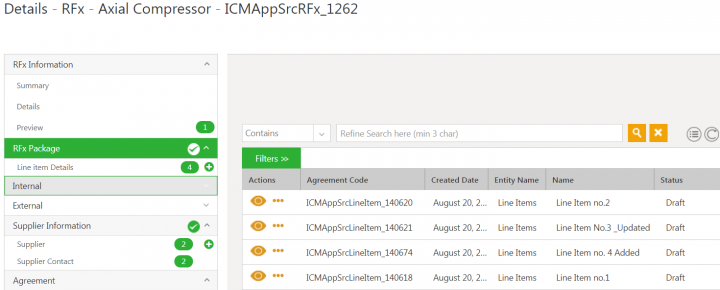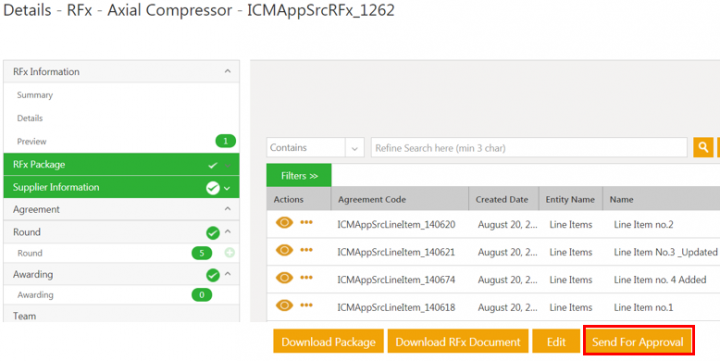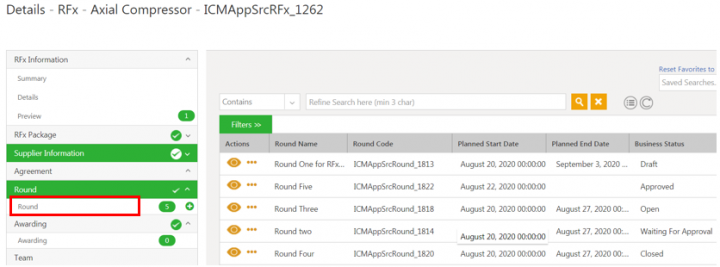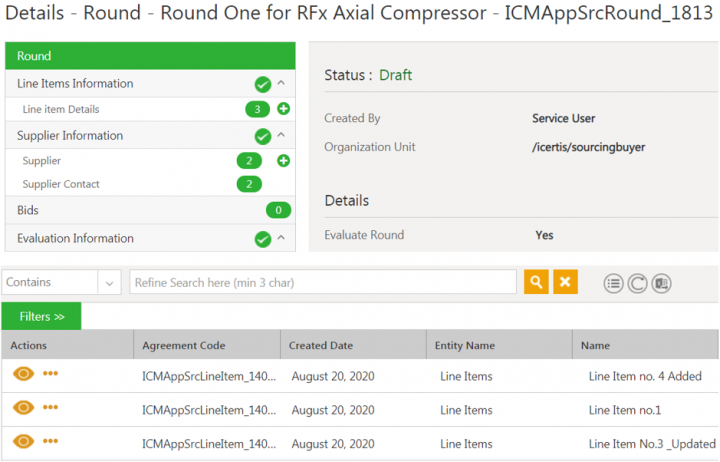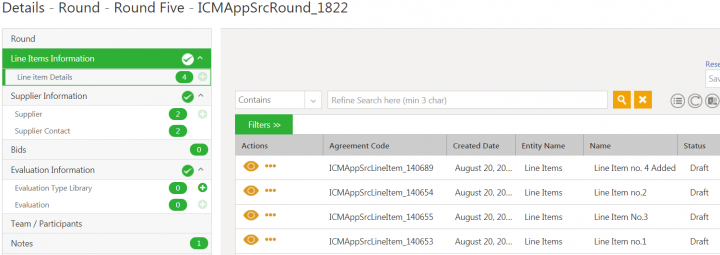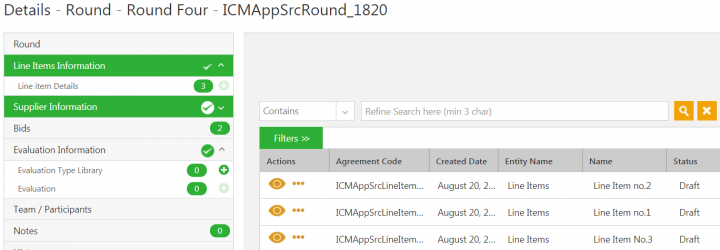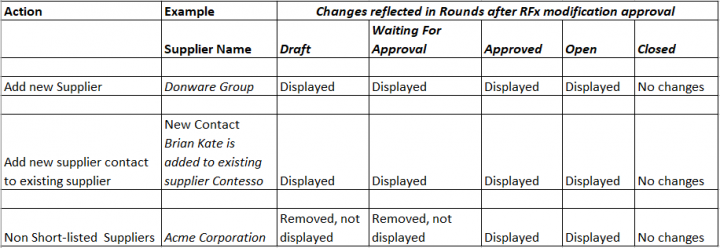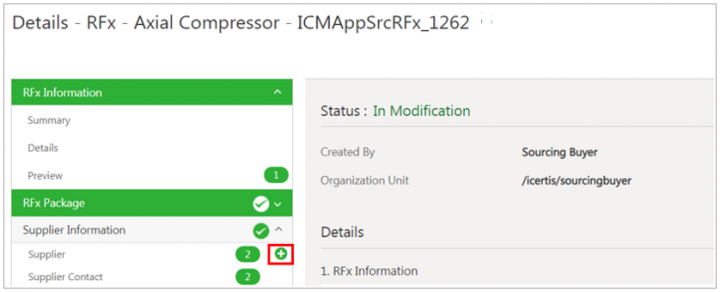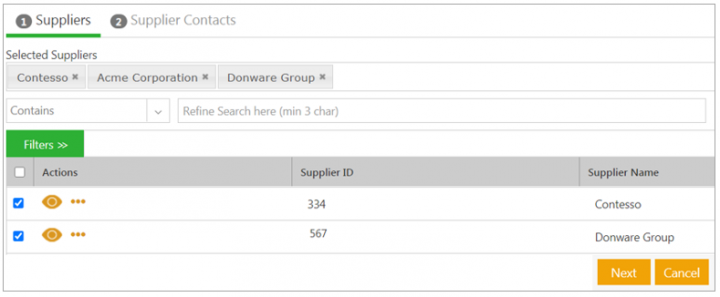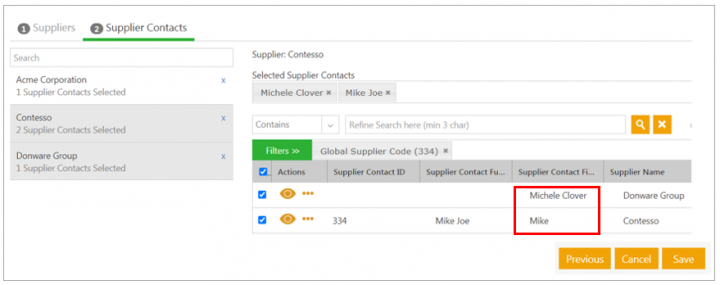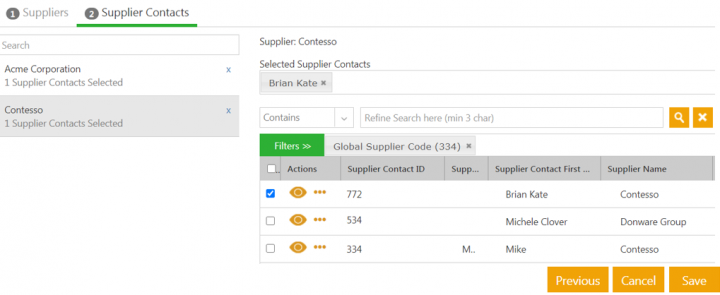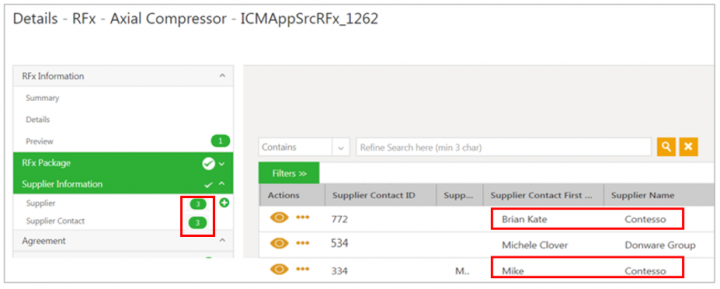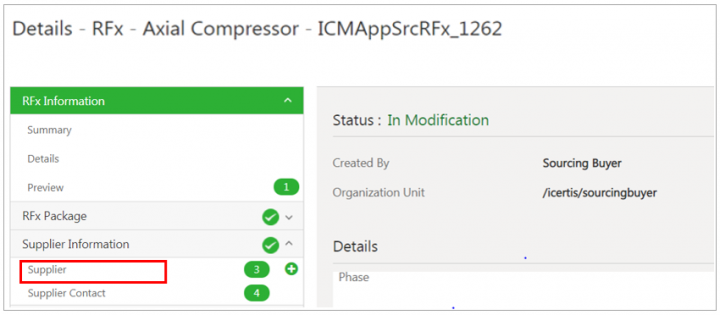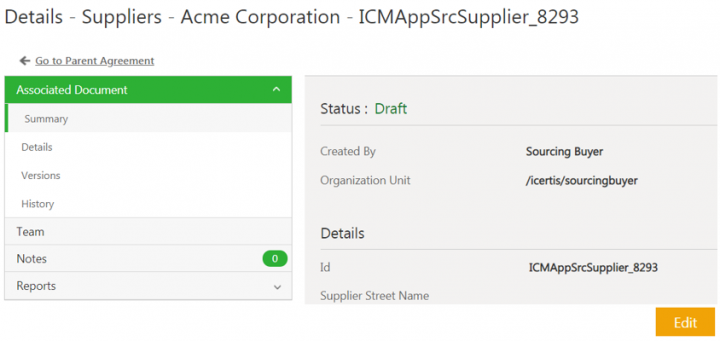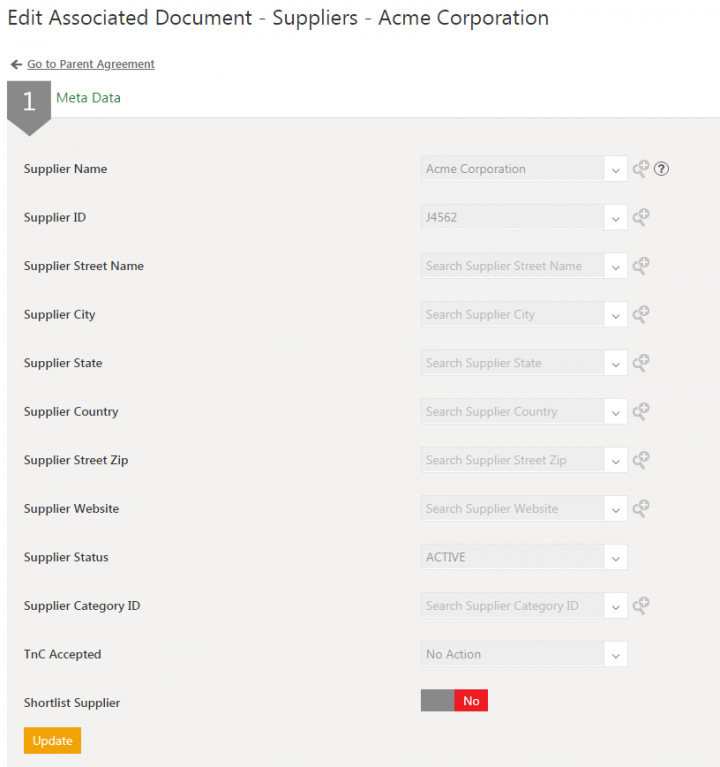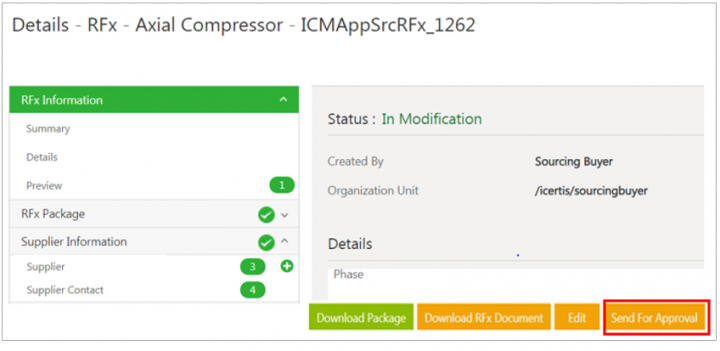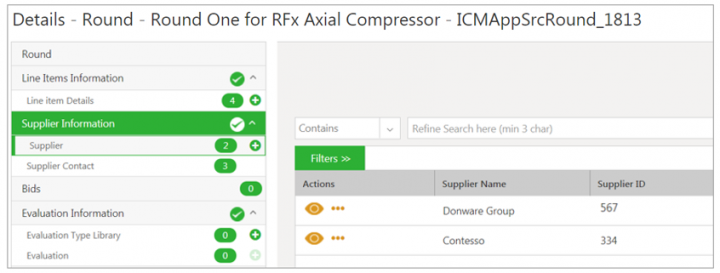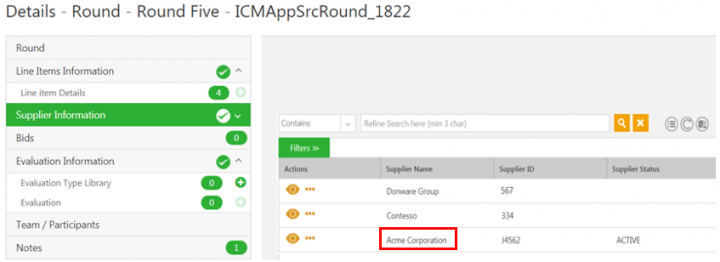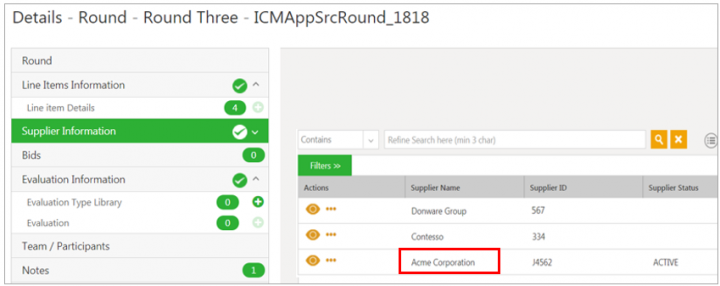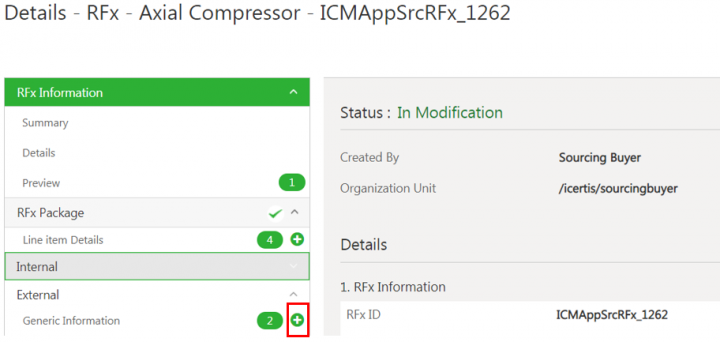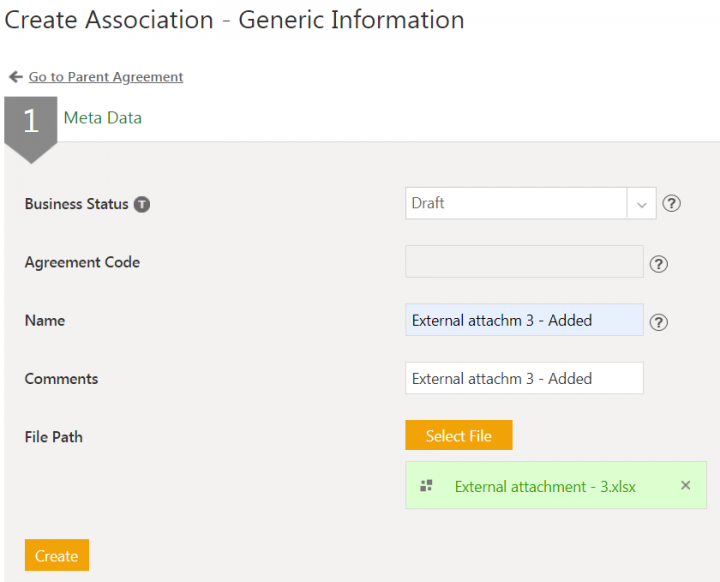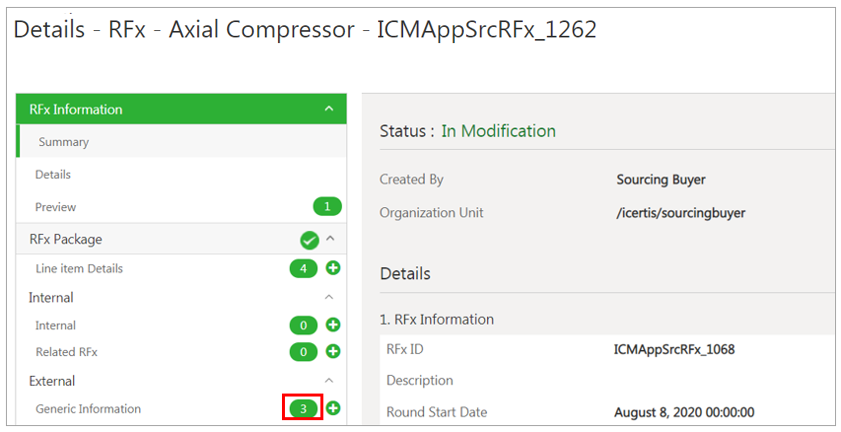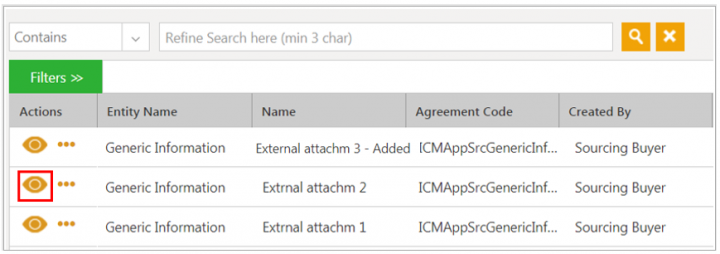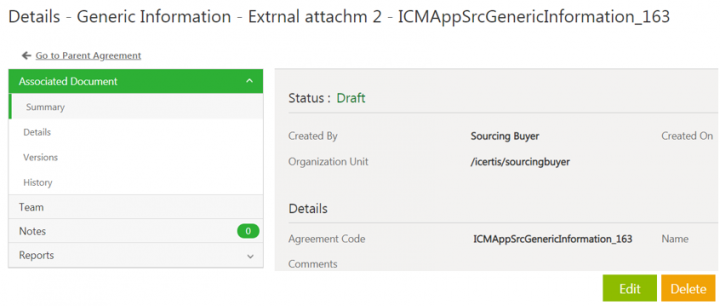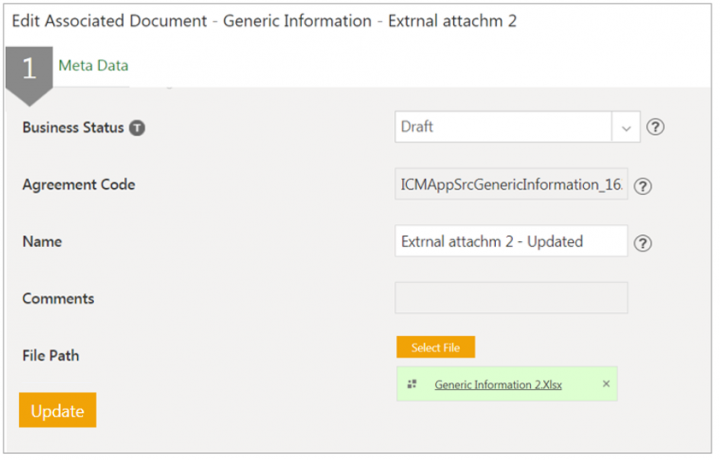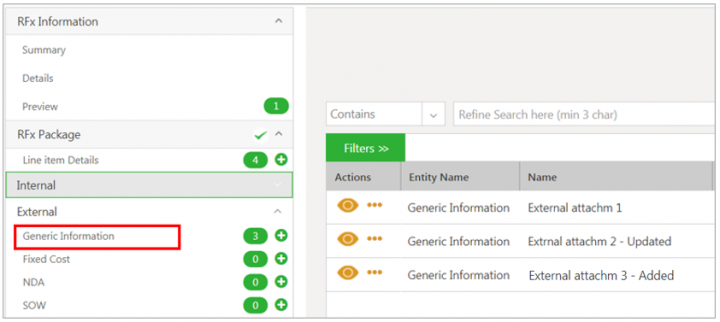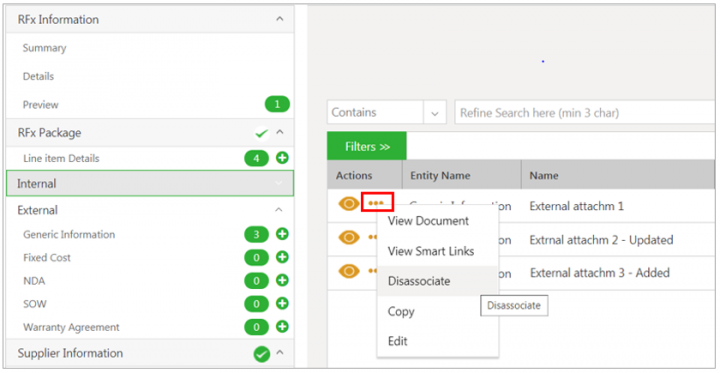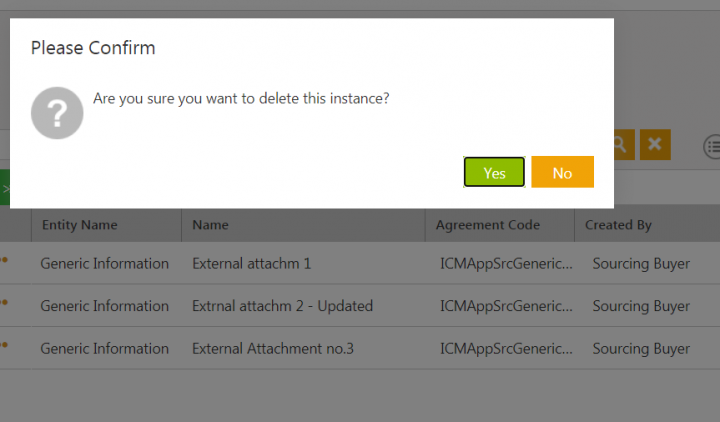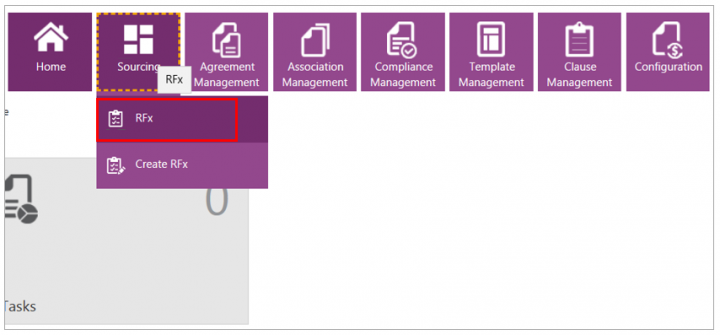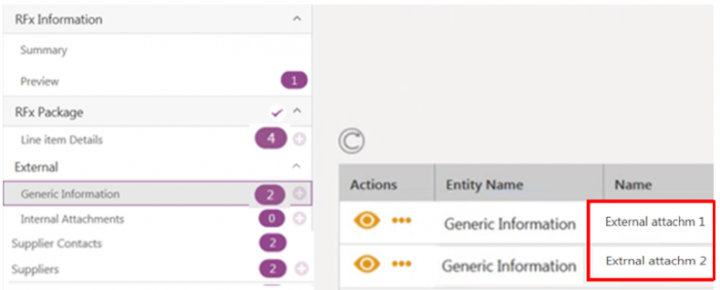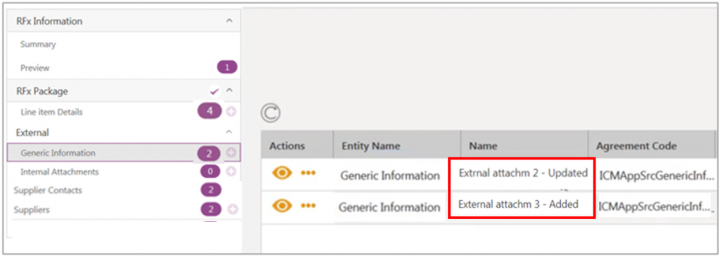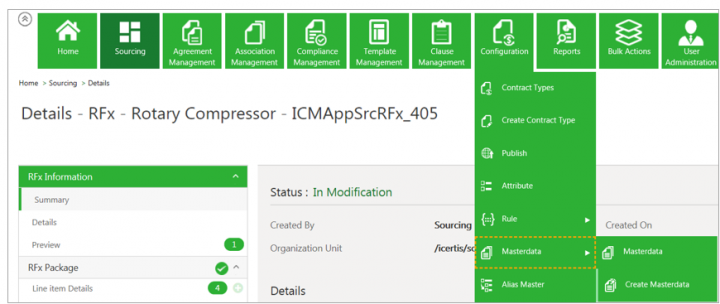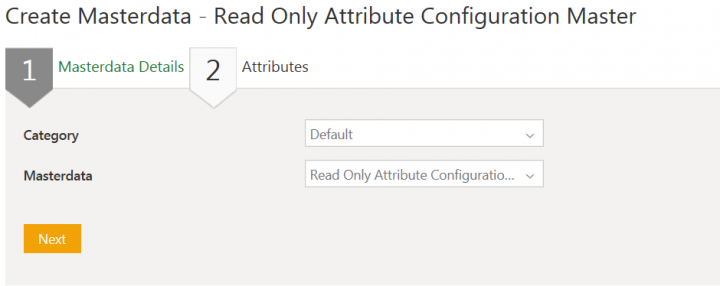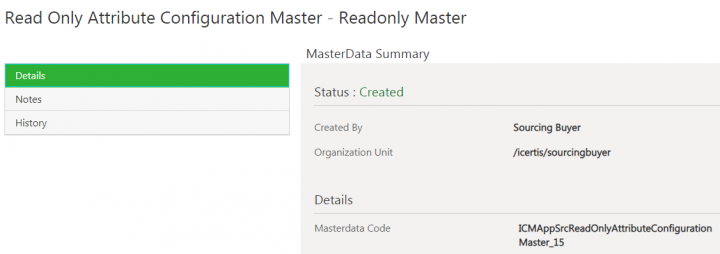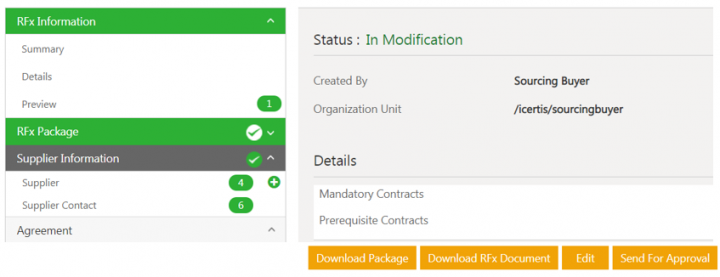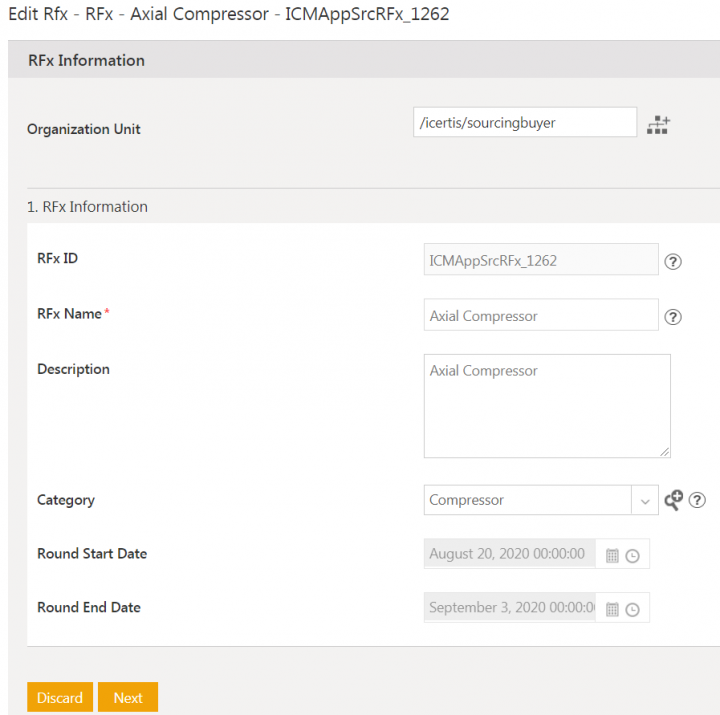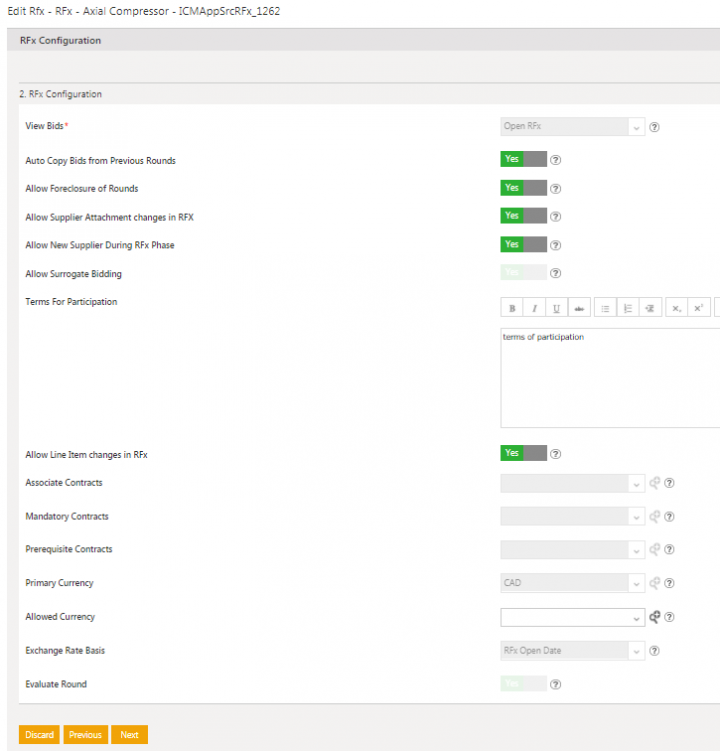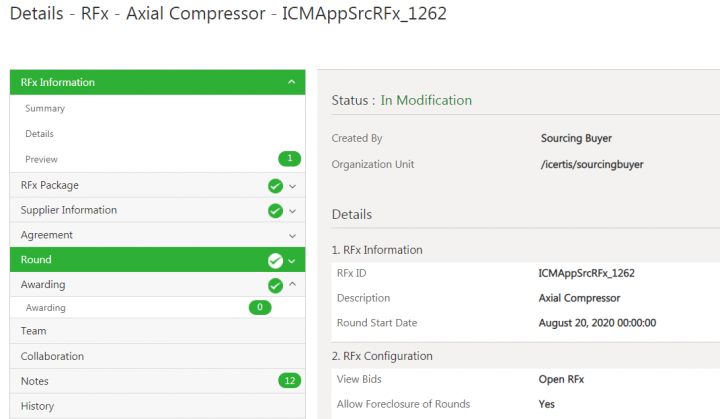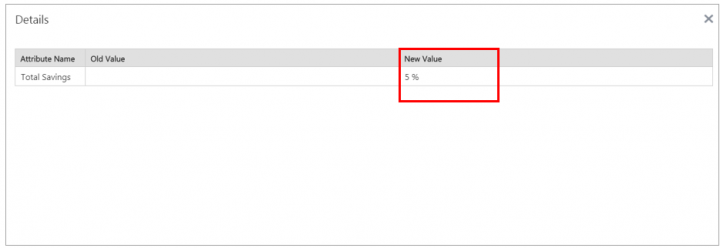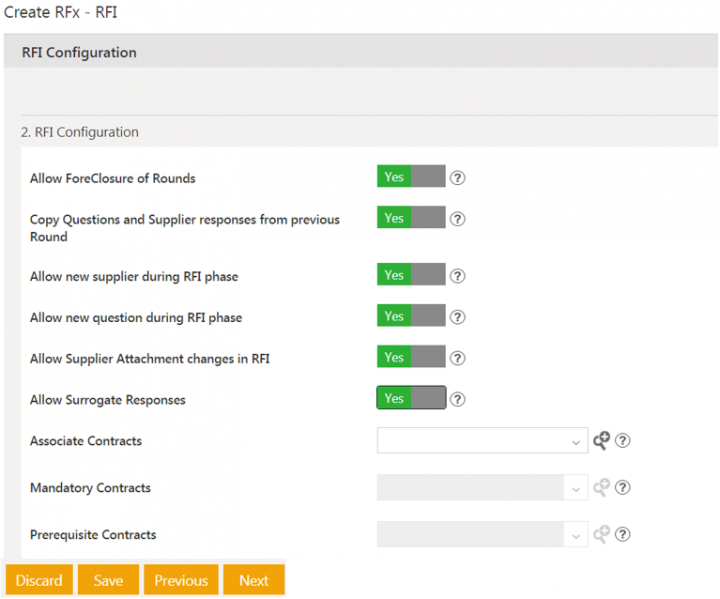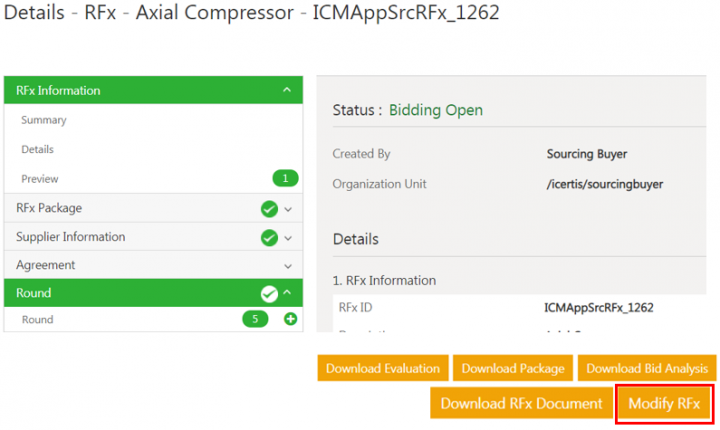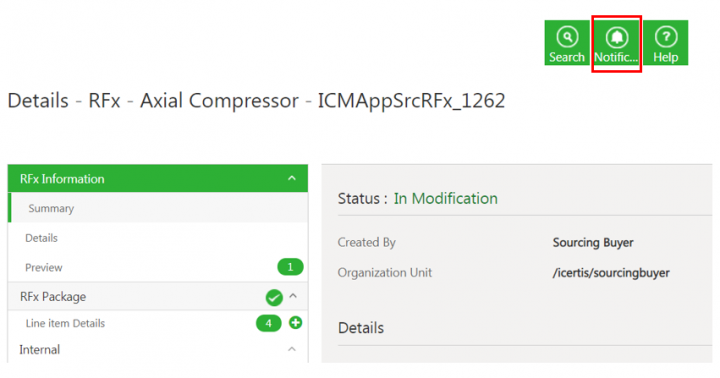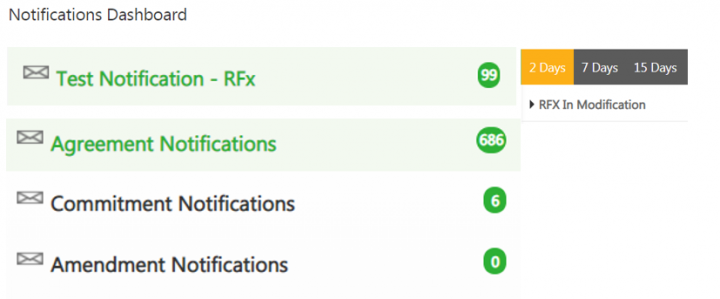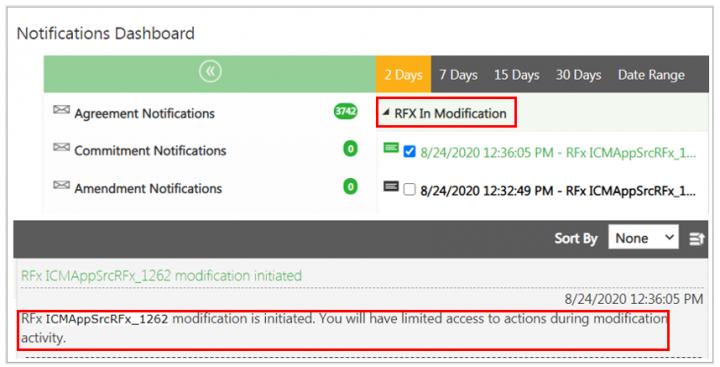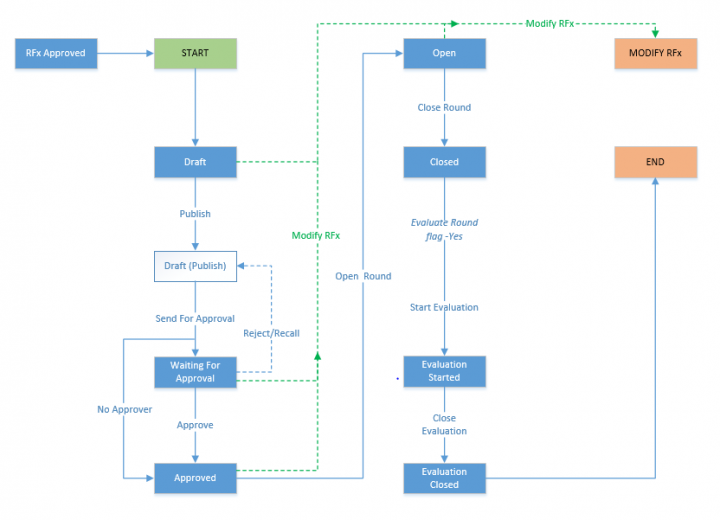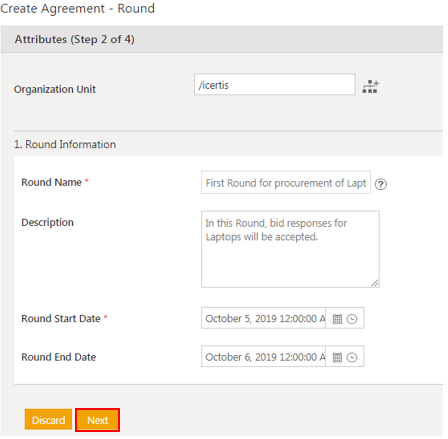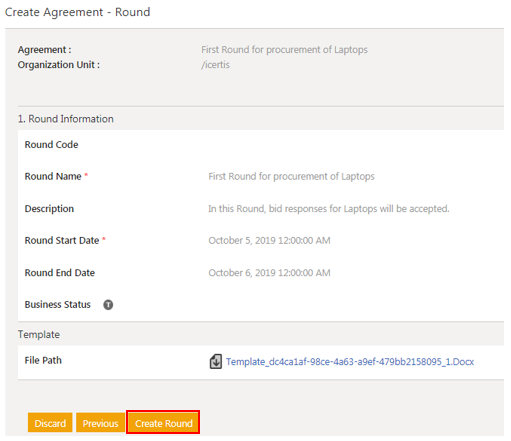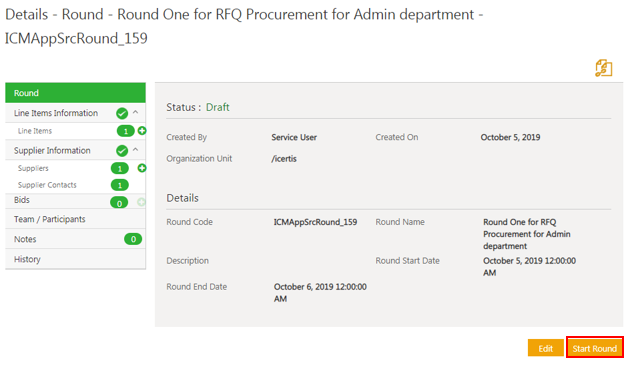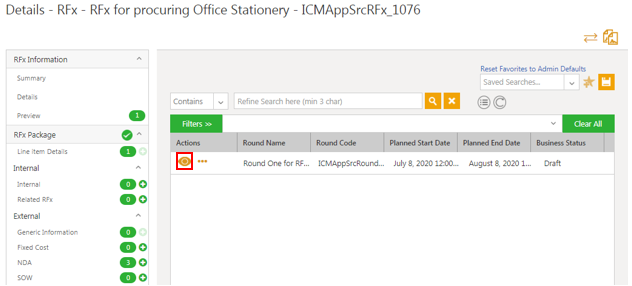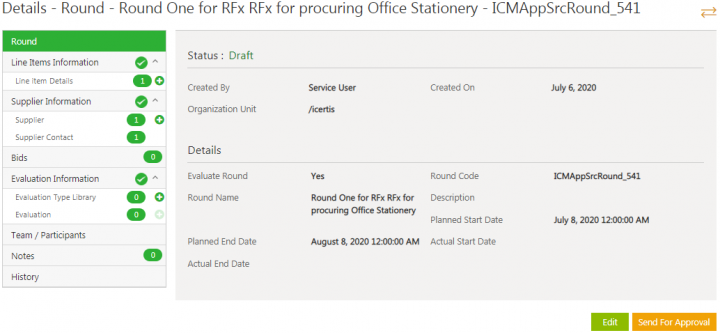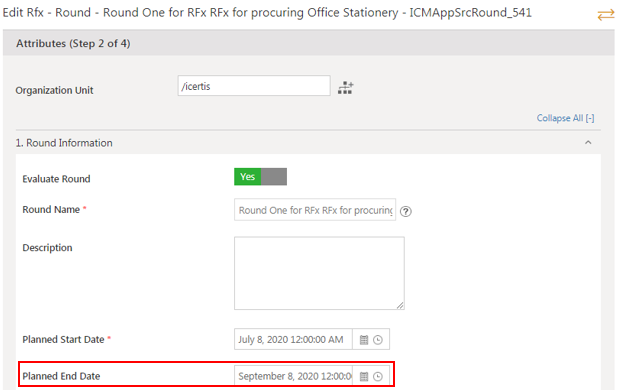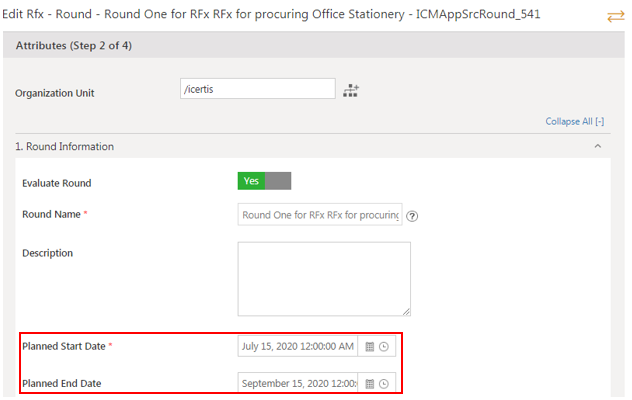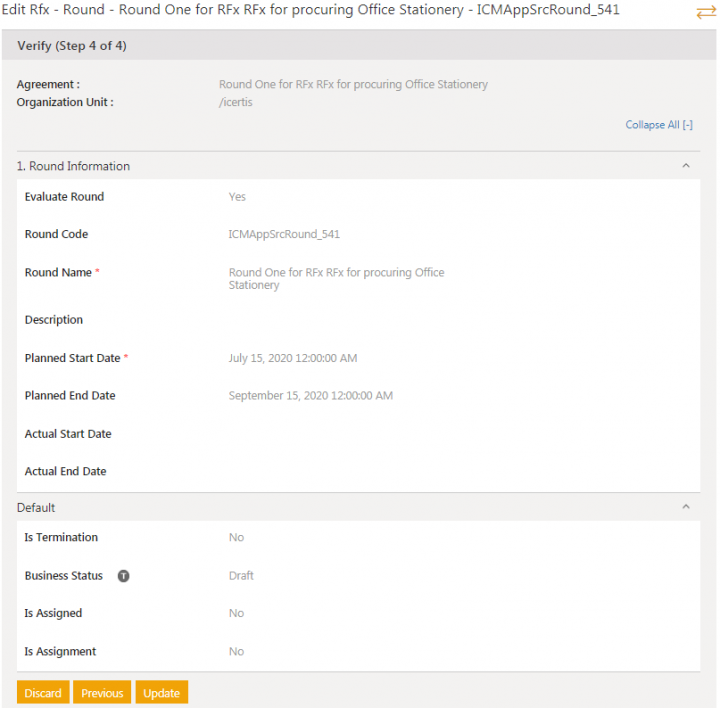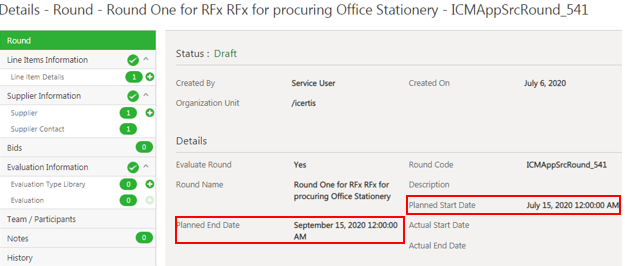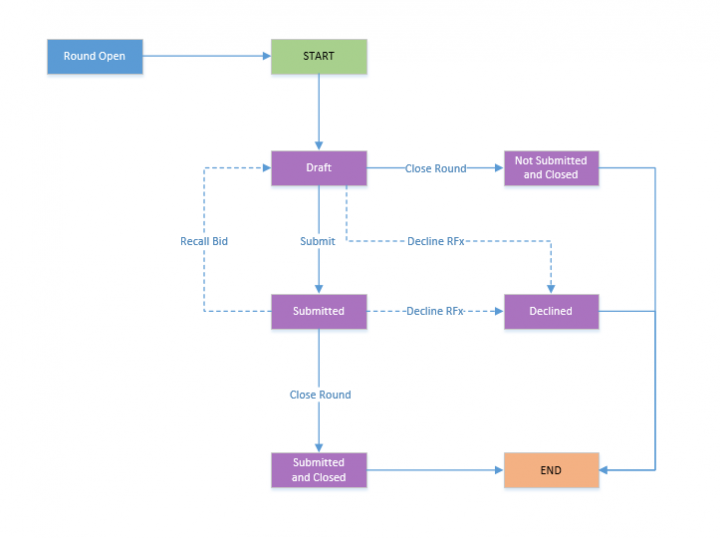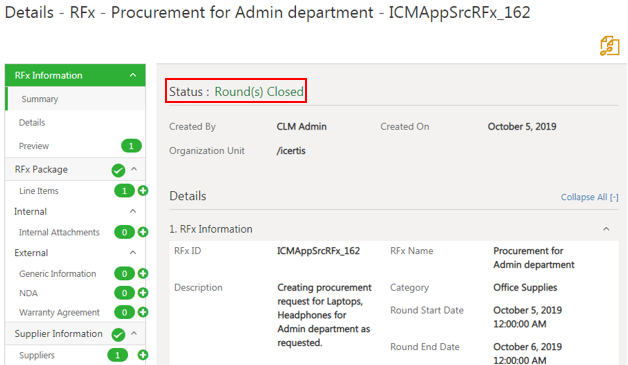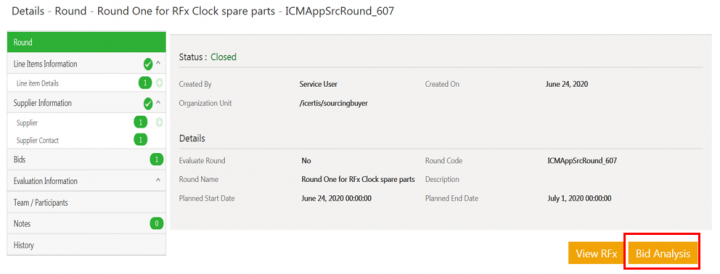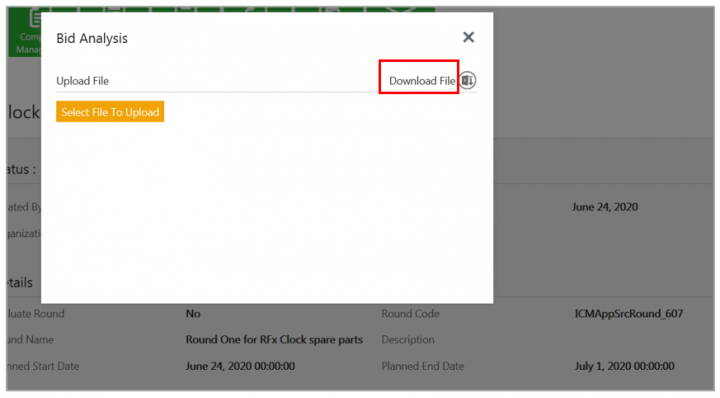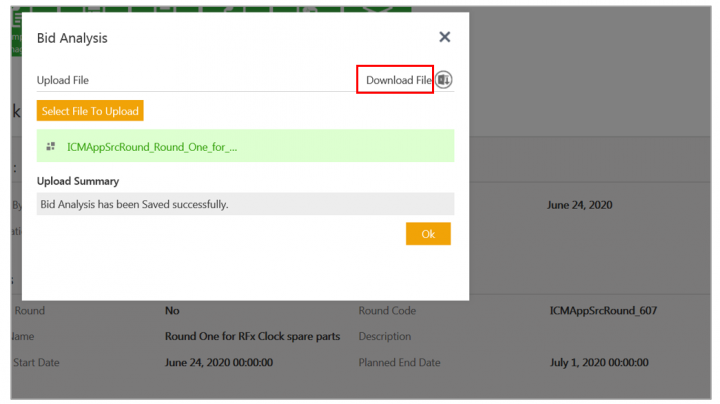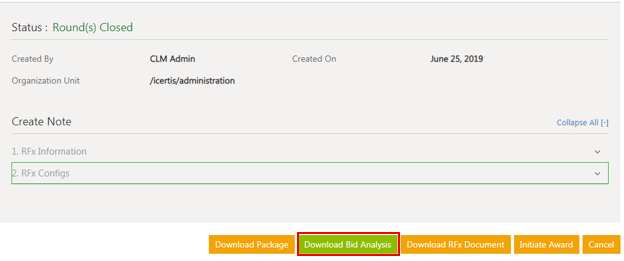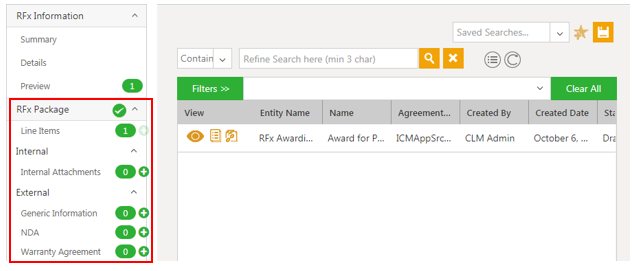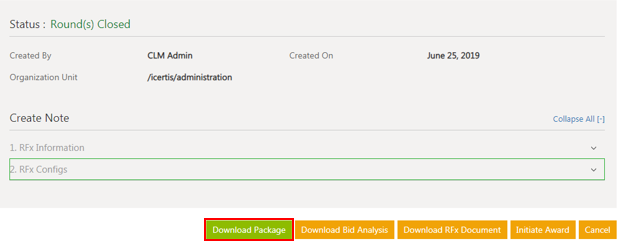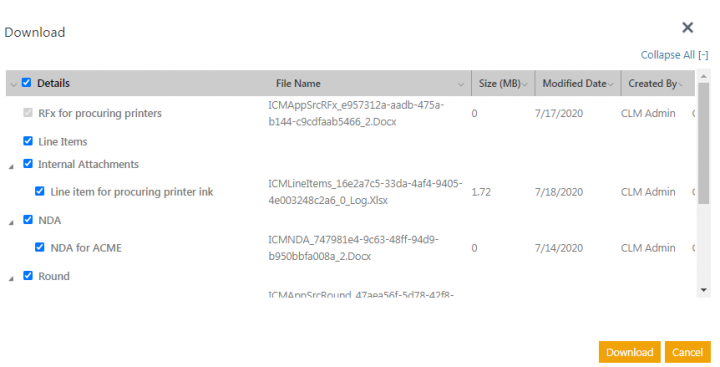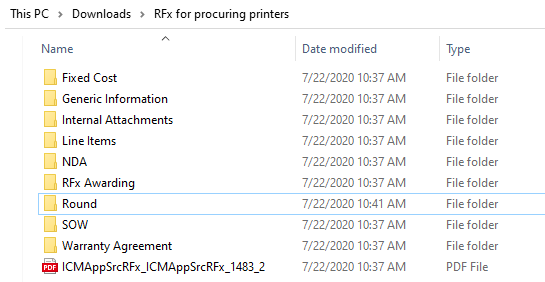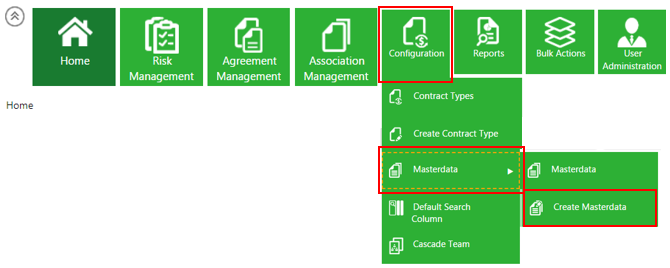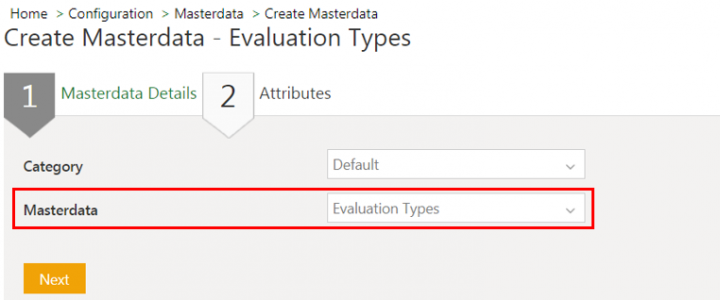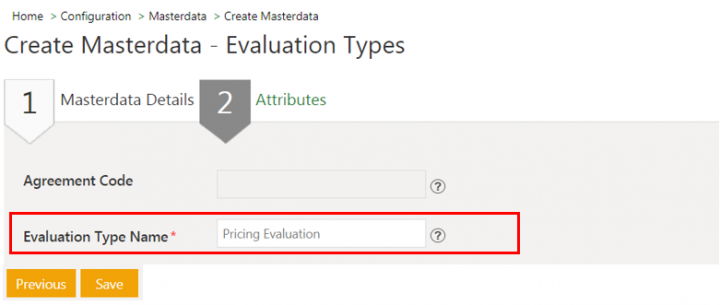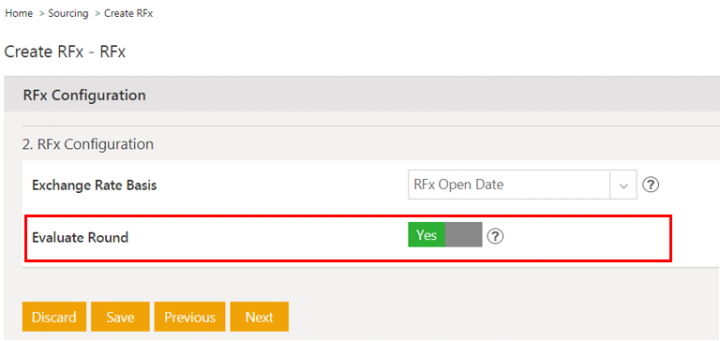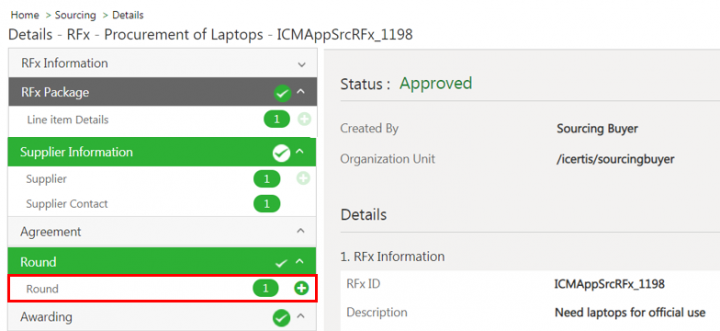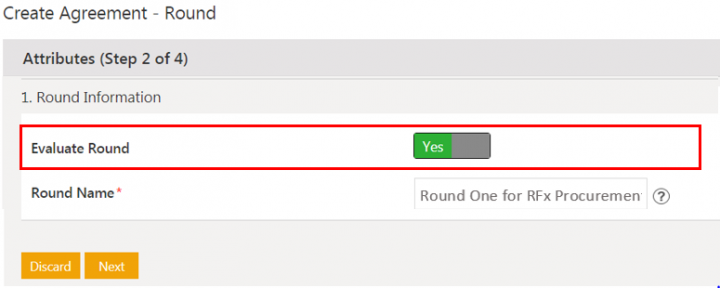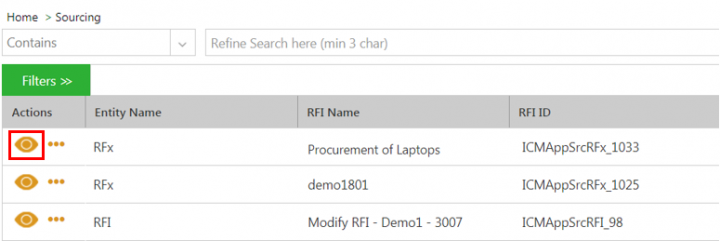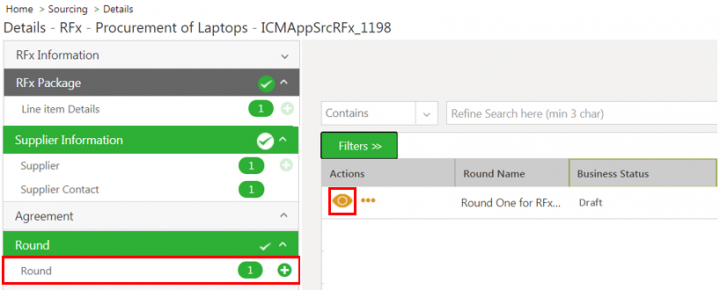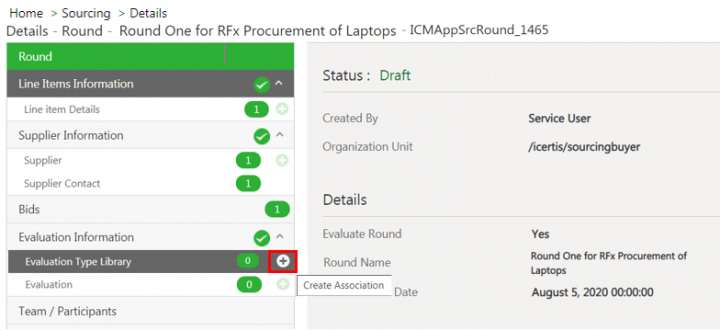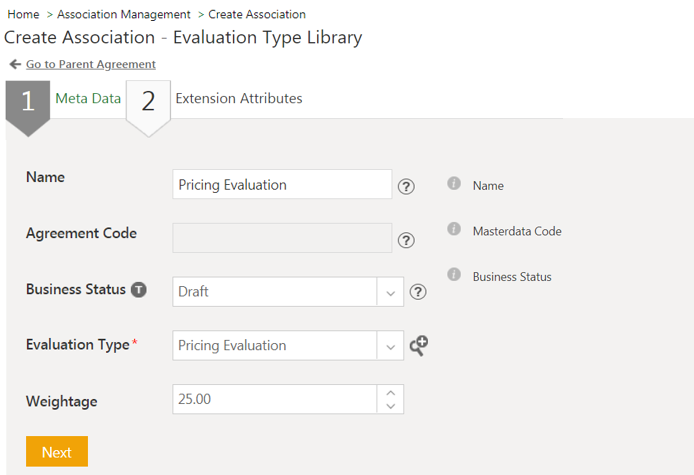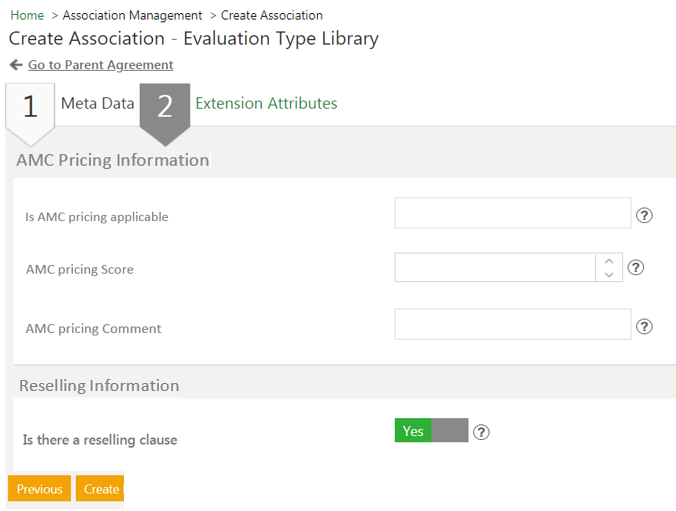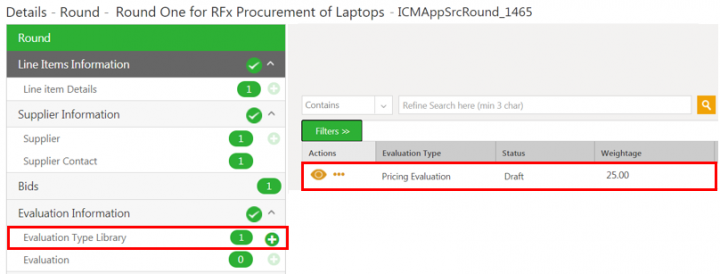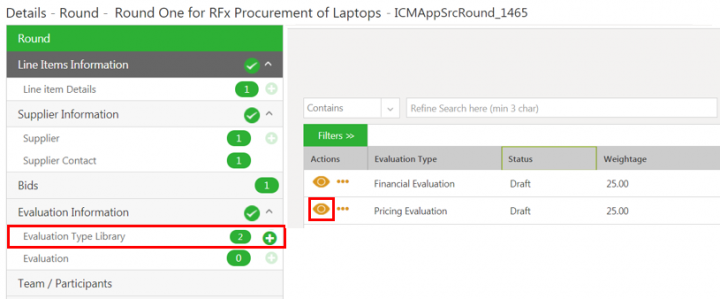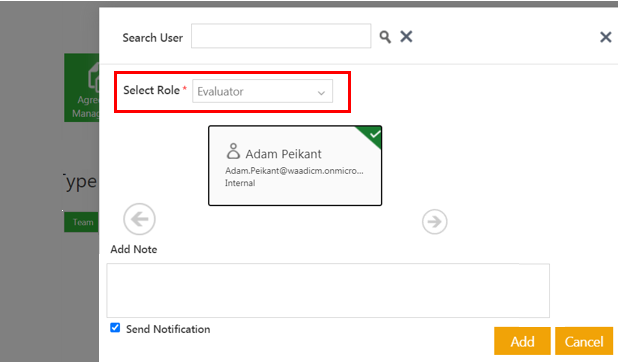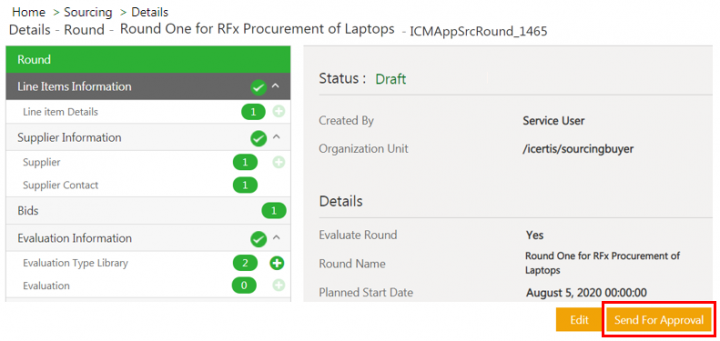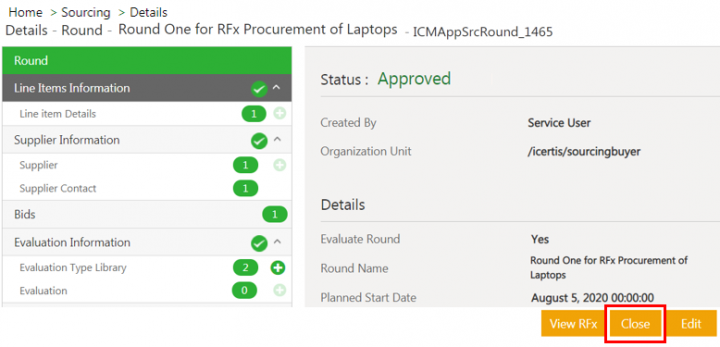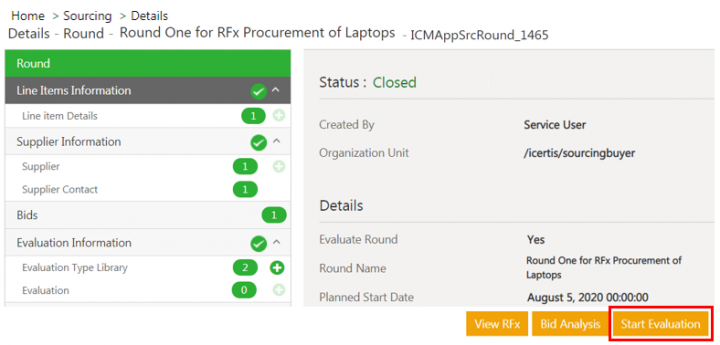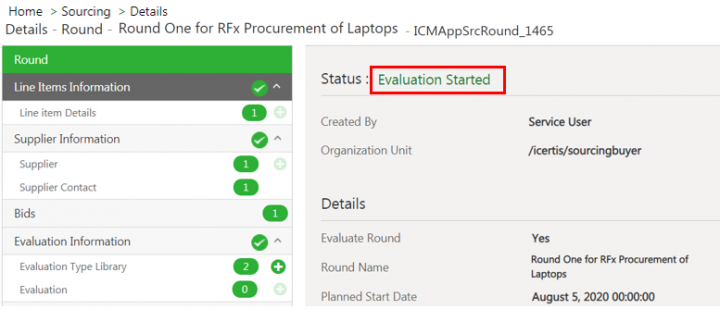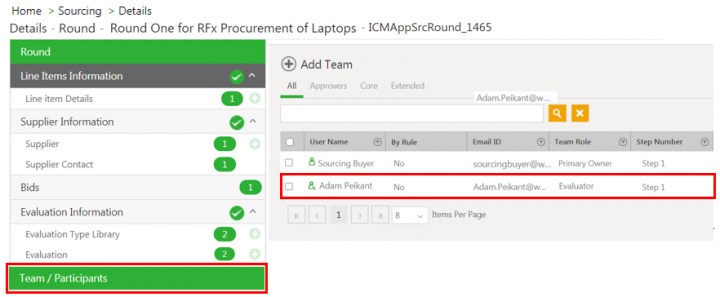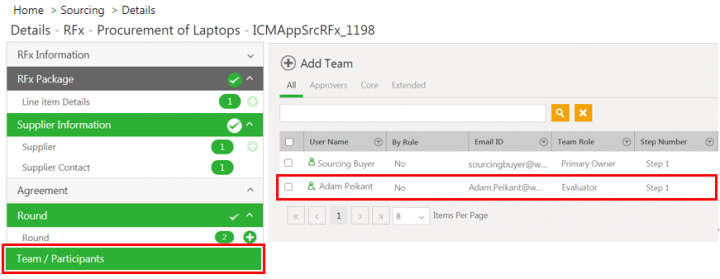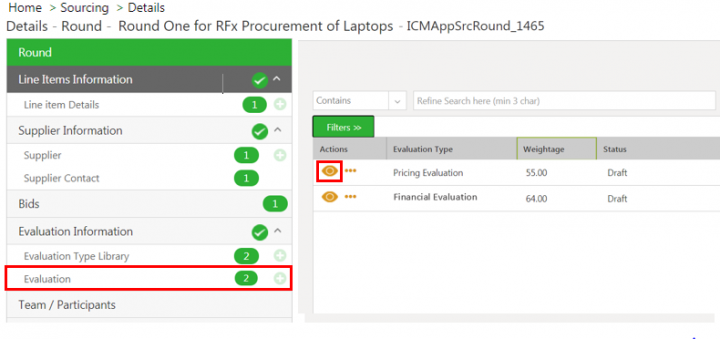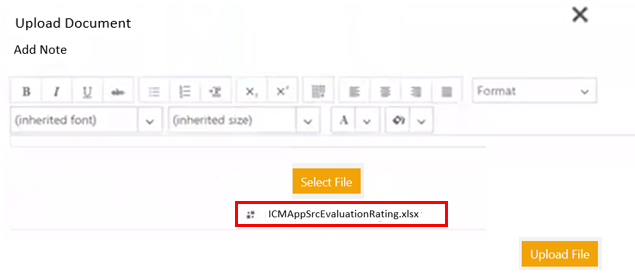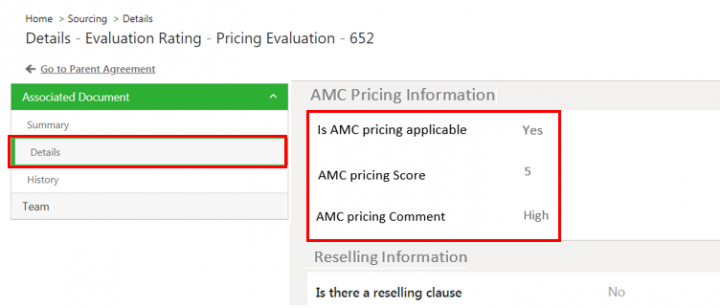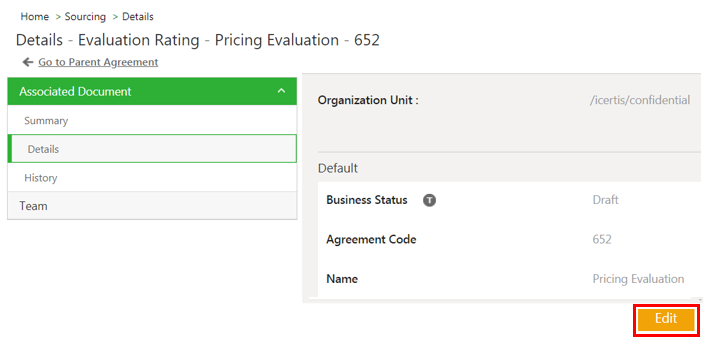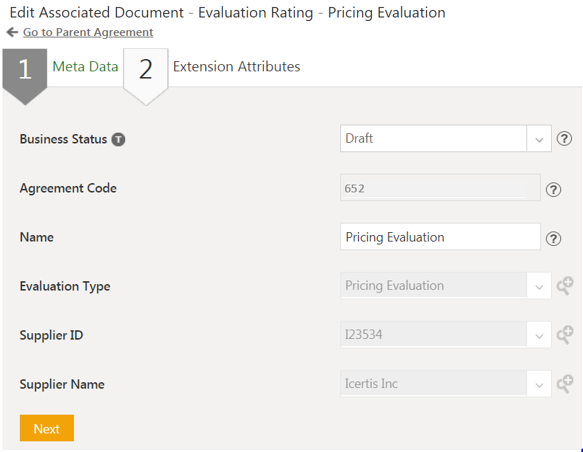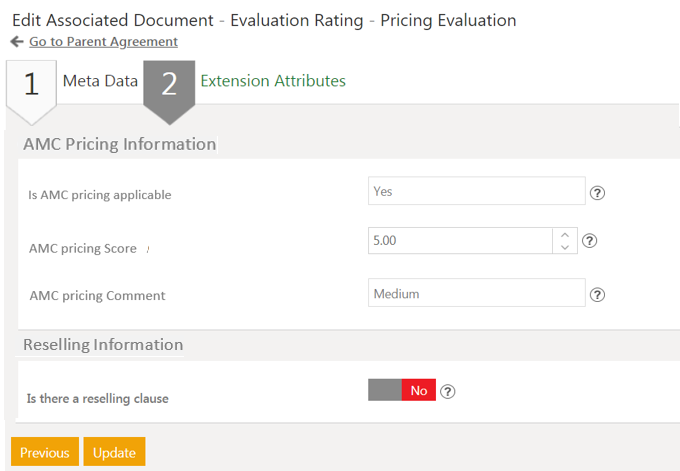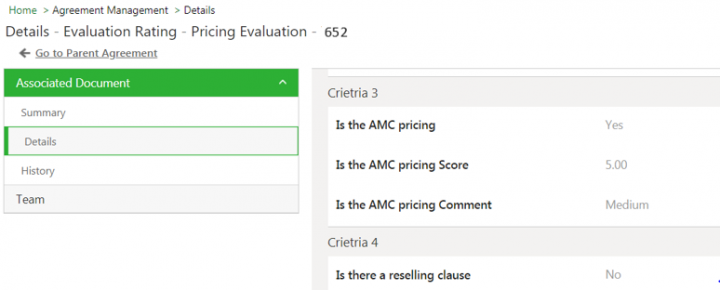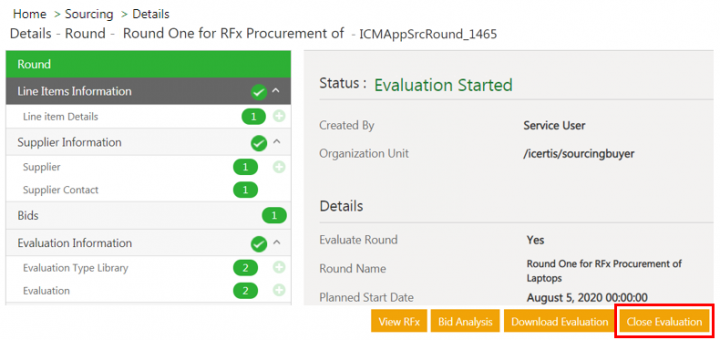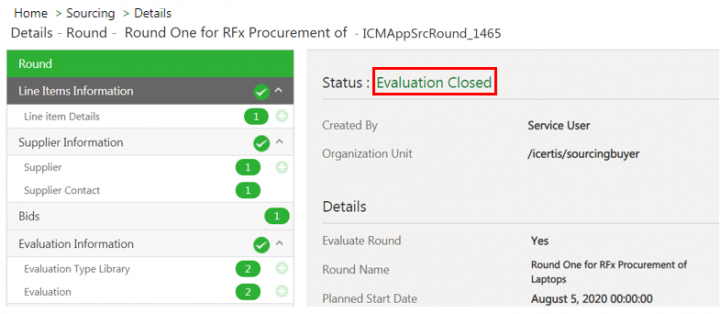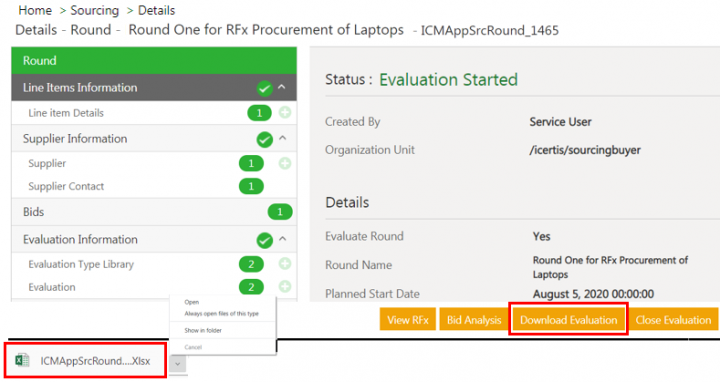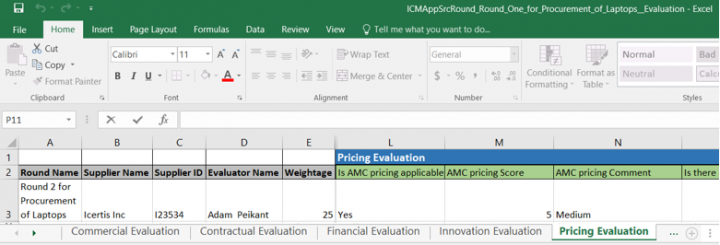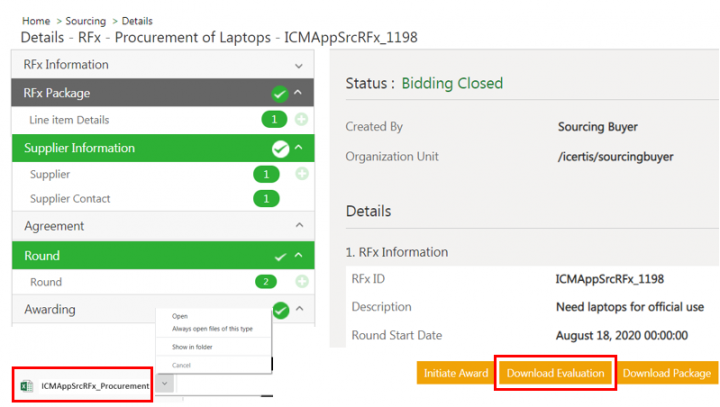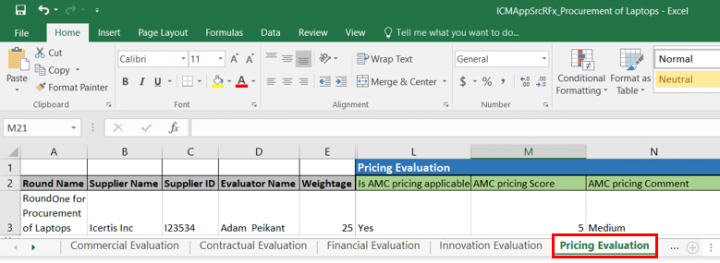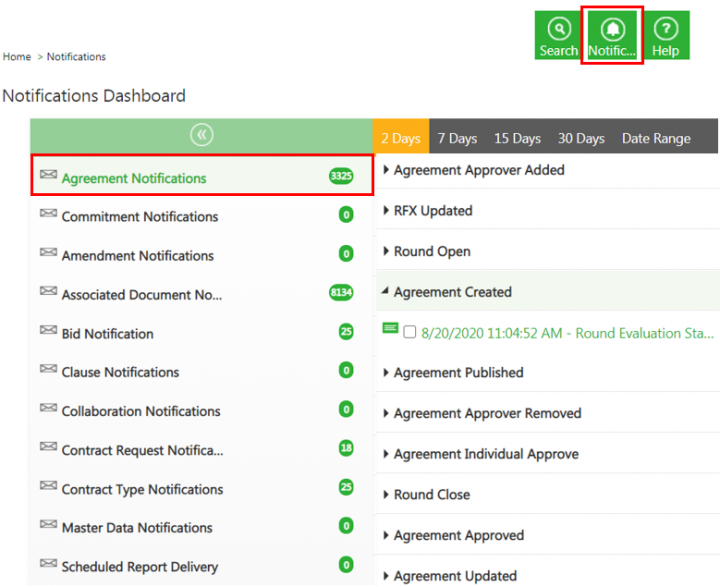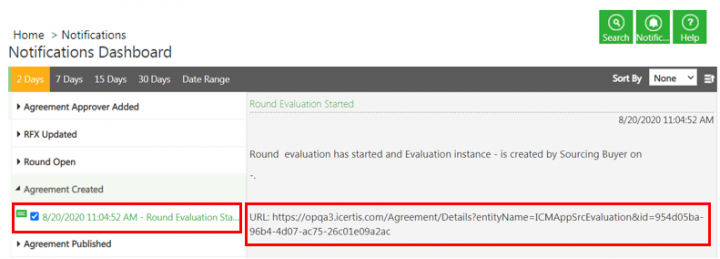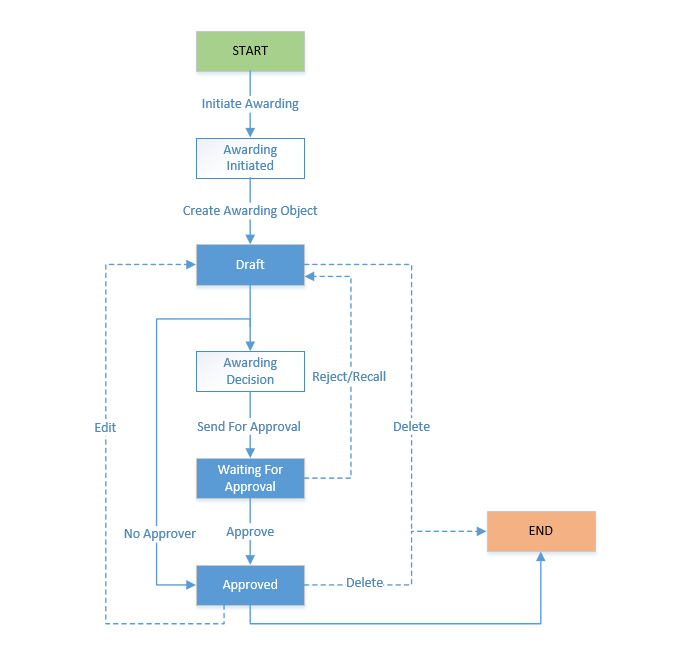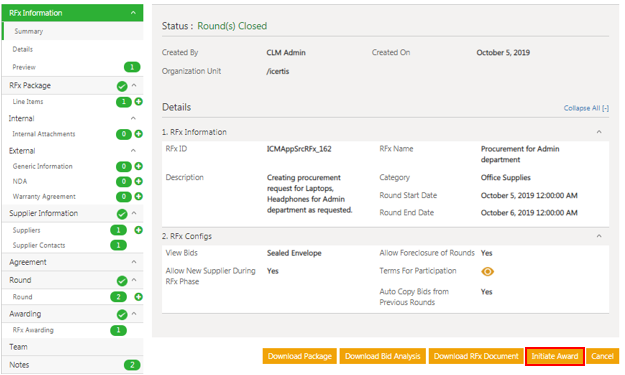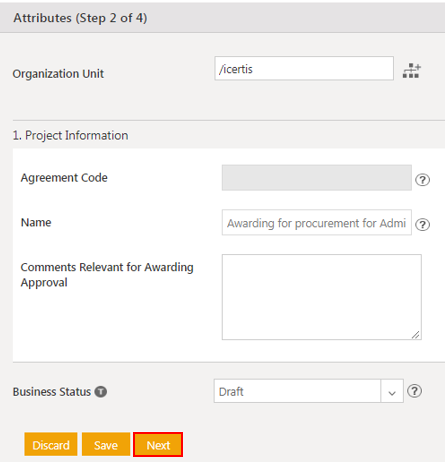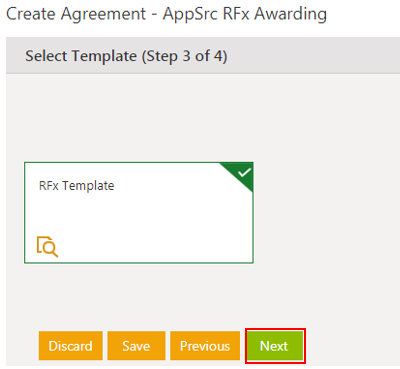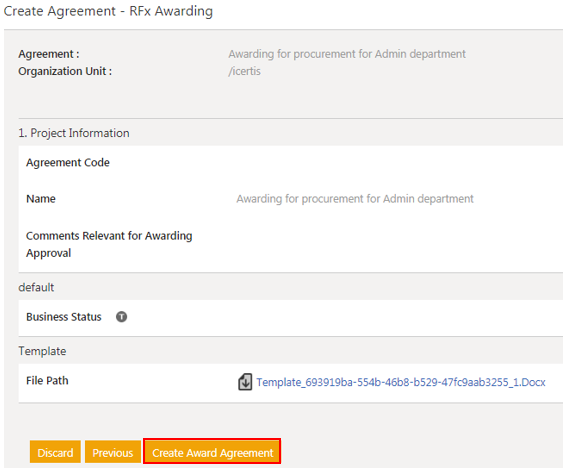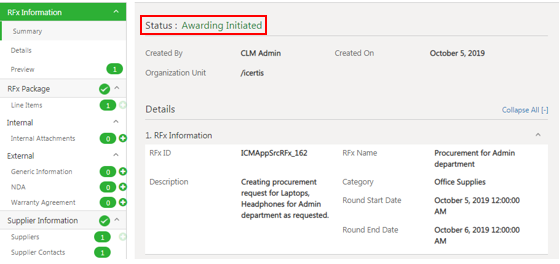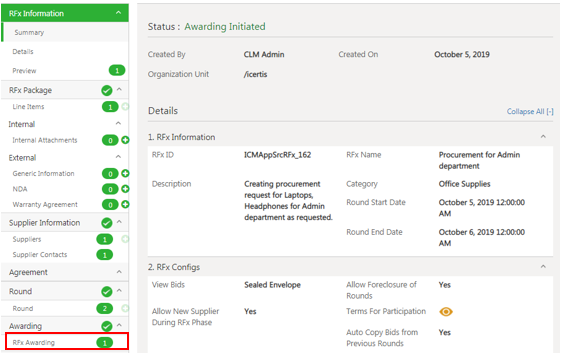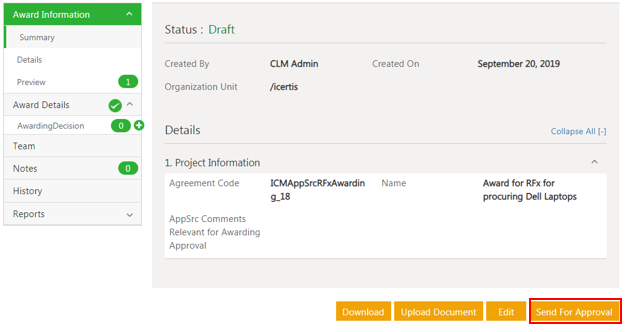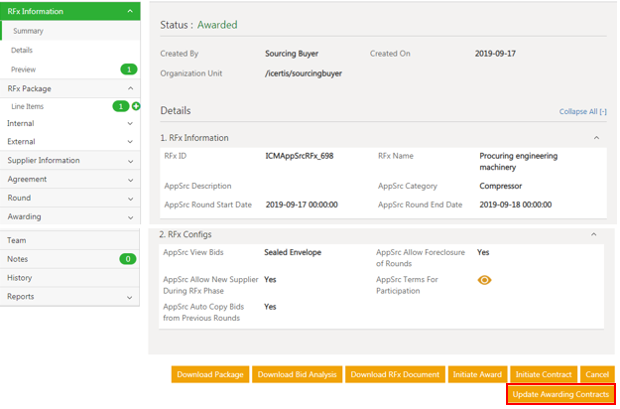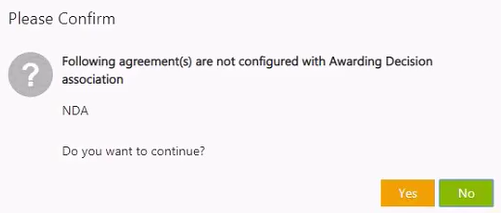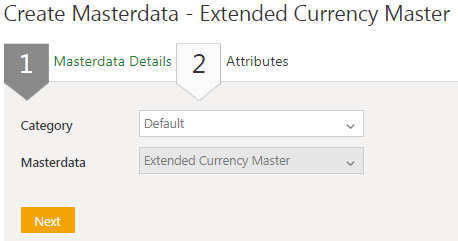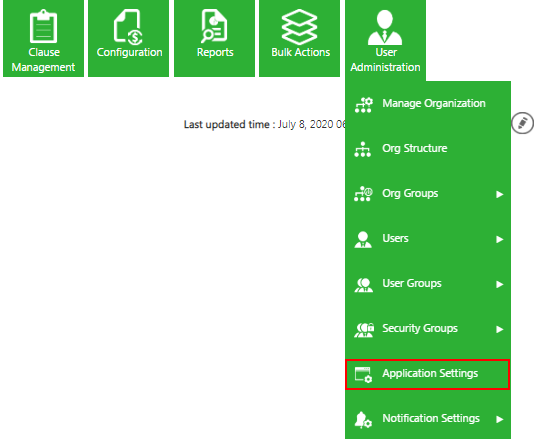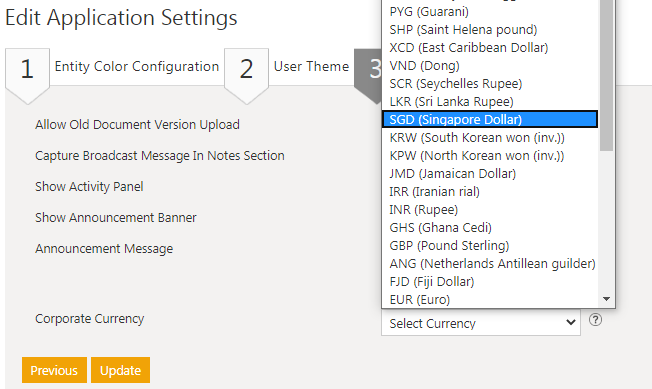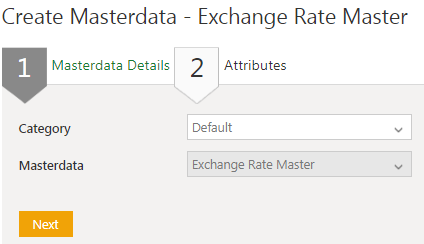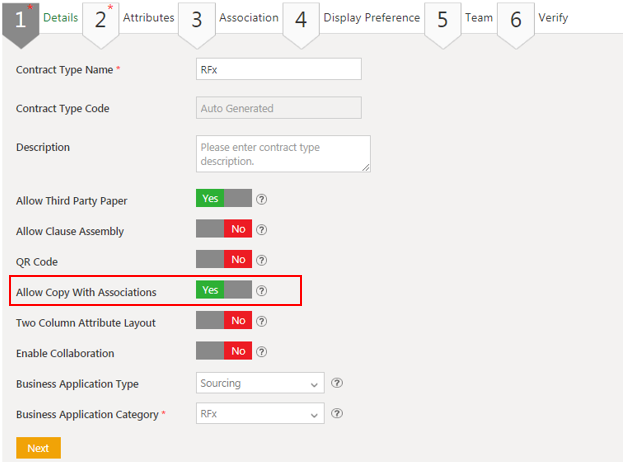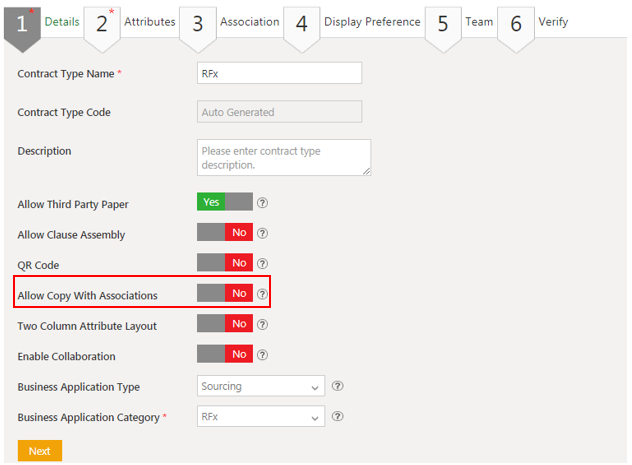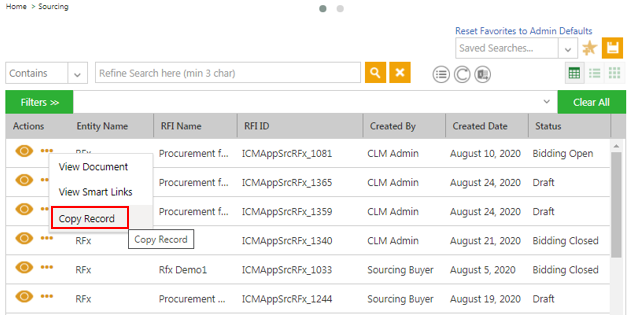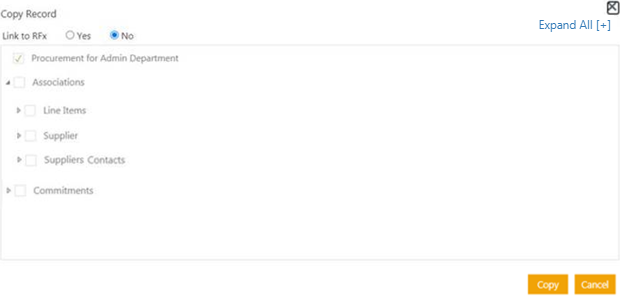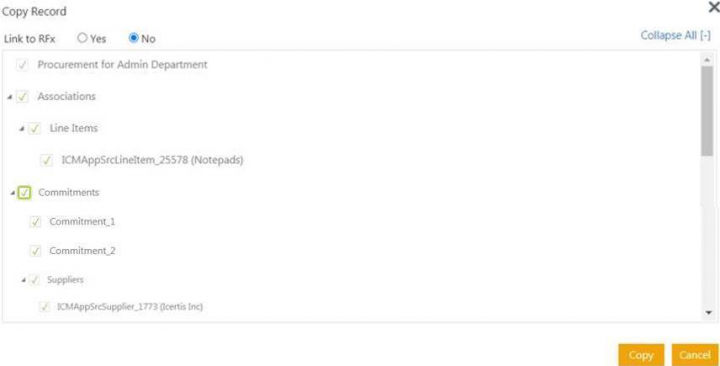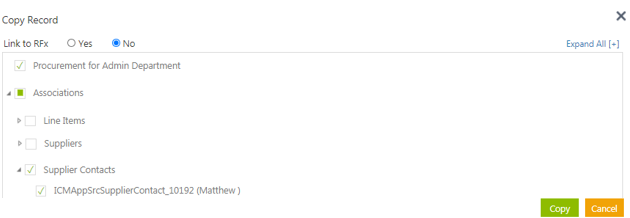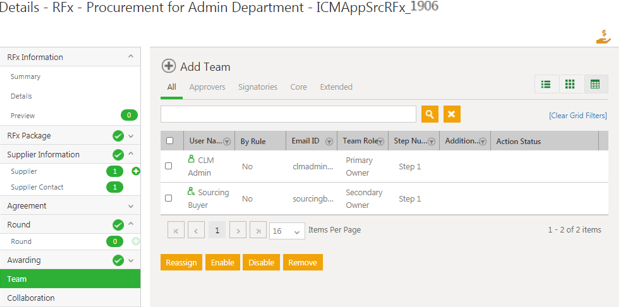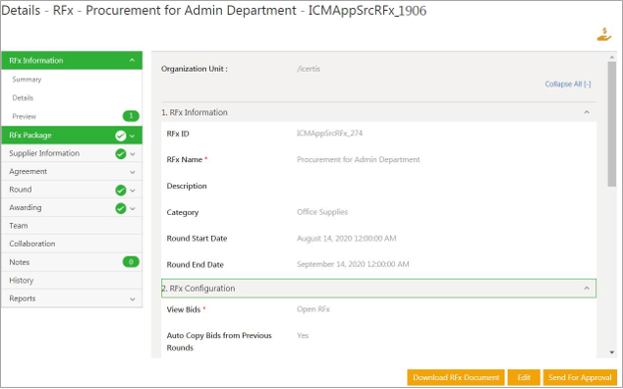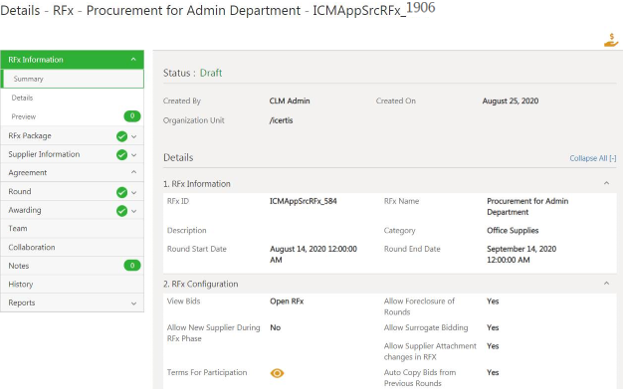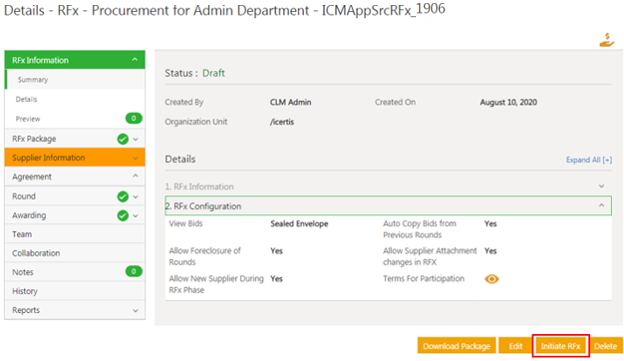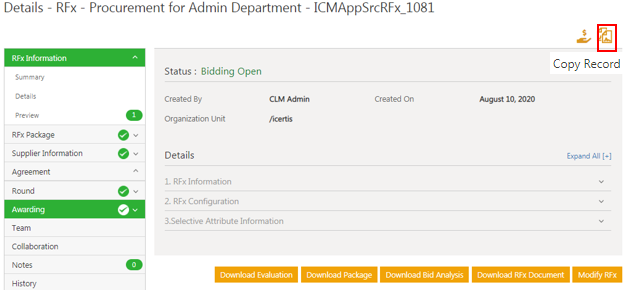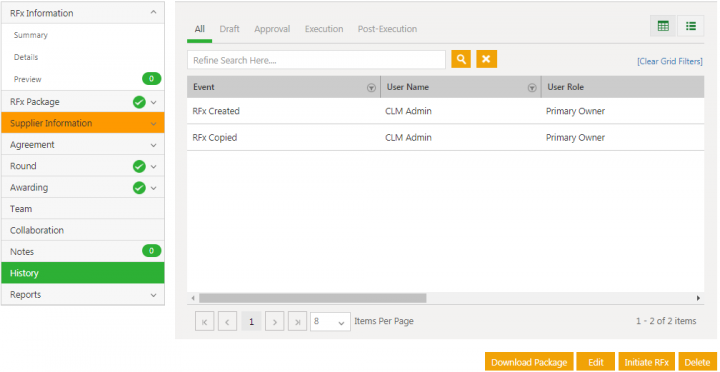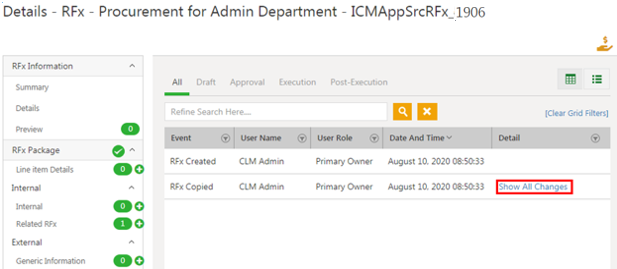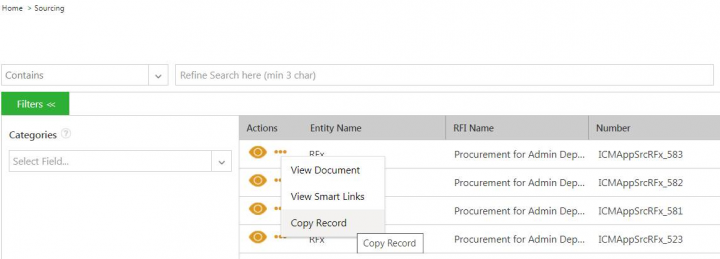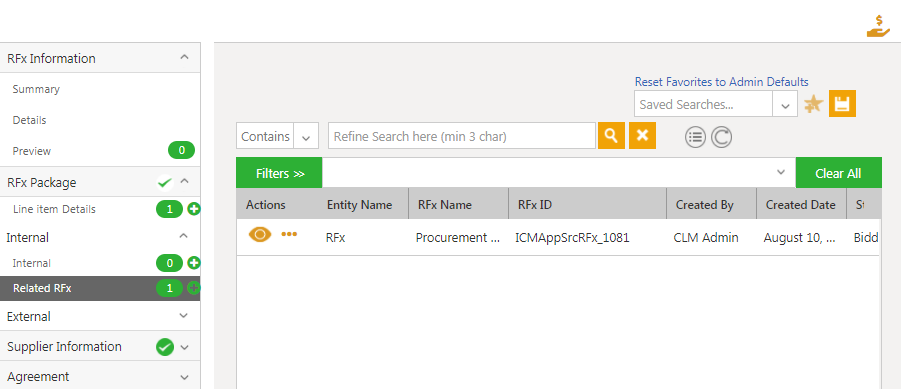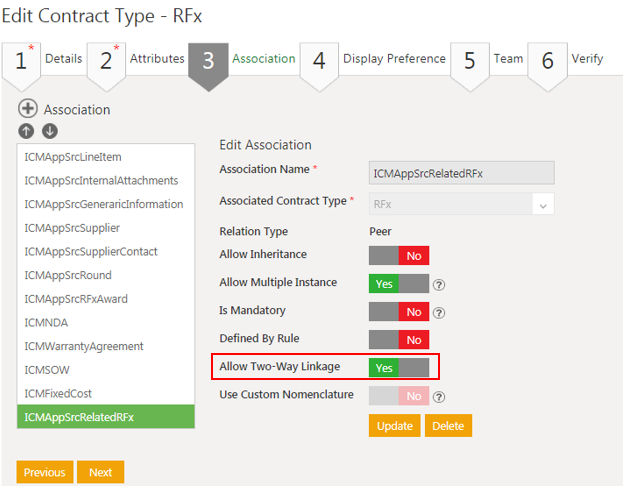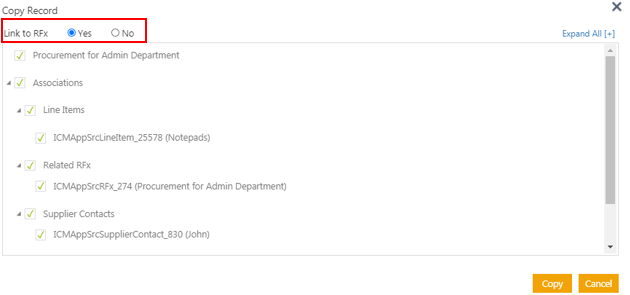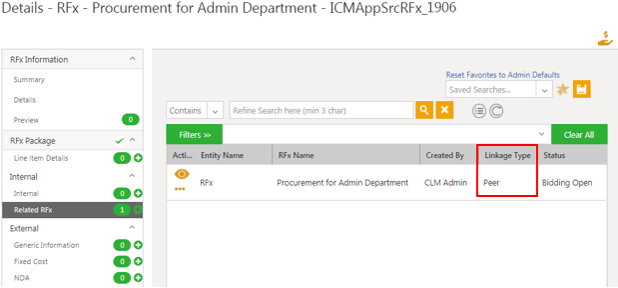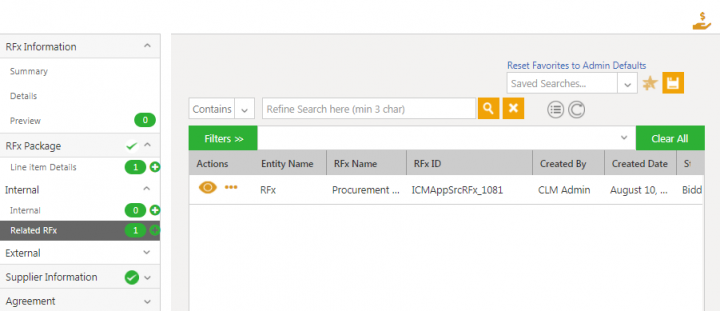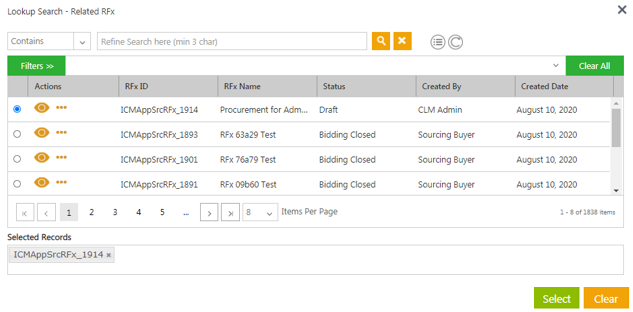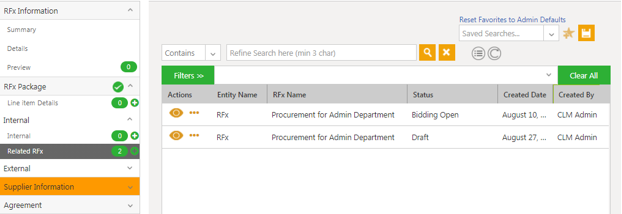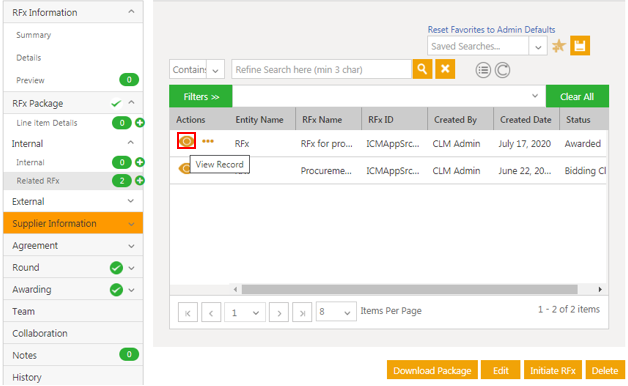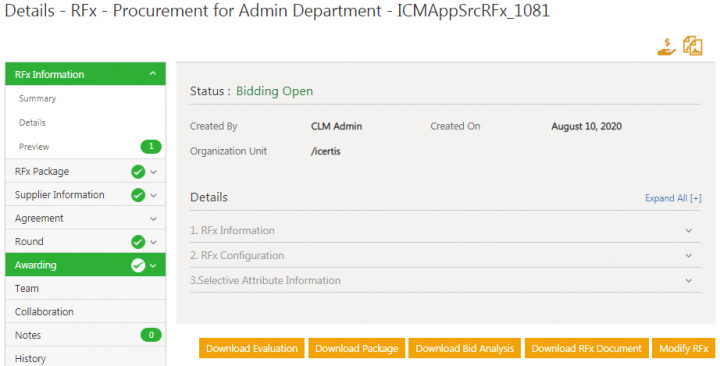Contents
[hide]- 1 Working with RFx Instances
- 1.1 Creating the RFx Instance
- 1.2 RFx Details Page
- 1.3 Adding Line Items
- 1.4 Selecting Suppliers
- 1.5 Modifying RFx
- 1.6 Working with Rounds
- 1.7 Working with Bids
- 1.8 Evaluating Suppliers
- 1.8.1 Creating Evaluation Type Masterdata instances
- 1.8.2 Enabling the Evaluation at RFx level
- 1.8.3 Enabling Evaluation at Round level
- 1.8.4 Defining Evaluation Types for Rounds
- 1.8.5 Adding Evaluators to the Evaluation Type
- 1.8.6 Starting the Evaluation process
- 1.8.7 Results of Evaluation process
- 1.8.8 Closing the Evaluation
- 1.8.9 Downloading the Evaluation Rating
- 1.8.10 Accessing Notifications
- 1.9 Awarding Workflow
- 1.10 Currency Support
- 1.10.1 Configuring the Corporate Currency in Currency Master
- 1.10.2 Configuring the Exchange rate of different currencies
- 1.10.3 Selecting RFx currency and allowed currencies
- 1.10.4 Selecting the exchange rate for RFx
- 1.10.5 Selecting currencies from the list of allowed currencies
- 1.10.6 Using currency conversion rate in Bid Analysis
- 1.10.7 Bidding in multiple currencies
- 1.10.8 Currency information in awarding contracts
- 1.11 Copy RFx
- 1.11.1 Enabling Allow Copy with Association flag
- 1.11.2 Disabling Allow Copy with Association flag
- 1.11.3 Copying the RFx when Allow Copy With Association flag is enabled
- 1.11.4 Viewing the changes in the audit log of copied RFx
- 1.11.5 Copying record for non published RFx
- 1.11.6 Copying the RFx when Allow Copy With Association flag is disabled
- 1.11.7 Linking the RFx
- 1.12 Glossary
Working with RFx Instances
The Icertis Sourcing app enables buyers to create and manage end-to-end RFx process. RFx is an acronym for Request for x, where x may stand for Information or Proposal or Quotation. Buyers can create an RFx instance, add line items, select suppliers and supplier contacts, create agreements with the suppliers, add team members to the instance for review and approval process and send the instance for approval. Here is the RFx workflow at a glance:
Creating the RFx Instance
1. Click the Sourcing tile on the Dashboard. The Sourcing page opens. A list of all the RFx instances is displayed.
5. Select or enter the values for all the required Attributes in the RFx Information group:
- Enter the RFx Name. For example, Procurement for Admin department.
- Enter the information of the RFx instance in the Description field.
- Select the Category from the drop-down. For example, Office Supplies.
- Select the Round Start Date and Round End Date. When you enter the dates, a round is created automatically as soon as the RFx instance is approved.
6. Select appropriate values and settings under the RFx Configs group.
- View Bids: Select an appropriate option from the drop-down. There are following options:
- Sealed Envelope: When you select this option, the bid and bid responses are not visible to the buyer until the round is closed.
- Open RFx: When you select this option, the bid and bid responses are visible to the buyer throughout the duration of the round, as and when the supplier submits the bid.
- Select Yes or No for the following Configuration settings as per your requirement:
- Auto Copy Bids from Previous Rounds: Select Yes if you want to allow copying bids from previous rounds to the new round. This displays the bids from the current rounds and the bid responses with values added in the most recently closed round in Draft state to the suppliers. The default value for this option is set to Yes.
- Allow Foreclosure of Rounds: Select Yes if you want to close the round before the selected round end date. This displays the Close Round button on the Round Details page to close the round manually. If you select No, then the round will be closed automatically only after the selected round end date. The default value for this option is set to Yes.
- Allow New Supplier During RFx Phase: Select Yes if you want to allow new supplier(s) to be added during the entire RFx lifecycle. However, the newly added supplier(s) can participate in a new round only, not in an ongoing round. The default value for this option is set to No.
- Enter the Terms For Participation in the given field. They will be visible to the suppliers only if the buyer adds it when creating the RFx. The suppliers should accept the Terms before they can participate in the bidding process of the RFx. For example, if a supplier has multiple contacts and if one of the contacts accepts the terms for participation, then other contacts are not required to take any action on that and the Terms for Participation will not be displayed to the remaining contacts.
- Allow New Line Item During RFx Phase: Select Yes if you want to allow new line items to be added during the entire RFx lifecycle, However, the newly added line item(s) can be part of a round only before it starts and not in an ongoing round. The default value of this option is set to No.
- Select the following contracts (if applicable) by clicking the drop-down arrow or the Lookup Search icon:
- Associate Contracts: Sourcing app allows the buyers to create contracts such as NDA, for all the suppliers selected when creating RFx. A separate contract will be created for each supplier.
- Mandatory Contracts: It is the contract that should be present for all the suppliers before the RFx moves to the next phase. The value in this option will be populated automatically based on the value selected in the earlier option. You cannot select any value in this option if you don’t select anything in the Associate Contracts option.
- Prerequisite Contracts: The Supplier can access the RFx instance only after it is in Approved state. After the Round is started, a Terms for Participation window is displayed to the supplier with an option to accept or decline. The Suppliers can access the RFx only after they sign the Prerequisite Contract after accepting the terms for participation. If the Suppliers do not sign the contracts a message is displayed by ICI, along with a list of documents asking the suppliers to complete the documents before accessing the RFx.
The values selected in these fields are populated on the RFx Details page under the Agreements tab. This enables the buyer to create Agreements relevant to the RFx that is created.
The attributes for mandatory and prerequisite contracts are interlinked and both the attributes display the list of different contract types that can be associated with the RFx. ICI validates whether the prerequisite and mandatory contracts added to the RFx are in Approved state.
- Primary Currency: Select the primary currency for the RFx. If the user preferred currency is not added in the currency master, then the corporate currency is set as the primary currency of the RFx. For example, if user preferred currency is SGD which is not added in currency master, then the primary currency is set as USD assuming it is set as the corporate currency.
- Allowed Currency: Select the allowed currency for the RFx. This is the currency allowed by the buyers for the suppliers operating from a different country. The selected allowed currencies can be used by suppliers for bidding. Suppliers can view the newly added currencies even when the round is Open and select them as required. Buyers can update the allowed currency at any time using Modify RFx option. The allowed currencies cannot be deleted after the RFx is approved.
- Exchange Rate Basis:Buyers can view the exchange rate throughout the RFx lifecycle by clicking the View Exchange Rate Table icon at RFx, Line Items, Bids, Bid Responses. The exchange rate basis can have one of the following values:
- RFx Open Date: This is selected by default. When this is selected, system uses the start date of first round for determining exchange rates
- RFx Closed Date: This date must be selected same as the round end date. When this is selected, system uses close date of the last round for determining applicable exchange rates
- User selected: This is the date from when the exchange rates are made applicable by the buyers. It is mandatory to select the Exchange Rate Date that is enabled after selecting User Selected as the Exchange Rate Basis. The selected date is used as the date to determine the exchange rate and all calculations of currency conversion. Buyers can view the exchange rate information when selecting the Exchange Rate Basis as RFx Open Date or RFx Closed Date after the RFx is approved and the round is created.
7. Click Next. The Select Template (Step 3 of 4) page opens. This is an optional step depending upon how the application is configured. Usually there would be only one template associated with the RFx that is selected automatically. However, multiple templates can be configured in ICI as per the business requirement.
RFx Details Page
Buyers can view the current status and details of the RFx in various sections of the left navigation pane on RFx Details page. Buyers can also perform a variety of actions based on the current state of the RFx.
Here is a brief description of the options in the left navigation pane of RFx Details page.
- RFx Information: This section displays the basic details of the current RFx instance. It has the following sub-sections.
- Summary: Displays the name of the RFx instance (that is added while creating), who created it, and RFx instance details.
- Details: Displays the details specified while creating the RFx instance.
- Preview: Displays how the RFx document would actually look. Click the click here in To see full document click here to download and view the full document in pdf format.
- RFx Package: This section displays the following details.
- Line Items: Click this option to view the list of line items associated with the RFx. Click the plus icon next to Line Items on RFx Details page to add a new line item.
- Internal Attachments: Displays the list of existing internal attachments associated with the RFx. Internal attachments are associated documents uploaded by the buyers and only available to the buyer team. Click the plus icon next to internal attachments to add new to the list.
- External Attachments: Displays the list of existing external attachments associated with the RFx. External attachments are associated documents uploaded by the buyers and available to both buyers and suppliers. Click the plus icon next to external attachments to add new to the list.
- Supplier Information: Displays the list of existing suppliers and allows buyers to add new suppliers along with their contact information.
- Suppliers: Displays the list of suppliers added to the RFx created by the buyer. Click the plus icon next to Suppliers to add a new supplier.
- Supplier Contacts: Displays the list of supplier contacts that are populated automatically after you select the suppliers in the previous step.
- Agreements: Displays all the agreements that were selected initially when creating the RFx.
- Collaboration: Allows the internal or external team members to communicate with other internal or external team members by creating topics and posting messages in it.
- Round: Displays the list of rounds associated with the RFx along with their current state. Click the plus icon next to Round to add a new round.
- Awarding: Displays the RFx instance awarded to the supplier. After the rounds are closed and awarding is initiated by the buyer, an awarding object is created.
- Team: Displays the members added to the team for this RFx instance. Click the plus icon to add new team members to the RFx.
- Notes: Displays the additional information about the RFx if it is added.
- History: Displays how the RFx has progressed till now. The actions performed by the buyer are displayed by the buyer on the RFx instance are displayed under History in the left navigation pane on RFx Details page.
Buyers can perform the following actions from the RFx Details page:
- Download RFx Document: Click this button to download the RFx document in Microsoft Word format. The downloaded document is based on the template selected while creating the RFx instance.
- Edit: Click this button to go back and make changes to the RFx that you created.
- Send for Approval: Click this button to send the RFx instance for approval.
- Download Package: Click this button to download the RFx instance along with all its associations. You can select specific associations that you want to download or select the RFx instance checkbox to download the RFx package. RFx package is downloaded as a zip file that contains all the attachments relevant to the RFx. When the zip file is exported on user’s local machine, a folder structure is created that resembles the RFx structure, and the files are located in the respective locations.The files names will be the same when downloading or uploading them to ICI. The files will be downloaded as per the defined folder structure and folder naming conventions which helps users to easily identify files under individual folders of the RFx and avoid any discrepancies. The folder names for associations are now same as the contract type display names such as line items, internal attachments, round, bid response and so on.Downloading the RFx package displays the folders for RFx, round, bid, RFI Response as they are displayed in ICI. The rounds and bids folders are merged in a single folder and the template files are added to the relevant round or bid folder. This is applicable for RFx and RFI.
- Delete: Click this button to delete the RFx instance. After deleting the RFx instance, the Sourcing page opens and the deleted RFx will not be available on the user interface.
Adding Line Items
You can add line items at any stage of the RFx instance depending upon RFx configuration settings. Line items are products that the buyer is looking to procure through the RFx instance. When you create the RFx instance, the RFx Details page opens with the RFx status displayed as Draft. You can use the left navigation pane to add one or more line items. You can also add line items using Microsoft Excel import by selecting the file from your local machine and uploading it to ICI Sourcing.
To add line items:
1. Click the Create Association icon next to Line Items under the RFx Package tab. The Line Items window opens.
2. Enter the values in the following fields:
- Name: Enter the name of the items you want to procure. For example, Laptops.
- Part Number: Enter the specific details of the item. For example, Model number.
- Description: Enter more information of the item.
- Unit of Measure: Select appropriate unit of measure depending upon the item. For example, Piece, Each, Pack, etc.
- Unit of Order: Select the unit of order you want to procure. For example, in the multiples of 10s or 100s etc.
- Desired Quantity: Enter the quantity of the item you wish to procure.
- Bid Currency: Select the currency from the drop-down.
- Additional Details: You can upload a file that contains additional details about the item.
3. Click Create. The Line Item is created. The Count is updated in the left navigation pane on the RFx Details page.
Adding Bulk Line Items
The bulk associations capability has enabled ICI to handle large number of associations in the tune of thousands, by presenting itself as a lightweight association as well as tremendously improving performance. The Sourcing event can include many line items for an RFx ranging from 500 to 50,000 maximum. In Sourcing, line items are considered as associations.
The bulk association configuration has now been simplified by providing a Enable Bulk Processing flag at contract type definition level which triggers a set of defaults that has been intentionally restricted. The end user experience for the bulk association has not changed from the way that the conventional association is handled from the UI, rather the underlying data structure has been further enhanced to make it go the distance.
Performance has been the key while introducing and designing this new association, which has given way to the new type of instance, namely the Proxy Instance, which is retrieved in every GET call. The actual instances are referred by using this proxy instance, thereby reducing the load on the GET APIs. Specialized GET and SET APIs have also been introduced for bulk associations to improve its adaptability and ease-of-use.
Bulk associations have very effectively consumed the Elastic Search Bulk API to sync a large set of data at one go, rather than the traditional way of one instance at a time, adding to the boost in performance.
Bulk association is enhanced to be able to address the large volume of data that Sourcing apps require, including:
- The associations do not have a workflow.
- Simplifying the association team by maintaining single team at proxy level for all instances, instead of each instance having its own team.
- Restricting document assembly, for individual instances, but the instances can be assembled in the parent agreement as a table or saved search.
- Reduced the attributes to be indexed in the parent, so as to cater to more number of instances driven by the configuration key.
To enable the Bulk Processing flag:
1. Click Configuration > Create Contract Type. The Select a type of contract window opens.
2. Select the Contract Type. For example, Associated Document.
3. Click Next. The Create Contract Type Wizard page opens.
4. Enter'a Contract Type Name. For example,Acme Bulk Pro.
5. Toggle Enable Bulk Processing flag to Yes.
6. Click Next.
7. Enter details on the following tabs.
8. Click Create on the Verify tab to create the contract type. It will now be in the Draft status.
9. Click Send for Approval to send the contract type for approval. When approved, the contract type Acme Bulk Pro will be displayed in the grid in the Approved status.
Uploading Bulk Associations (Line Items)
Prerequisites:
- RFx is created.
- In the RFx, line item exists as an association with Enable Bulk Processing flag as Yes.
- The event rule Associated Document Created is created.
To upload bulk associations:
1. Click Create RFx.
2. Enter the RFx Name. For example, Acme Bulk Pro RFx.
3. Click Next. The Select Template page opens.
4. Select the template and click Next. The Verify page opens.
5. Click Create RFx.
The created RFx will be displayed in the grid.
6. Click Line item Details on the RFX Details page. The line itemsDetails page opens.
7. Click the Import associated document data template icon. The Upload Document page opens.
8. Click Select File. Upload the file with the list of line items.
9. Click Upload File. The record processing details will be updated.
10. Click Ok. The RFx Details page opens. The Line Items associations are updated.
Selecting Suppliers
Suppliers are the businesses that participate in the RFx bidding process. The suppliers and their information such as Names, Addresses, Contact Numbers, Email Addresses, and Supplier Contacts are added to the Masterdata. The name of the existing Supplier Contact Name has been modified to Supplier Contact Full Name. For example, John Doe. Buyers can remove the supplier contact from the Supplier Contact page. This updates the count of selected supplier contact.The selected supplier contact’s full name is displayed on the new selected supplier contacts interface.The suppliers and supplier contacts saved earlier are now displayed as pre-selected when adding more suppliers and supplier contacts.
Now, the buyers can use any supplier and supplier contact masterdata contract type to add suppliers.
The supplier contact full name column will be displayed by default on:
- Supplier Contact selection page
- Details page of Supplier Contact
- Grid view of the supplier contact association
This makes it is easier for buyers and Administrators to identify and select the correct supplier if there are multiple suppliers with the same first name. This is applicable for bulk agreements too.
To add suppliers:
1. Click the Create Association icon next to Suppliers. The Supplier window opens.
2. Search for the desired supplier(s) or select the suppliers from the displayed list under the Supplier tab.
3. Click Next. The Supplier Contacts tab opens displaying the contact details of the suppliers.
4. Click the View Record icon next to the supplier’s name. The supplier’s contact details are displayed.
5. Select the desired Supplier Contact(s).
6. Click Save. The selected supplier(s) and supplier contact(s) are added to the RFx instance. The count is updated under the Supplier Information tab in the left navigation pane.
Error Validations
Buyers have the option to select mandatory and pre-requisite contracts while creating the RFx. The attributes for mandatory and prerequisite contracts are interlinked. The prerequisite contracts are derived from the mandatory contracts. So, if the buyers select the following contracts – NDA, Warranty Agreement, Fixed Cost Agreement as mandatory, then they have the option to select one or more, or all as prerequisite contracts.
Suppose the NDA is the prerequisite contract for accessing the RFx, then the validations are done such that ICI expects that the Instance of an NDA contract type for all the suppliers is associated with the RFx and contract should be in Approved state. Similarly, if Contract Types are made mandatory, then the instances of these should exist before RFx is sent for approval.
Buyers will now receive a system message when:
- Sending an RFx for approval in case prerequisite contracts are not in the Approved status for suppliers.
- Sending an RFx for approval in case mandatory contracts are either not created or exist in one of the states - Cancelled, Expired, or Terminated for suppliers.
Buyers will be able to view the validations for the prerequisite and mandatory contracts for the shortlisted suppliers only.
For a shortlisted supplier, if all the prerequisite contracts are inactive or if any one of the contracts is active but not in Approved or later state, then the validations will be displayed.
For example, if there is one shortlisted supplier with two prerequisite contracts NDA 1 (in Draft state) and NDA 2 (in Waiting for Approval) state, then validations will be displayed.
The validations will not be displayed for shortlisted suppliers when at least one active prerequisite contract exists, and all such contracts are in Approved or later state.
For example, if there is one shortlisted supplier with two prerequisite contracts NDA 1 (in Approved state) and NDA 2 (in Expired state), no validations will be displayed since one of the two prerequisite contracts (NDA 1) is in Approved or later state.
To view the error validations:
2. Click the Mandatory Contracts tab next to the Prerequisite Contracts tab.
A message is displayed as above indicating that the contract types are either not created or exist in one of the statuses as Expired, Terminated, or Cancelled. In this example, the contract types Fixed Cost and NDA are not created.
3. Click the plus icon to the mandatory contract that was configured when creating the RFx and create the mandatory contracts using the process to create the bulk agreement.
4. Click Send for Approval. The Contract Status Validation window opens displaying only the Prerequisite contracts.
Creating Bulk Agreements
The Sourcing App offers you a convenient way of creating bulk agreements with the suppliers, without having to move out of RFx instance that you are working on. The agreements must be already configured in ICI. These agreements may be made mandatory for the supplier to sign before the supplier can participate in the RFx. The RFx displays all the agreements created from the RFx and they have all the agreement information. This allows the buyer to conveniently navigate between the RFx and the agreement associated with the RFx.
To create an agreement:
1. Click the Create Association icon next to the agreements in the left navigation pane on the RFx Details page. For example, NDA, Warranty Agreement.
2. The Attributes (Step 2 of 4) page opens in the new browser tab.
3. Enter values for all the attributes, some of which may be mandatory.
4. Click the Select Multiple Suppliers icon next to Suppliers and Agreement Details. The Supplier page opens.
5. Repeat steps 2 to 6 from the Selecting Suppliers section to add a supplier.
6. Click Next. The Select Template (Step 3 of 4) page opens.
7. Select a Template.
8. Click Next. The Verify page opens. Verify all the information you have entered.
9. Click the Bulk Create Agreement button. The agreement is created.
10. Click the View Record icon next to the NDA instance on the Sourcing page. The NDA’s Details page opens with the NDA in the Draft state.
After the Agreement is created for a supplier, you can proceed with the agreement workflow as configured. For example, you can send the agreement for approval.
11. Click the Send For External Signature button on the Details page. The agreement is sent to the supplier(s) for signatures. The status of the agreement changes to Executed when all the suppliers sign the NDA.
Link Existing Contracts
Buyers can now:
- Link existing supplier contracts (prerequisite, mandatory, associated contracts) allowing buyers to leverage existing contracts with suppliers.
- View the contracts of the supplier when creating the bulk agreement that allows assigning any supplier contact as a signatory for the agreement.
- View the signatory of the prerequisite contracts that allows the suppliers to connect with the signatory if there are any issues with the contracts.
- Send the agreements for approval in bulk that helps avoid sending the agreements for approval individually.
- Select the new signature type Click to Sign allowing suppliers to participate in the sourcing event by previewing, accepting, or declining the terms and conditions set by the buyer.
To link existing contracts:
1. Click the Create Association next to the agreements in the left navigation pane on the RFx Details page. For example, NDA, Warranty Agreement. The Please Confirm window opens.
2. Click Existing Contracts. The Select existing contracts to link to RFx page opens.
3. Select the contract that you want to link with the RFx and click Link Contracts.
The selected contract is linked with the RFx.
Adding Team Members
A team of Approvers, Reviewers, and Observers can be added to the RFx instance for completing the workflow.
To add team members:
1. Click the Team tab on the RFx Details page. The Add Team page opens in the right pane.
2. Click the Add Team icon. The Select User window opens.
3. Enter the search term in the Search User field to search for a desired user.
4. Select a User from the displayed user tiles.
5. Select a Role. For example, Approver, Business Owner, Observer, etc.
6. Select or enter the Step Number if you select Approver in the Select Role field.
7. Enter a comment in the Add Note field (optional). You can see this comment under the Notes tab.
8. Select the Send Notification checkbox if you want to the user to receive a notification of the task.
9. Click Add. The User has been added successfully message is displayed.
Sending the RFx Instance for Approval
The RFx instance must be in Approved state before a round is created automatically and the RFx workflow can be completed.
1. Click the Send For Approval button on the RFx Details page. The RFX instance is sent for approval to the approver(s) you have selected in the Team.
The status changes to Waiting For Approval. A task is created for each approver.
When all the approvers approve the RFx instance, the status changes to Approved. After the RFx is approved, the first round is created automatically.
Modifying RFx
Initiating RFx modification and workflow
Prerequisite:
- RFx is created and is in Approved or later status until awarding is initiated. For example, Bidding Open status.
- Suppliers and line items are added in RFx. For example, two suppliers (Acme Corporation, Contesso), and three line items. (Line item no. 1, Line item no. 2, Line item no. 3).
- Approver is added in the team (For example, approver is Administrator, added in the team).
The following keys are toggled to Yes when RFx is created.
- Allow Line Item changes in RFx
- Allow New Supplier During RFx Phase
- Allow Supplier attachment changes in RFx
- Rounds are created with different status to check modification impact on round status. For example, five rounds are created (Round One for RFx Axial compressor, Round two, Round three, Round Four, Round Five) and are in different statuses such as Draft, Waiting For Approval, Approved, Open, and Closed.
Modifying the RFx
To modify RFx:
- Click Sourcing > RFx on the Home page. The RFx index page opens.
- Click View Record icon next to the RFx you want to modify. For example, Axial Compressor. The RFx Details page opens.
3. Click Modify RFx on the RFx Details page. The status of RFx changes from Bidding Open to In Modification.
4.Expand the Round tab on the navigation pane. The Round associations section opens.
5. Click Round tab on the left navigation pane. The Round Details page opens.The status of all rounds (except Closed) changes to On Hold. The status of Closed round remains unchanged.
6.Click View Record iconnext to Round One for RFx Axial Compressor.The rounddetails pageopens.
For rounds in On Hold status, View RFx and Edit are the only two buttons available for buyer.
Accessing RFx from supplier side
The rounds which had moved from Draft, or Waiting For Approval, or Approved status to On Hold status, the supplier bid will not exist for the same. However, the round that had moved from Open to On Hold status, supplier bid will exist and Submit, Decline RFx, Recall Bid buttons will not be available and View Round and View RFx buttons will be available for supplier at this stage.
For example, Round Three had moved from Open to On Hold Status. This will have View Round and View RFx buttons available and Submit, Decline RFx, Recall Bid buttons will not be available.
7.Click Send For Approval on the RFx Details page.
Note: Here buyer will first make required changes (described in subsequent sections) and then send RFx for approval.
The approver can approve or reject the approval request. Also, after sending RFx for approval, the buyer may recall the RFx, if required.
- If the changes are approved, then the round and RFx status recalculation is done. For example, When RFx is in Bidding Open status and round is in Open status, and buyer initiates modification, then the round will move to On Hold and RFx will move to In Modification status. When the buyer makes the required changes and the changes are approved, then status recalculation is done based on round end date.
- If the round end date has passed, then round status will move to Closed and corresponding RFx status will move to Bidding Closed.
- If the round end date has not passed, then round status will move to Open and corresponding RFx status will move to Bidding Open. In this case, the supplier will then be able to access the bid and can perform actions such as Submit, Decline RFx, Recall Bid.
- If the approver rejects the approval request or if the buyer recalls, then RFx status changes again to In Modification.
Approving the RFx
To approve the RFx:
- Login with approver credentials (For example, Administrator is an approver)
- Click the Record Name that you want to approve, on Home Page. For example, Axial Compressor. The task opens.
3.Click Approve.
4. Open the RFx from buyer side again. The RFx status is updated to Bidding Open.
Notes:
- Access privileges to Modify RFx action are controlled through Role-Action Mapping.
- Buyers will have limited access to rounds and Supplier/Surrogate Buyers will have limited access to bids when rounds are in On Hold status.
- When the Round returns to the original status after RFx modification approval, buyer get the access for different actions on Round. The supplier gets the access for different actions on Bid such as Submit, if Round moves back to Open status.
Rejecting the RFx
The approver can reject RFx approval request.
To reject approval request:
1. Click Reject to reject the approval. The Add Note page opens.
2. Enter note text. For example, Rejecting the approval.
3. Select Invalid data from Reason code drop-down.
4. Click Add.
5. Open the RFx from buyer side. Note that the status of RFx changes to In Modification.
Recalling the RFx
Buyer may recall the RFx, if certain data needs to be added or edited. The buyer can recall RFx when RFx is in Waiting For Approval status.
To recall the RFx:
1. Click Recall on RFx Details page. The Add Note page opens.
2. Enter note text. For example, Recall RFx.
3. Select Invalid data from Reason code drop-down.
4. Click Add.
The RFx status changes to In Modification.
Modifying line items
When RFx is in the In Modification status, buyers can make the following changes:
- Add line items for rounds in any status, except Closed, Evaluation Started and Evaluation Closed statuses.
- Edit line item attribute values for rounds in Draft or Waiting for Approval status.
- Remove the line items through shortlisting for round in Draft and Waiting For Approval status.
The table below indicates line item modifications and its changes reflected in rounds which are in different status. (Draft, Waiting for Approval, Approved, Open, Closed)
For example, line item no.4 is added, line item.no 3 is edited to line item no.3_Updated and line item no.2 is non-shortlisted line item. These line item modifications are elaborated below with example.
Adding a new line item
1.Click + icon (Create Association) next to Line item Details on RFx Details page. The Create Association page opens.
2.Enter all values of the attributes such as Name, Part Number, Unit of Measure, Unit of Order and Desired Quantity.
- Enter Name. For example, Line-Item no.4 Added
- Select Unit of Measure from drop-down. For example, Each
- Select Unit of Order from drop-down. For example, 100
- Select Desired Quantity from drop-down. For example, 100.
- Select Bid currency from drop-down. For example, USD.
3.Click Create. The count is updated in the left navigation pane on RFx Details page.
Editing a line item
1.Click Line item Details on RFx Details page.The list of line items opens in the grid.
2.Click View Record icon next to Line Item No.3. The Line Item Details page opens.
3.Click Edit. The Edit Associated Document page opens.
4. Edit the required values. For example, Name is edited to Line-Item No.3_Updated.
5.Click Update. The changes are updated, and the Line Item Details page opens.
6.Open the RFx Details page to confirm edited line item is updated in RFx.
Line item modification (Add / Edit) through import / export
The line items can also be added or edited through import/ export functionality.
1. Click Line item Details on RFx Details Page, the list of line item opens.
2. Click Export Associated Document, the Excel gets downloaded.
3. Open the downloaded Excel and check the Action column.
4.Click the drop-down in Action Column, Add/ Update option opens.
5. Select the action that you want to perform (Add/ Update) and save the file.
- For adding a new line item, you can add the entries in Excel with action column as Add.
- For updating the existing line item, you can update it with action column as Update. For example, Unit of Order is updated to 1000, and Bid Currency isupdated to EUR instead of USD.
6. Click Import Associated Document. The upload window opens.
7. Click Select File button. Browse and select the file that you want to Import.
The Upload Summary opens, indicating that record is successfully uploaded.
8. Click Ok. The RFx Details page opens.
9. Click Line Item Details on RFx Details page. The list of line items opens.
10. Click View Record next to Line Item no.1. The Line Item Details page opens.
Note that the values are updated for Unit of Order and Bid Currency.
Shortlisting a line item
1.Click Line item Details on RFx Details page. The list of line items opens in grid.
2. Click View Record icon next to line item to be shortlisted. For example, Line item.no 2. The line item Details page opens.
3.Click Edit. The Edit Associated Document page opens.
4.Toggle the Shortlist Lineitem flag to No. By default, the Shortlist Lineitem flag is toggled to Yes.
5.Click Update. The changes are saved and the Line item Details page opens.
6.Navigate back to RFx Details page.
7.Click Line items Details. The list of line items opens.
The added line item (Line Item No.4 Added), edited line item (Line Item no.3_Updated) will be displayed. The shortlisted line item is displayed in RFx (Line Item No.2 ) but it will be removed from Draft and Waiting for Approval round after the RFx is approved.
8.Click Send For Approval on the RFx Details page.
Once the approver approves the request, the RFx status changes to Bidding Open.
9.Click Round on RFx Details page. The list of rounds opens in grid.
10. Click View Record icon next to round in Draft Status. For example, Round One for RFx Axial Compressor. The round Details page opens.
You can confirm that:
- Line Item. no 2 that was not shortlisted in RFx, is removed and is not displayed.
- Line item no. is 4 Added is displayed.
- The edited line item Line item no. 3_Updated is displayed.
Note:
- For the round in Waiting For Approval status, same behavior will be reflected as the Round in Draft status.
- For any round that is already started, old values will be reflected in the same. For example, Open round.
- The round in Approved or Open status, displays added line item. (Line Item no.4 Added). Any modification or shortlisting of line items will not be reflected in rounds in Approved and Open status. For example, Round Five was in Approved Status, and Round Three was in Open status.
- No changes of line item modifications will be reflected in Closed round as below. For example, Round Four is in Closed Status.
Note: In future, if the buyer changes the Shortlist LineItem flag from No to Yes then once RFX will be approved, buyer will need to manually add that line item in rounds from which they were removed. (round in Draft, Waiting For Approval Status).
Modifying supplier and supplier contacts
Once RFx is In Modification status, buyers can make the following changes:
- Add new suppliers for rounds in any status, except Closed, Evaluation Started and Evaluation Closed statuses.
- Add new supplier contacts to existing supplier for rounds in any status, except Closed, Evaluation Started and Evaluation Closed statuses.
- Shortlist the supplier by marking them as shortlisted. The buyer can mark them as not shortlisted for rounds in Draft and Waiting for Approval statuses.
The below table indicates the examples taken and corresponding changes reflected in rounds after RFx modification approval. For example, Donware Group is the new supplier added, and Acme Corporation is non-shortlisted supplier Name. Also, Brian Kate is new contact added to existing supplier Contesso.
Adding a new supplier
Prerequisite: The RFx is opened and it is in In Modification status.
- Click + icon next to Supplier in left navigation pane on the RFx Details page. The supplier selection page opens.
2. Select Supplier to be added. For example, Donware Group.
3.Click Next. The Supplier Contacts page opens.
4. Select the check box next to the supplier for which you want to add the supplier contact. For example, Michele Clover is new supplier contact of new Supplier Donware Group..
5.Click Save. The changes get saved and the RFx Details page opens.
Note that count of supplier and supplier contact is updated to 3.
Adding new supplier contact to existing contact
You can add a new supplier contact to the existing supplier.
To add a new supplier contact, to the existing supplier:
1. Click + icon next to Supplier in left navigation pane on the RFx Details page. The supplier selection page opens.
2. Select Supplier to be added. For example, Contesso is existing supplier selected.
3. Click Next. The Supplier Contacts page opens.
4. Select Supplier contact name for supplier Contesso. For example, Brian Kate.
5.Click Save. The added supplier contact gets saved. The count is updated in Supplier contact tab to 4 on RFx Details page.
Shortlisting a supplier
1.Click Supplier in left navigation pane on RFx Details page. The list of suppliers opens.
2.Click View record icon next to Supplier Name which is not to be shortlisted, for example, Acme Corporation. The Supplier Details page opens.
3.Click Edit. The Edit Associated Document page opens.
4. By default, the Shortlist Supplier flag is toggled to Yes. If a supplier is not to be shortlisted, toggle the Shortlist Supplier flag to No. All other attributes are non-editable.
5.Click Update. The changes will be saved and the Supplier Details page opens.
6.Navigate back to the RFx Details page.
7.Click Send for Approval.
If a round is in Draft status, then the non-shortlisted supplier (Acme Corporation) is removed for that round. The added supplier (Donware Group) is displayed in supplier list.
Also note that Supplier contact names Brian Kate, Mike Joe of Contesso and Michele Clover of Donware Group are displayed.
Note: The Round in Waiting for Approval status shows similar behavior as of Round in Draft status as above.
The non-shortlisted supplier (Acme Corporation) and added supplier (Donware Group) will be displayed for rounds which are in Approved and Open status. For example, Round Three is in Open status, for which the non-shortlisted Supplier Name Acme Corporation and added supplier (Donware Group) is displayed.
Also, corresponding Supplier Contact (Mathew Lim) of Acme Corporation, (Michele Clover) of Donware Groupand (Brian Kate, Mike Joe) of Contesso are also displayed.
Note: The Round in Approved status shows similar behavior as of Round in Open status as above.
No changes will be reflected for Supplier and Supplier Contacts for round in Closed status. For example, Round Four is in Closed Status.
Modifying external attachments
When RFx is In Modification status, buyers can:
- Add external attachments.
- Edit external attachments.
- Remove external attachments.
When new attachments are added or existing attachments are modified, then supplier will get access to external attachments, after RFx modification is approved and at least one round is in Open status. However, suppliers will still have access to other attachments that have not been modified.
The table below indicates external attachment modifications (Add, Edit, Remove) and supplier can view the same, when RFx is In Modification status and after modification approval. The same examples are elaborated in further sections.
Prerequisite: The buyer will be able to add, edit, or delete the external attachment when the flag Allow Supplier attachment changes is toggled to Yes, during RFx configuration.
Adding an external attachment
1.Click + icon next to Generic Information in External section, on RFx Details page. The Create Association page opens.
2.Enter all required values such as Name, Comments, and Select the file to upload.
3. Click Create. The instance is created, and count is updated in Generic Information tab under External attachments on the RFx Details page.
The supplier will be able to view and get the access to this added external attachment (External attachm 3 - Added) after RFx is approved.
Editing an external attachment
1.Click the View Record icon next to the attachment that you want to edit. For example, External attachm 2. The external attachment Details page opens.
2.Click Edit. The Edit Associated Document page opens.
3.Enter the values that you want to edit, for example Extrnal attachm 2- Updated. Attached file is updated.
4.Click Update. The edited attachment gets updated. The Generic Information Details page opens.
Removing an external attachment
1.Click Generic Information in External tab on the RFx Details page. The attachment Details page opens.
2.Click three dots icon next to attachment to be removed, for example, External attachm 1.
3.Click Disassociate. The Please Confirm message window opens.
4. Click Yes to delete the attachment. The attachment will be deleted.
Viewing modified external attachments( Supplier Side)
Before any modification action is performed, the supplier will be able to view the initially added external attachments (External attachm 1, and Extrnal attachm 2).
Viewing pre-modification external attachments
1. Logon to Sourcing with supplier credentials
2. Click Sourcing > RFx on Home page. The RFx index page opens.
3. Click View Record icon next to RFx that you want to you view. For example, RFx – Axial Compressor.
4. Click Generic Information tab on the RFx Details page.
Viewing post modification external attachment
To verify the added, edited or deleted external attachments on supplier side:
Perform steps same as above section.
The edited attachment (Extrnal attachm 2- Updated) and added attachment (External attachm 3 - Added) are displayed and the removed attachment (External attachm 1) is not displayed for supplier.
Modifying selective attributes
Buyers can selectively edit RFx attributes only when RFx is in the In Modification status. Further, they cannot edit those attributes that have been configured by the Administrator as non-editable. Modifying selective attributes is a specific solution when RFx is In Modification status and this is not a standard framework across the Sourcing application.
Prerequisite: To make the attribute non-editable, login is done by Administrator. (User role: Administrator)
Making an attribute non-editable
For example, to make Start Date attribute non-editable:
1.Click Configuration >Masterdata > Create Masterdata. The Create Masterdata page opens.
2.Select Read Only Attribute Configuration from the Masterdata drop-down.
3.Click Next. The Masterdata Details page opens.
4. Enter the values of the following fields:
- Name: Enter a name, for example Readonly Master.
- Configure Attributes: Select the configuration attribute as Read Only. You can either select Read Only or Editable.
- Contract Type Name: Enter ICIAppSrcRFx. This is the Contract Type name for RFx. For RFI, Contract Type name would be ICIAppSrcRFI.
- Read Only Attributes: Enter read only attribute. For example, ICIAppSrcStartDate. This attribute is the attribute which you want to make it Read Only.
- Statuses: Enter Status as In Modification. When RFx is In Modification status, you can configure the attribute as Read Only.
- Roles: Select the role from drop-down as Primary Owner. (For Primary Owner role, the attribute will be Read Only.
5.Click Save. The created entry above gets saved in the masterdata.
Similarly, you can make other attributes as non-editable as per business requirement.
Accessing non-editable attributes
To view the non-editable attributes in RFx, log in is done by buyer. (User Role: buyer who is Primary Owner of RFx)
Prerequisite: The RFx is In Modification status.
The attributes such as View Bids, Terms of Participation, Associate Contracts, Mandatory Contracts, Prerequisite Contracts are the seeded non-editable attributes. In addition to this, Administrator can configure other attributes as non-editable as per business requirement.
To view non-editable attributes
1.Click Edit. The Edit RFx Information page opens
Note that, the attributes RFx Name, Description, Category and so on are editable. The Administrator in this example, has marked attributes such as Round Start Date, Round End Date and others as non-editable.
2. Edit the value of Description. For example, This RFx is created for Axial Compressor Category
3. Click Next. The Edit RFx Configuration page opens. The attributes Auto Copy Bids from Previous Rounds, Allow Foreclosure of Rounds and others are editable.
4.Click Update. The changes will be saved and updated in RFx.
5. Navigate back to RFx Details page.
6.Click History on RFx Details page.
7.Click Show All changes. The Details window opens.
The changes are displayed indicating Old value and New value.
Adding question/questionnaire in RFI
When RFI is In Modification, buyers can:
- Add new questionnaires for rounds in any status except Closed, Evaluation Started and Evaluation Closed statuses
- Add new questions to existing questionnaire for rounds in any status except Closed, Evaluation Started and Evaluation Closed statuses.
The buyer can add question / questionnaires to the RFI, when the Allow New Question During RFI phase flag is toggled to Yes.
Prerequisite:
- RFI is created and is in Bidding Open status with suppliers added.
- Rounds are created. For example, five rounds are created with status such as Draft, Waiting For Approval, Approved, Open, Closed.
The modification changes will be reflected in rounds which are in Draft, Waiting For Approval, Approved, andOpen status. The Closed round will remain unchanged. The table below indicates this with example.
Adding a new Questionnaire
1. Click Modify RFx button. The RFI status changes to In Modification.
2. Click + icon next to Questionnaire on left navigation pane on RFIDetails page. The Add Questionnaire page opens.
3. Select the Questionnaire Name that you want to add. For example, General Insurance. Travel Guidelines is the existing Questionnaire Names.
4. Click Next. The Questions tab opens.
5. Select the questions that you want to add, for example, What is the name of company CEO?, Company Size?
6. Click Save. The questions will be saved and the RFI Details page opens. Note that count is updated for Questionnaire and Questions.
Adding questions to existing questionnaire
You can add new questions to the existing questionnaire.
To add new questions:
1. Click + icon next to Questionnaire on left navigation pane on RFIDetails page. The Add Questionnaire page opens.
2. Select the Questionnaire Name for which you want to add further questions. For example, General Insurance.
3. Click Next. The Questions Tab opens.
4. Select the questions that you want to add for existing questionnaire (General Insurance), for example, Where is your company located? What is your preferred location ? are 2 new questions selected. The previously added questions are: What is the name of company CEO? Company Size?
5. Click Save. The questions will be saved and the RFI Details page opens. Note that the count of questions is updated to 5.
Once the Questionnaire and questions are added, the RFI is send for approval.
6. Click Send For Approval on RFI Details page. The RFI status changes to Bidding Open.
7. Click Round tab on RFx Details page, list of Round Name opens.
8. Click the View Record icon next to a round in Draft Status. For example, Round One for RFI Rotary Compressor 4. The round Details page opens.
Note that count of questionnaire and questions is updated. The newly added list of questionnaire and questions are available for a round that is in Draft status. Similarly, the rounds in Waiting for Approval, Approved, Open status, the newly added Questionnaire and questions are updated and available. (Except Closed round. The count of Questionnaire and questions is updated for round in Approved status. Similarly, the count of Questionnaire and questions is updated for round in Open status. Note that newly added questionnaire and questions is not updated for the round in Closed status and it remains unchanged.
Viewing Notifications
A notification (if configured) is sent to the buyer and supplier when RFx modification is initiated.
Prerequisite: Notification for modify RFx is configured.
To view notifications:
1.Click Modify RFx on the RFx Details page. The status of RFx changes from Bidding Open to In Modification.
The notification is sent to buyer when RFx modification is initiated.
2.Click Notifications on RFx Details page. The Notification Dashboard Opens.
3.Click Sourcing event Notification > RFx In Modification > Notification on the Notification Dashboard. Notification text opens.
The notification message opens, indicating that you will have limited access to actions during modification activity.
Working with Rounds
One cycle of seeking proposals/bids from suppliers and evaluating them is referred to as a round. A complete Sourcing event may comprise of multiple rounds. The first round is created automatically (if the start and end dates are entered) as soon as the RFx instance is approved. You can see the round on the RFX Details page. You must open the round instance and fill in additional details. There can be multiple rounds for one RFx instance.
Here is the round workflow at a glance:
Starting the Scheduled Rounds
You can schedule a round by entering the Round Start Date and End Date when creating the RFx instance. The buyer must click the Start Round button on the Round Details page to start the round.
To start the round:
1. Click Round on the RFx Details page. The auto created round instance is displayed.
2. Click the View Record icon. The Round Details page opens with the round in Draft state.
3. Click the Start Round button to start the Round. The status of the round changes to Approved when the round is approved and the status of the RFx changes to Bidding 'Open.
Creating Rounds
The buyer can also create a round manually if they need to conduct multiple rounds with the supplier. The buyer can create the round manually only if the RFx instance is in Approved state.
To create a round (manually):
1. Click the Create Association icon under the Round tab on the RFx Details page. The Create RFx -Round page opens.
2. Click the Organization Unit icon to select the Organization Unit.
3. Enter an appropriate name for the round.
4. Enter relevant details in the Description field.
5. Select a Round Start Date. This field is already populated with the current date. You can select a different date and time if required.
6. Select a Round End Date and time.
7. Click Next. The Verify page opens. Verify all the information.
8. Click the Create Round button. The Round’s Details page opens. The round is now created in Draft state.
9. Click the Start Round button to begin the Round. The status of the round changes to Approved and Scheduled. When the round is approved the status changes to Approved and Scheduled. When the current date is equal to start date of the round the status changes to Published.
Editing Round start and end dates
Buyers can now:
- Edit the round start and end date when the round is in one of the below states:
- Draft
- Waiting for Approval
- On Hold
- Open
- Approved
To edit the round start and end date:
1. Click Round on RFx Details page. The list of rounds is displayed.
2. Click the View Record icon next to the round for which you want to edit the start and end date. The round Details page opens and displays the existing start and end date of the rounds.
4. Make the necessary changes to the start and end date of the round depending on the state of the round. You can edit just the time of start and end date of the round and not required to change the date always. For example, the Planned Start Date was July 8, 2020, 12:00 AM and the Planned End Date was August 8, 2020 12:00 AM.
- Open: You can make the changes only to the Planned End Date of the round. For example, you can change the Planned End Date to September 8, 2020 in place of the earlier date August 8, 2020
- Approved/On Hold: You can make the changes to the Planned Start Date and Planned End Date values of the round. For example, you can change the Planned Start Date to July 15, 2020 in place of the earlier date July 8, 2020 earlier and Planned End Date to September 15, 2020 as against August 8, 2020 earlier.
5. Click Update on round Verify page.
The round Details page opens and displays the edited round start and end date.
Working with Bids
A bid is a collection of quotes for each Line Item. The system generates bids when a round is in Published state. The supplier can view the bids that were submitted in the previous rounds if the buyer selects Yes in the Auto Copy Bids from the Previous Round option when creating the RFx.
Depending upon how the RFx instance is configured in the organization, suppliers must sign all the prerequisite agreements before submitting the bid responses. The suppliers won’t be able to view the RFx instance until the prerequisite agreement is in Executed state.
Here is the bid workflow at a glance:
Submitting Bids
A supplier can submit bid responses when the round is published.
To submit bid responses:
1. Click the Sourcing tile on the Dashboard after logging on to ICI. The Sourcing page opens. This page displays a list of all the RFx instances, rounds, and bids that the supplier is a part of.
2. Click the View Record icon next to the bid that you want to respond to. The Bid’s Details page opens with the bid is in Draft state.
3. Click Bid Response under Quotation Details tab. The bid response is displayed in the grid along with its details such as Item Name, Quotation ID etc. As the buyer had added two line items, the count is updated to 2 next to Bid Response.
4. Click the Edit icon. The Edit Bid Response window opens. It displays the information of the line item given by the buyer.
5. Enter values for the following fields:
- AppSrc Base Price: The price for one unit of the product mentioned in the line item.
- AppSrc Total Price: Calculated automatically by ICI depending upon the buyers requirement of the number of pieces and the base price you entered.
- AppSrc Quote Currency: Select the appropriate currency from the drop-down.
6. Click the Update button. The bid response is updated. The Bid Response window closes.
7. Click Submit on the Bid Details page. The bid response is now submitted to the buyer. The status of the bid changes to Submitted.
After submitting bids, suppliers cannot edit bids. To edit the bids, the suppliers must click Withdraw. This changes the status of the bid to Withdrawn. Suppliers can revert withdrawal by clicking Revert Withdrawal. They can also edit their bids and submit again.
As soon as one supplier submits a bid, the status of the round changes to In Bidding. When all the bid responses are submitted, the buyer can:
- Manually close the round by clicking the Close Round button on the Round’s Details page if the Allow Foreclosure of Rounds is toggled to Yes when creating the RFx by the buyer.
Or
- The round closes as per the scheduled Round End Date and Time.
Buyers can now view the status of bids for each supplier regardless of whether the RFx is an open or sealed envelope depending on the status of the bid. These statuses include:
- Submitted and Closed: Buyers and the user assigned as a surrogate buyer can view the bids in Submitted status, and the rounds are closed.
- Declined: The suppliers declining the bid cannot participate in the upcoming rounds. The status of the bid is displayed according to the type of RFx when the bid is in Declined state.
- Open RFx: Buyers and the user assigned as a surrogate buyer can view the round in Open and Closed state.
- Sealed Envelope: Buyers can view the bid when the state of RFx changes to Closed state. The suppliers who declined the bid cannot participate in the ongoing or upcoming rounds nor can they revert decline to participate in the round again.
Buyers cannot view the status of the bids depending on the following status of the bid.
- Not Submitted and Closed: Buyers and the user assigned as a surrogate buyer cannot view the bid response when the bid is not submitted, and the round is closed.
Bid Analysis
It is the process of analyzing supplier responses with an intent to compare one against the others along the evaluation criteria. When all the desired Bid Responses are received, you can view and analyze all the responses to be able to take informed decision.
At least one round should be completed for conducting bid analysis, otherwise the user gets an error message indicating that the round must be started to download bid analysis. For an RFx with Sealed Envelope, at least one round must be in Closed state to download the excel sheet for bid analysis.
The bid analysis Excel will contain all the bids, for all the suppliers, for all the rounds. The bid analysis will also contain currency information of bid currency and RFx primary currency, along with bid analysis attributes converted to RFx primary currencies. An attribute for bid analysis is defined in the masterdata. Users can add the bid analysis attribute for each RFx item and specify its value while creating an RFx or associated document. This helps the buyer to get all the information in the Excel sheet to be able to easily analyze a bid for a supplier.
Buyers can now:
- Download bid analysis excel on bid level and round level. When bid analysis is performed on bid, the downloaded bid analysis Excel it will include the responses for a specific respective supplier whose bid was chosen. Whereas, when bid analysis is performed on round level, downloaded bid analysis Excel will include the bid responses data for all the suppliers present in the round.
- Enter the values for bid analysis attributes and upload the bid analysis Excel sheet. The value of bid analysis attributes will be updated in the bid response.
Prerequisite for bid analysis:
- RFx is in Bidding Closed status and line items, supplier and supplier contacts are added. Round is in closed status. Bids are submitted by supplier.
- The bid Analysis Excel template is uploaded in master data.
- While configuring, Extension attribute rule can be created, but it is not mandatory. The Extension attributes can be selected either through rule or manually.
- The bid analysis attributes should be in a specific master data. The bid analysis template and schema are defined in a specific template master. For example: CMAppSrcBidAnalysisTemplateMaster. The schema contains attributes from different sourcing entities like RFx, round, line items, bid, bid responses. It will contain superset of the extension attributes of bid response which include bid analysis attributes. The masterdata CT is configured in template master.
Note:
- The bid analysis attributes must be selected during RFx configuration stage, you cannot select attributes at round level.
- The bid analysis attributes cannot be changed once RFx is in Approved status.
- With this release, ICI supports data types such as: Choice, Date, Number, Boolean, String, Text Area, Email, Curency, Datetime, MultiSelect Choice, Percntage.
Downloading and Uploading Bid Analysis for round
1. Click the Bid Analysis button, on the Round Details page. The Bid Analysis page opens.
2. Click Download File. The Excel file of Bid Analysis is downloaded.
3. Open the downloaded Excel. View the Bid Analysis attributes.
Once downloaded, you can edit the Bid analysis attributes such as Bonus, Net Landed Cost, Difference.
Note: You can not edit othet attributes as Freight, Insurance, Landed Cost.
4.Enter Bid Analysis attribute values. For example: Enter value of Bonus as 2.44 instead of 1.05.
5. Click Save to save the file.
6. Click Select File To Upload on the Bid Analysis window. The updates will be made, and theBid Analysis has been Saved successfully message will be displayed in the Upload Summary section.
7. Click Ok.
Downloading and uploading bid analysis for bid:
1.Click theBid Analysis button, on Bid Details page.
2.Click Download File. The Excel file of Bid Analysis is downloaded.
3. Open the downloaded Excel file. View the Bid Analysis attributes.
You can add the bid analysis attribute for each RFx item and specify its value while creating an agreement or associated document.
For example: Enter hdsjbvshd in Bonus, and enter any random value in Net Landed Cost chdsjbcs, then Error message is displayed, indicating that Bonus and Net landed Cost are invalid.
To analyze bid response:
1. Click the Download Bid Analysis button on the RFx Details page. An Excel sheet containing the bid responses is downloaded.
2. Open the Excel sheet. You can view the all the data collected from the bid responses such as Supplier ID, Item Name, Item Description, etc.
Downloading Associations and Attachments
The ICI Sourcing app offers an ability to download either all or selected associations (line items, attachments, supplier documents) and attachments (files uploaded to the RFx instance) for review and analysis purposes. This is applicable for all types of RFx instances and all documents (buyer’s and suppliers). The application retains the file names of the attachments as they were while uploading them so that they could be recognized easily.
The files names will be the same when downloading or uploading them to ICI. The files will be downloaded as per the defined folder structure and folder naming conventions which helps users to easily identify files under individual folders of the RFx and avoid any discrepancies. The folder names for associations are now same as the contract type display names such as line items, internal attachments, round, bid response and so on.
Downloading the RFx package displays the folders for RFx, round, bid, RFI Response as they are displayed in ICI. The rounds and bids folders are merged in a single folder and the template files are added to the relevant round or bid folder. This is applicable for both RFx and RFI.
The attachments can be viewed under RFx Package tab on the RFx Details page.
To download associations and attachments:
1. Click the Download Package button on the RFx Details page. The Download window opens displaying all the Associations and attachments.
2. Select the items you wish to download.
3. Click Download. The selected files are downloaded in a zip file.
Evaluating Suppliers
Users require a provision to evaluate the RFx for various suppliers on their capabilities. Also, they want to provide the scores for better information that will help them in the awarding process.
With this release, buyers/Administrators can conduct a review, and evaluators can score the suppliers as well as provide feedback upon the supplier submissions.
Buyers can now:
- Create evaluation types.
- Define evaluation criteria.
- Enable or disable evaluation in round.
- Add evaluation type, evaluation criteria to the round.
- Add users or a team as evaluators.
- View different statuses during evaluation process such as Evaluation Started , Evaluation Closed.
- Close the Evaluation, view and analyze ratings given by evaluators.
Assigned evaluator will now:
- Receive notification about the evaluation that needs to be performed.
- View evaluation type and evaluation criteria assigned to them.
- Perform evaluation and submit the ratings.
The Start Evaluation button will be available only after the round is closed.
Note: This applies only to RFx.
Creating Evaluation Type Masterdata instances
The Evaluation Types Master defines the different types of evaluation criteria.
To create masterdata instance:
1. Click Configuration > Masterdata > Create Masterdata on the Home page. The Create Masterdata page opens.
2. Select Masterdata Contract Type in the Masterdata field. For example, Evaluation Types.
3. Click Next. The Attributes tab opens.
4. Enter Evaluation Type Name. For example, Pricing Evaluation.
5. Click Save. The masterdata instance is created.
Enabling the Evaluation at RFx level
Users can enable the evaluation process at RFx level by setting the value of the attribute Evaluate Round on the RFx Configuration page to Yes during RFx creation process. By default, the Evaluate Round will be set to No.
Once the RFx is created, complete the RFx workflow by:
1. Creating Line Items Associations for the RFx.
2. Adding Suppliers to the RFx.
3. Sending the RFx for approval and getting the approval.
Auto-round is generated once the RFx is approved.
4. Closing the RFX.
Enabling Evaluation at Round level
Users can enable the evaluation process at round level by setting the value of the attribute Evaluate Round to Yes.
Enabling evaluation for auto-generated rounds
By default, the Evaluate Round flag is set to No. However when round is auto created, it will have its data copied from parent RFx with Evaluate Round as Yes.
The attribute Evaluation Round is editable and users can edit the round to set its value to No and disable the evaluation process for the current round.
Enabling evaluation for manually created rounds
Users can set the value of the attribute Evaluate Round on the Round Information page to Yes during the round creation process.
Defining Evaluation Types for Rounds
After the evaluation is enabled for RFx and round, the associations Evaluation Type Library and Evaluation are displayed under the Evaluation Information tab on the left panel on the round Details page through the Dynamic Associations rule configured at round level.
To add the Evaluation Type Library instance:
1. Click Sourcing > RFx on the Home page. The RFx index page opens.
2. Click View Record icon next to the RFx you want to start evaluation process for. For example, Procurement of Laptops. TheRFx Details page opens.
3. Expand the Round tab on the left panel. The Round associations section opens.
4. Click Round. All available rounds for the RFx open in the grid.
5. Click View Record icon next to the round you want to add the evaluation type library instance for. For example, Round One for RFx Procurement of Laptops. The round Details page opens.
6. Click Create Association (+ sign) for Evaluation Type Library. The Create Association – Evaluation Type Library page opens.
7. Enter a name. For example, Pricing Evaluation.
8.Select Evaluation Type from the drop-down. For example, Pricing Evaluation.
9. Enter a Weightage for the Evaluation Type. For example, 25.
10. Click Next. The Extension Attributes tab opens.
The set of extension attributes are displayed as per the configured Extension Selection rule based on the selected Evaluation Type.
11. Enter the details in the extension attributes.
12. Click Create. The Evaluation Type Library instance is created.
13. Add one more Evaluation Type Library instance to the round following the same process. For example, Financial Evaluation.
Adding Evaluators to the Evaluation Type
Buyers can add users or user groups as Evaluators to the Team of Evaluation Type.
13. Click Evaluation Type Library in the left panel on the round Details page. All the Evaluation Type Library instances for the current round are displayed in grid.
14. Select the View Record icon next to the Evaluation Type Library instance you want to add Evaluators for. For example, Pricing Evaluation. The Evaluation Type LibraryDetails page opens.
15. Click Team tab in the left panel. TheTeam page opens.
16. Click Add Team. The Search user window opens.
17. Select a user or user group. For example, Adam Paikant.
18. Select the role as Evaluator in Select Role field.
19. Click Add. The Evaluator will be added to the Team of Evaluation Type Library.
Starting the Evaluation process
Once the evaluation types and evaluators for that evaluation type, are added to the round, users can navigate back to the round Details page to start the process of evaluation.
Note: Buyers can conduct evaluation simultaneously in parallel rounds.
1. Click Sourcing > RFx on the Home page. The RFx index page opens.
2. Click View Record icon next to the RFx you want to start evaluation process for. The RFx Details page opens.
3. Expand the Round tab on the left panel. The Round associations section opens.
4.Click Round. All available rounds for the RFx are displayed.
5.Click View Record icon next to the round you want to add the evaluation type library instance. The round Details page opens.
6. Click Send For Approval. The round is sent for approval and if the Team is not available, the round directly moves to Approved state.
7. Click Close once the round is approved. The round moves to Closed state.
The Start Evaluation button is available for buyers once the round is in Closed state.
8. Click Start Evaluation. The Round moves to the Evaluation Started state.
Results of Evaluation process
Multiple actions are triggered as the round evaluation process starts.
Copying Team members
The evaluators or groups of evaluators added to the evaluation type library instance of round are copied and get added to the parent Round and RFx Teams. For example, evaluator Adam Peikant from Pricing Evaluation is added to the team of Round One for RFx Procurement of Laptops.
Evaluator Adam Peikant from Pricing Evaluation is added to the team of RFx – Procurement of Laptops.
Auto-generation of Evaluation instances
The Evaluation instances are auto generated for each Evaluation Type Library instances defined for the Round. For example, two Evaluation instances are generated, one for Pricing Evaluation and one for Financial Evaluation.
9. Expand the Evaluation Information tab on the left panel on the round Details page.
10. Click Evaluation. All available Evaluation instances are displayed in the grid.
11. Click View Record icon next to the Evaluation you want to open. For example, Pricing Evaluation. The Evaluation Details page opens.
The users added in Evaluation Type Library instance’s Team as Evaluators are copied to the Evaluation Rating’s Team as Primary Owner, whereas the buyer is copied as Observer.
Note:
- Copying single evaluator: When a single evaluator is added to the evaluation type, then the evaluator will be copied to the evaluation and evaluation rating instances as primary owner.
- Copying multiple evaluators: When multiple evaluators added to the evaluation type team, then any one evaluator will be copied to the evaluation and evaluation rating instances as primary owner, and rest of the evaluators as secondary owners.
- Copying evaluator group: When an evaluators group is added to the evaluation type, then the group will be copied to the evaluation and evaluation rating instances as primary owner.
- Copying evaluators group and evaluators: When evaluators group and evaluators are added to the evaluation type, then the evaluators group will be copied to the evaluation and evaluation rating instances as a secondary owner, and any one evaluator will be added as primary owner.
- Buyers with user roles as primary owner and secondary owner added to the team of evaluation type will be copied and added to the evaluation and evaluation rating instance as observer.
Auto-generation of Evaluation Ratings
The Evaluation Rating are auto-generated for each supplier against each evaluation type.
The Team of Evaluation instance will be copied to the Evaluation Rating. Therefore, the buyer added as an Observer, now has only view access to theEvaluation Rating'.
Evaluating Rounds by Scoring
The evaluators can provide the scores and comments for each criteria in evaluation rating to evaluate rounds. As evaluators added to the team of evaluation type are copied to the teams of parent round and RFx, they can access the round by logging in to the ICI instance. For example, evaluator Adam Paikant can access the RFx Procurement of Laptops and its rounds to provide the scores.
To open the rating instance:
1. Click Sourcing > RFx on the ICI Home page. The RFx index page opens.
2.Click View Record icon next to the RFx you want to open. For example, Procurement of Laptops. The RFx Details page opens.
3. Click Round in the left navigation pane. All the available rounds for the RFx are displayed in the grid.
4. Select the round in the Evaluation Started state that, you want to provide scores for. For example, Round One for RFx Procurement of Laptops. The round Details page opens.
5. Expand the Evaluation Information tab on the left navigation pane.
6. Click Evaluation.
Only Evaluations which have Evaluator Adam Paikant added to their Teams are displayed in the grid. (Evaluation instances are created at the confidential path level).
7. Click View Record icon next to the Evaluation you want open. For example, Pricing Evaluation. The Evaluation Details page opens.
8. Expand the Evaluation Information tab on the left navigation pane.
9. Click Evaluation Rating. The Evaluation Rating is displayed in grid.
Now, Evaluator can provide the scores and comments by:
- Using Export and Import functionality.
- Editing the Evaluation Rating through ICI UI.
Scoring using Export and Import functionality
10. Click Export associated document data template action icon.
The template ICIAppSrcEvaluationRating.xlsx for the Evaluation Rating opens with non-editable metadata (Name, Evaluation Type, Supplier ID, and Supplier Name) and extension attributes defined at the time of Evaluation Type creation.
11. Enter the scores and comments in the extension attributes columns.
12. Select the Action. Evaluators can only have access to the Edit action.
13. Save and close the Excel sheet.
14. Click Upload Excel sheet action icon on the Evaluation Details page. The Upload Document window opens.
15. Click Select File.
16. Browse and select the file from the location where the file is saved.
17. Click Upload File. The Upload Summary is displayed.
18. Click Ok. The values uploaded through Excel will now reflect on the Evaluation Rating Details page.
Scoring through ICI UI by editing the Evaluation Rating
1. Click Edit on the Evaluation Rating Details page.
The Edit Associated Document – Evaluation Rating page opens.
2. Click Next. The Extension Attributes page open
3. Provide the scores and comments in the desired attributes.
4. Click Update. The Evaluation Rating instance is updated with scores.
If the user group is added as Evaluator to the Evaluation Type, and any user from the group has already provided scores for the Evaluation Rating, the other evaluator from group can edit and add his scores to the rating. The scores and comments from second user then will be overwritten.
Closing the Evaluation
Buyers can close the evaluation process for rounds after it has been started.
1. Click Close Evaluation on the round Details page.
The round moves to the Evaluation closed state.
Downloading the Evaluation Rating
Buyers can download the evaluation scores and comments provided by evaluators once the round is in Evaluation Started or Evaluation Closed state.
At Round level
Buyers can download the evaluation data submitted by evaluators for each round separately.
1. Click Download Evaluation on the round Details page. The evaluation template ICIAppSrcRound_Round_One_for_Procurement_of_Laptops__Evaluation.xlsx for round is downloaded.
The evaluation template contains the metadata and extension attributes defined for evaluation types.
At RFx level
Buyers can download the ratings data provided by all evaluators for all rounds (evaluation started or closed), suppliers and evaluation types to view as a consolidated evaluation at RFx level.
Note: To download the evaluation information at RFx level, at least one round must have its evaluation process started.
1. Click Download Evaluation on the RFxDetails page. The evaluation template for RFx is downloaded.
The Excel file consists the separate sheets for each evaluation type and will populate the evaluation data for the RFx according to each round and evaluation type.
For example, templateICIAppSrcRFx_Procurement of Laptops.xlsx consists of the evaluation information for Round One for Procurement of Laptops and Pricing Evaluation and Financial Evaluation.
Accessing Notifications
The ICI Sourcing app sends the notifications to the evaluators when events occur:
- Evaluation Started
- Evaluation Closed
The recipients can access the notifications fromNotification Dashboard:
1. Click Notifications tab on the Home page. The Notifications Dashboard opens.
2. Click Agreement Notifications. All the relevant notification are displayed.
3. Expand the notification event. For example, Agreement Created. The notifications belonging to the selected event category are displayed.
4. Select theNotification you want to view. For example,Round Evaluation Started. The selected Notification opens in the right pane. The notification will contain the URL to the ICI instance record.
Awarding Workflow
You can initiate the Awarding workflow after receiving all the required bid responses and after all the rounds are in Round(s) Closed state. Buyers can award multiple suppliers using Excel upload.
Here is the awarding workflow at a glance:
Creating Awarding Instances
To create award instances:
1. Click the Initiate Award button on the RFx Details page. The Attributes (Step 2 of 4) page opens.
2. Select the Organization Unit.
3. Select the Business Status (Default value - Draft).
4. Enter the Name of the Awarding instance.
5. Upload an AppSrc Supporting Document, if any.
6. Click Next. The Select Template (Step 3 of 4) page opens.
7. Select the template.
8. Click Next. The Verify page opens. Verify all the information.
9. Click the Create Award Agreement button. The RFx Details page opens with the status Awarding Initiated. The RFx Awarding instance is created with the status Draft.
Awarding Decision
After creating the Awarding instance, you must create an Awarding Decision as an Association. The awarding decision contains all the details of all items and the Supplier(s) who are being awarded the RFx along with the other details such as award quantity and price.
To create awarding decision:
1. Click RFx Awarding on the RFx Details page. The awarding instance is displayed in the right pane.
2. Click the View Record icon. The Awarding Details page opens with the status Draft.
3. Click the Create Association icon next to AppSrc Awarding Decision. The Awarding Decision window opens.
4. Click the icon next to Download File. The Awarding Decision excel sheet is downloaded on your computer. This excel sheet displays the information such as the price submitted by the supplier, the quantity of line items, currency, etc. This excel sheet contains all the bids for all suppliers for all rounds.
5. Enter values for the required fields entered on Excel.
- Awarded Quantity: Enter the quantity you are procuring through this awarding decision.
- Awarded Percentage: Enter a value for Awarding Percentage. Awarding can be given to one or more suppliers at a time. For example, the selected supplier may get 60% of the order. If it’s not being shared, it is 100 percent. This process is known as Split Awarding.
Some of the important points to note when splitting the award between multiple suppliers are:
- The awarding percentage will be calculated automatically up to 2 decimal places when you add the awarding quantity.
- The awarding quantity will be calculated automatically based on the percentage entered to the nearest integer.
- If you want to delete a particular Line Item, delete the records from Awarded Quantity and Awarded Percentage columns.
6. Click Select File to Upload and then click Upload File to upload the file. The awarding decisions are created automatically after uploading the File.
Sending the Awarding Instance for Approval
After creating the awarding instance and adding the awarding decision, you must send the awarding instance for approval.
To send the awarding instance for approval:
1. Click Publish on the Awarding Details page. The Published Successfully message is displayed.
2. Click Send For Approval. The status of the Awarding instance changes to Approved once the Approver(s) approve it.
After the awarding instance is approved, the status of the RFx instance changes to Awarded.
Updating the Awarding Contracts
Contracts are created for the selected suppliers who are awarded with RFx. You can update the pricing information of the awarded line items in the awarded contracts.
To update awarded contracts:
1. Click Update Awarding Contracts on the RFx Details page. The Please Confirm window opens.
2. Click Yes. The Information window opens displaying a message Update to agreements for awarding decision initiated. Please check the agreements after some time.
3. Click Ok. The process of updating awarding contracts starts in the background and the status of the RFx changes to Contract Initiated. After the process is completed successfully, the status of the RFx changes to Contract Created.
4. Click the agreement associated with the RFx in the left pane on RFx Details page. The Agreement Details page opens.
5. Click Awarding Decision in the left pane on Agreement Details page. The awarding decision will be displayed with the updated pricing information.
Currency Support
ICI administrators can now configure the corporate currency in the currency master.
- Add currencies to the currency masterdata that contains the list of currencies that can be used in the RFx event.
- Manage currencies from the currency master by adding new currency
- Set a single currency as a corporate currency for the organization to be used in Sourcing events.
- Restrict the option to delete the currency and only allow to make it inactive.
Configuring the Corporate Currency in Currency Master
You can create a new currency record in ICI using the extended currency master.
1. Click Configuration and then click Masterdata on the Home page. The Create Masterdata page opens.
2. Select the Extended Currency Master from the drop-down list and click Next. The Attributes page opens.
3. Enter the following information on this page:
- Masterdata code: This is generated automatically after the masterdata is created.
- Currency Name: Enter the name of the currency. For example, Singapore Dollar.
- Currency Code: Enter the code of the currency. For example, SGD.
- Symbol: Enter the symbol for the currency you are creating. This helps in identifying the currency used in the financial transactions happening between the buyers and suppliers. For example, $.
- Country Name: Enter the name of the country to which this currency would belong to. For example, Singapore.
- Valid Until: Select the date until which this currency will be considered valid. For example, the currency can be valid for one year from the date it was created which could be July 8 2022.
4. Click Save. The currency will be created and saved in ICI.
To be configure corporate currency in currency master:
1. Click User Administration and then click Application Settings. The Application Settings page opens.
2. Click Next on Entity Color Configuration and User Theme pages. The Other Configuration page opens.
3. Select the Corporate Currency from the drop-down list. For example, select SGD (Singapore Dollar).
4. Click Update to set the corporate currency for the RFx.
Configuring the Exchange rate of different currencies
ICI administrators can add, remove, or edit the exchange rates in the currency masterdata. The specified currency exchange rate must have a defined validity period and also set currency exchange rates for supported currencies.
To set exchange rate of different currencies:
1. Repeat step 1 from the configuring the corporate currency in currency master section.
2.Select the Exchange Rate Master from the drop-down list and click Next. The Attributes page opens.
3. Enter the following information on this page:
- Masterdata Code: This is generated automatically after the masterdata is created.
- From Currency Code: Select the From Currency Code. This denotes the currency from which you want to convert a particular amount to a different currency. For example, select SGD.
- To Currency Code: Select the To Currency Code. This denotes the currency to which you want to convert a particular amount. For example, select USD.
- Exchange From Date: Select the date from which you want to make the exchange rate applicable. For example, select July 8, 2020.
- Exchange To Date: Select the date to which you want to make the exchange rate applicable. The To Date must always be greater than the From Date. For example, select August 8, 2020.
- Exchange Rate: Select or enter the exchange rate. This is the value of one currency used to convert to another currency. For example, 1 SGD equals to 0.72 USD.
- Rate Type: Select the type of rate from the available list. For example, Fixed Rate which is the rule applied by the government that ties the country's currency official exchange rate with another country's currency.
4. Click Save. The masterdata record for exchange rate between two currencies is added successfully. The masterdata Details page opens.
You can perform the following operations on this page:
- Edit: Click Edit to make changes to the masterdata record.
- Deactivate: Click Deactivate to deactivate but not delete the masterdata record.
- Delete: Click Delete to delete the masterdata record.
Selecting RFx currency and allowed currencies
You can select the RFx currency (primary currency) and allowed currency on Create RFx page.
- Primary Currency: Select the primary currency for the RFx. If the user preferred currency is not added in the currency master, then the corporate currency is set as the primary currency of the RFx. For example, if user preferred currency is SGD which is not added in currency master, then the primary currency is set as USD assuming it is set as the corporate currency.
- Allowed Currency: Select the allowed currency for the RFx. This is the currency allowed by the buyers for the suppliers operating from a different country. The selected allowed currencies can be used by suppliers for bidding. Suppliers can view the newly added currencies even when the round is Open and select them as required. Buyers can update the allowed currency at any time using Modify RFx option. The allowed currencies cannot be deleted after the RFx is approved.
Selecting the exchange rate for RFx
Buyers can view the exchange rate throughout the RFx lifecycle by clicking the View Exchange Rate Table icon at RFx, Line Items, Bids, Bid Responses. The exchange rate basis can have one of the following values:
- RFx Open Date: This is selected by default. When this is selected, system uses the start date of first round for determining exchange rates.
- RFx Closed Date: This date must be selected same as the round end date. When this is selected, system uses close date of the last round for determining applicable exchange rates.
- User selected: This is the date from when the exchange rates are made applicable by the buyers. It is mandatory to select the Exchange Rate Date that is enabled after selecting User Selected as the Exchange Rate Basis. The selected date is used as the date to determine the exchange rate and all calculations of currency conversion.
Buyers can view the exchange rate information when selecting the Exchange Rate Basis as RFx Open Date or RFx Closed Date after the RFx is approved and the round is created.
Selecting currencies from the list of allowed currencies
Buyers can select the currencies for the RFx from the list of allowed currencies. The allowed currencies of the RFx can be used as the bid currency by the suppliers. The currency attributes for the line item are restricted to RFx currency. The modified allowed currencies for RFx are displayed as bid currencies for all items.
Using currency conversion rate in Bid Analysis
Buyers can now:
- Download the bid analysis excel file that allows to view all the bids received from multiple suppliers.
- Download the flexible bid analysis excel file for each round after it is closed that allows viewing bids received and converted to RFx primary currency. This file contains information for specific rounds only.
Bidding in multiple currencies
Buyers can take the following actions when the bid is created:
- Select the bid currency that allows submitting the surrogate bid on behalf of the supplier.
- View the changes made to the bid that are logged in the History section on the RFx Details page.
Suppliers can take the following actions when bidding in multiple currencies:
- View the supported currencies for RFx that allows viewing the applicable exchange rates
- Select the currency from the list of allowed currencies that allows submitting the bid in the selected currency.
- Submit the bids for items in selected currencies.
- Upload or download the bidding template that allows adding bid information in excel sheet and upload to ICI.
- Update the bid currency using ICI and Microsoft Excel.
Currency information in awarding contracts
Buyers can take the following actions when updating the awarding object for RFx using multiple currencies.
- Download the awarding decision template that will allow to award the desired suppliers and upload the awarding decision.
- Include the bid currency in awarding decision that allows including bid currency and other bid information in the contract.
Copy RFx
Procurement team often uses the same template, line items, questions, attachments and suppliers for repetitive procurement of similar category items.
Buyers now have the capability to copy the RFx which helps reduce the timelines and avoids duplication of efforts for similar RFx creation.
Additionally, as procurement often involves globally distributed buyers’ team, they clone the sourcing event at the regional level and link them to one another. Linking the copied RFx to the original RFx can be achieved by enabling the Link To RFx flag on the Copy Record window.
Along with the RFx, users also have the ability to select any associated documents (line items, questions, attachments etc.) where the Allow Copy with Associations flag is enabled at the contract type level. By default, the flag is disabled, hence only the RFx is copied without its associations.Sourcing events can be copied along with the selected associations such as line items, questions, questionnaires, suppliers, supplier contacts, internal and external attachments and commitments.
Copy RFx helps in:
- Sourcing events can be copied along with the selected associations such as line items, questions, questionnaires, suppliers, supplier contacts, internal and external attachments and commitments.Automatic attachments may be excluded from being copied.
- Some associations such as rounds, awarding etc. may be configured to be excluded from being copied. These associations are then not displayed in the Copy Record window.
- Validations are provided to ensure supplier and related supplier contacts, questionnaire and related questions, are selected to be copied.
- Some RFx and associations’ attributes may be configured to be excluded from being copied. The attribute values will not be present in the copied RFx.
When copying the RFx:
- All or some user roles are copied in the same or different role based on the configuration.
- Copy the RFx team based on the user authorization. The user who copies the RFx then becomes the Primary Owner of the respective RFx.
The changes can be viewed in the History audit log on the RFx Details page.
Note:
- Rule based users will not be copied to the new RFx.
- Based on the requirement, the configurator must check if the external users should be copied or not.
- This is applicable for RFx and RFI.
Enabling Allow Copy with Association flag
Authorized users can configure the Agreement Contract Type and set Allow Copy with Associations field to Yes to enable copying the existing RFx.
To enable the Allow Copy with Association flag:
1. Click Configuration and then click Create Contract Type on the Home page. The Create Contract Type page opens displaying the list of available contract types that you can create.
2. Select Agreement and click Next.
3. Toggle the Allow Copy with Associations flag to Yes to be able to copy the record with associations.
Disabling Allow Copy with Association flag
1. If the Allow Copy with Associations flag is toggled to No, only the RFx record will be copied and not the associations.
You can also edit the existing contract type to select Yes to enable copying RFx with associations.
Copying the RFx when Allow Copy With Association flag is enabled
Prerequisites
- The Allow Copy With Associations flag must be enabled.
- Ensure that you select the Business Application Type as Sourcing and Business Application Category as RFx or RFI.
You can copy an RFx from the:
- Sourcing index page
- RFx details page
Copying the RFx from Sourcing Index page
To copy the RFx from Sourcing Index page:
1. Click dots next to the View Record icon on the Sourcing index page and then click Copy Record. The Copy Record window opens.
2. Select Yes next to Link To RFx that is being copied. This links the copied RFx to the source RFx.
- By default, this is set to No. In this case, the copied RFx will not be linked to the source RFx.
By default, the Copy Record window will only display the parent associations. For example, Line Items, Suppliers, etc.
3. Click Expand All on the Copy Record window to display all the associations (parent and child) of the RFx to be copied. For example, Line Items (parent association) and ICIAppSrcLineItem_25578 (Notepads) (child association).
4. Select the Associations checkbox. All the associations are selected to be copied.
You can select specific associations or commitments to be copied from the source RFx.
5. Click Collapse All to view only the parent associations (and commitments, if any).
6. Click Copy.
If the user selects the supplier contacts but does not select the supplier to be copied, an error message is displayed indicating that the corresponding suppliers are not selected. Click Ok on the Alert window to select the corresponding suppliers. For an RFI, if the user selects the questions but does not select the questionnaires to be copied, an error message is displayed indicating that the corresponding questionnaires are not selected. Click Ok on the Alert window to select the corresponding questionnaires.
When a user copies the RFx with auto-attached associations, ICI excludes all auto attached associations from being copied to the new RFx. The auto-attached associations won’t be displayed on the Copy Record window. The resulting RFx has the selected manual associations and its own auto-attached associations as per the configured rules. This avoids the duplication of association records on copied RFx.The RFx Details page opens and the RFx is now copied and is in the Draft status. Note that the name of the copied RFx is same as the source RFx.
Copying the RFx team
When copying an RFx, the RFx team is copied based on the configuration from the source RFx to the copied RFx. The RFx team will be copied to the same or different roles based on the configuration. Note that the user who copied the RFx is now the primary owner of the copied RFx.
Copying RFx attributes
When copying an RFx, the RFx attributes are copied automatically from the source RFx to the copied RFx.
The Copy Record icon is not displayed on the copied RFx.
You can now initiate the RFx.
Initiating the RFx
To initiate the RFx:
1. Click Initiate RFx on RFx Details page. The Information window is displayed.
2. Click Ok. The RFx is published successfully and the RFx Details page opens.
Copying the RFx from RFx Details page
To copy from RFx Details page:
1. Click the Copy Record icon on RFx Details page. The Copy Record window opens.
2. Select Yes next to Link To RFx that is being copied. This links the copied RFx to the source RFx.
- By default, this is set as No. In this case, the copied RFx will not be linked to the source RFx.
3. Click Expand All on the Copy Record window to display all the parent and child associations of the RFx to be copied. You can click Collapse All to display only the parent level associations.
4. Select the Associations checkbox to select all the associations of the RFx to copy. You can select specific associations that you want to copy. You can select the commitments from the Copy Record window to be copied from the source RFx to the copied RFx.
5. Click Copy. The RFx Details page opens and the RFx is now copied and is in the Draft status. Note that the name of the copied RFx is same as the source RFx.
Viewing the changes in the audit log of copied RFx
You can view the audit log of the copy RFx event by clicking History on the RFx Details page.
To view the changes in the audit log of the copied RFx:
1. Click History on the RFx Details page.
2. Click Show All Changes on the History page of RFx.
The Details window opens and displays the name of the source RFx in the Value field. For example, Procurement for Admin Department.
3. Close the window to return to RFx Details page.
Copying record for non published RFx
If the RFx is saved but not published, a warning message is displayed indicating that the RFx is not created and must be created to copy.
Click Ok to return to the Sourcing index page. For more details, refer Creating an RFx section.
Copying the RFx when Allow Copy With Association flag is disabled
You can copy only the RFx and not the associations when the Allow Copy with Associations flag is disabled.
You can copy an RFx from the:
- Sourcing index page
- RFx details page
To copy an RFx from the Sourcing index page:
1. Click dots next to the RFx on the Sourcing index page and then click Copy Record. The Copy Record window opens.
The copied RFx (without associations) is displayed in Draft state. In the left navigation pane, the Related RFx displays the source RFx with the linkage type displayed as Peer if configured.
Linking the RFx
Procurement often involves globally distributed buyers’ team, they clone the sourcing event at the regional level and link them to one another. Linking the copied RFx to the original RFx can be achieved by enabling the Link To RFx flag on the Copy Record window.
To configure two- way linkage:
1. Click the View record icon next to the RFx contract type on the Configuration page. The contract type Details page opens.
2. Navigate to the Associations section and select the attribute ICIAppSrcRelatedRFx.
- If Yes is selected next to Allow Two-way linkage, it allows the source RFx to display the copied RFx in the related RFx; likewise, the copied RFx displays the source RFx.
- If No is selected next to Allow Two-way linkage, then the copied RFx will display source RFx linkage in related RFx. not link the RFx copy with the source RFx.
3. Click Update and navigate to Verify page.
4.'C'lick Update to update the RFx contract type. This links the copied RFx with Source RFx.
Linking the RFx
To link the RFx:
1. Click dots nextto the View Record icon on the Sourcing index page and then clickCopy Record. The Copy Record window opens.
2. Select Yes next to Link To RFx that is being copied and click Copy.
This links the copied RFx with the source RFx and is displayed in the list of related RFx on RFx Details page. The existing related RFx linkage type, if configured, will be tagged as a peer association.
You can also add linked RFx from RFx Details page.
To add linked RFx from RFx Details page:
1. Click the Related RFx on RFx Details page. The section displays the list of related RFx.
2. Click the plus icon next to Related RFx on RFx Details page. The Related RFx window opens displaying the list of RFx that can be linked.
3. Click Select to select the RFx from the available list.
The selected RFx is linked with the copied source RFx and displayed on RFx Details page.
You can view the linked RFx by clicking the View Record icon next to the linked RFx from the RFx Details page.
Glossary
- Sourcing event: Refers to any solicitation process whether informational, commercial or technical.
- RFx: An acronym for X where X may stand for Information, Proposal or Quotation.
- Round: A single cycle of seeking proposals or bids from suppliers and evaluating them may be referred to as a Round. There can be multiple Rounds in the complete RFx lifecycle.
- Bid: The response submitted by a supplier for an RFx created by the buyer is referred to as a bid. Typically, bid is part of a round and may be revised and resubmitted by the supplier till the round is open.
- Bid Analysis: The process of comparing and analyzing the bid responses received from one or more suppliers along with the evaluation criteria created by the buyer.
- Awarding: When all the Rounds are closed, and bids are analyzed, the buyer creates the awarding instance that will be awarded to the suppliers that match the evaluation criteria.
- Split Awarding: It is the process of awarding the RFx to multiple suppliers with specifically decided quantity or percentage.
Related Topics: Agreement Management | ICI Sourcing App | Working with RFI | Obligation Management |
